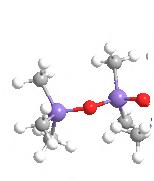
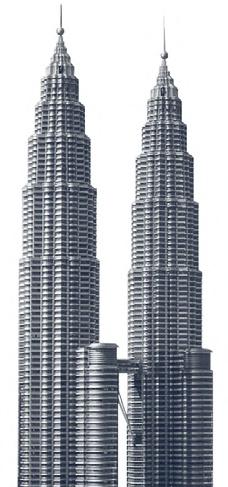
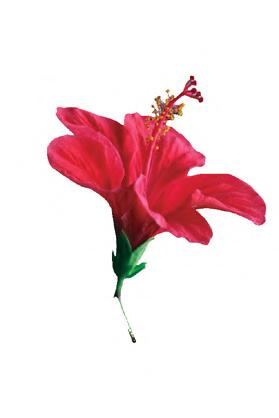
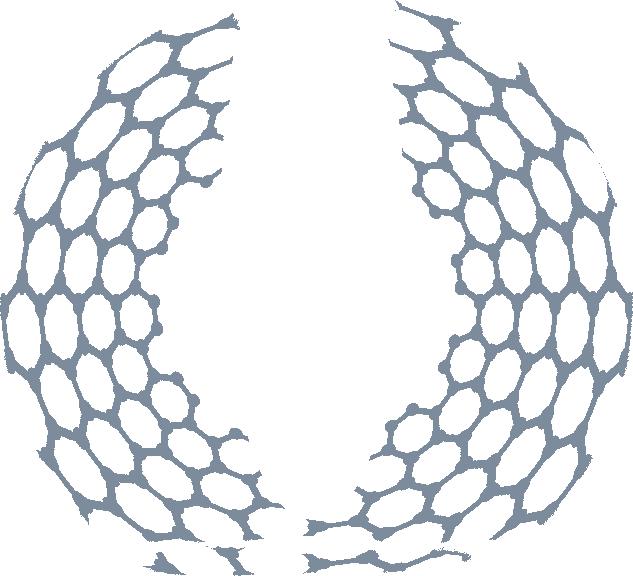
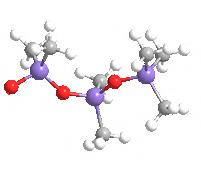






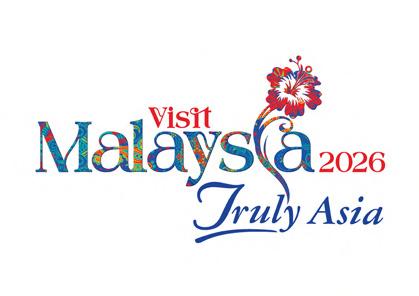

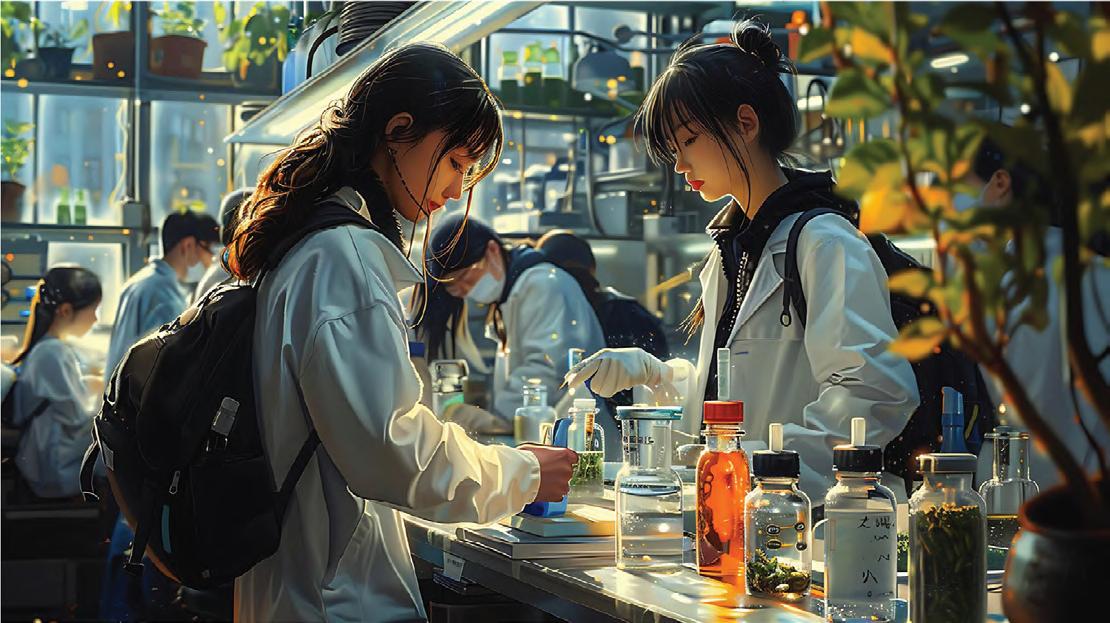
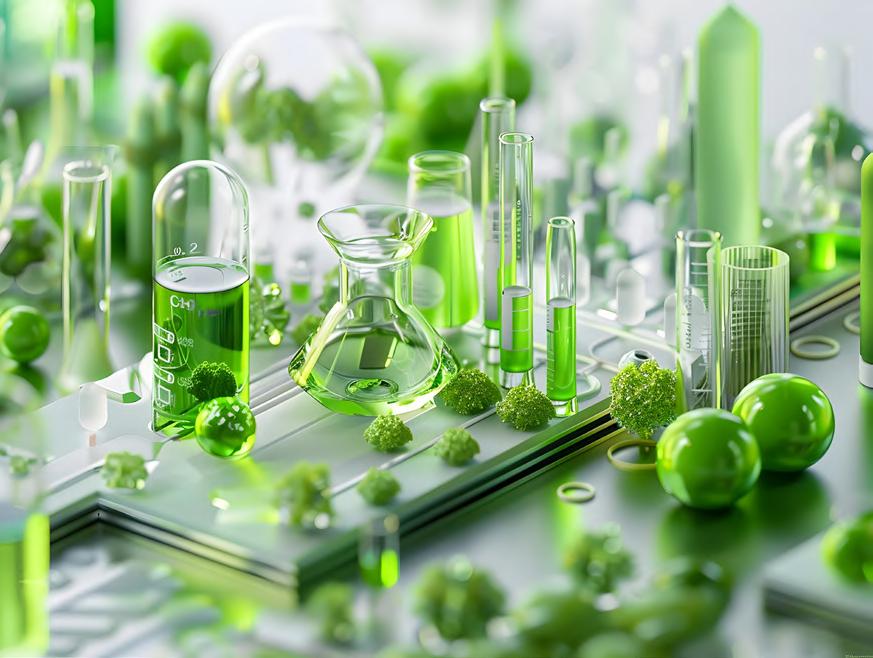
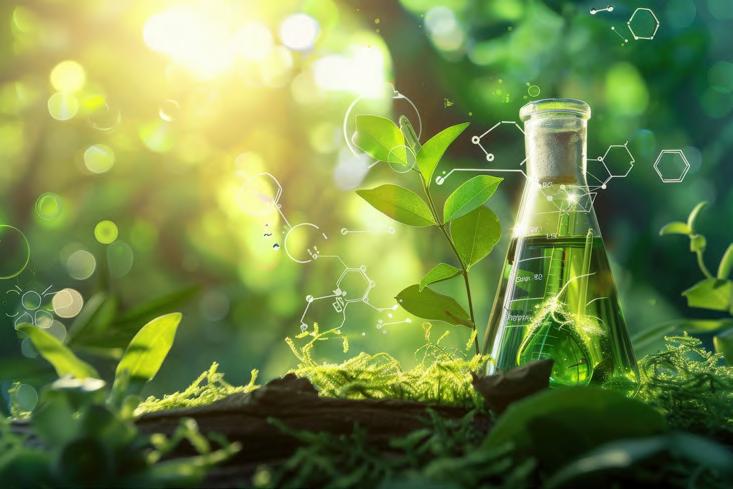
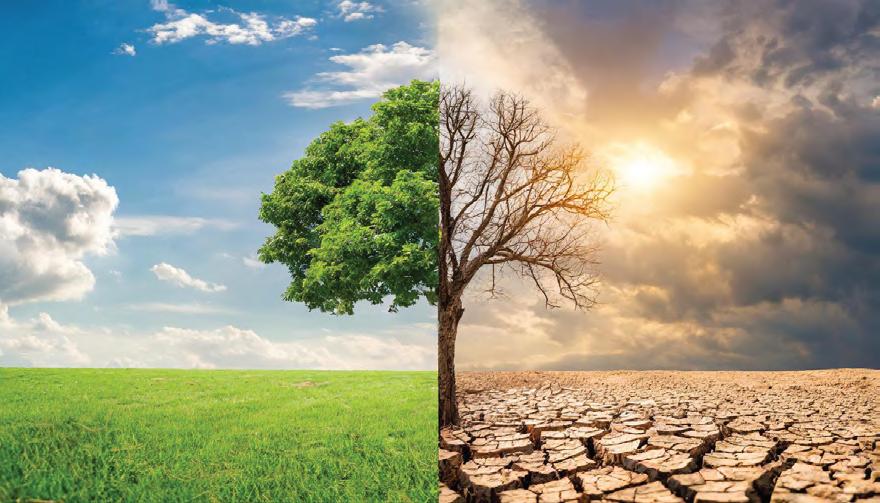
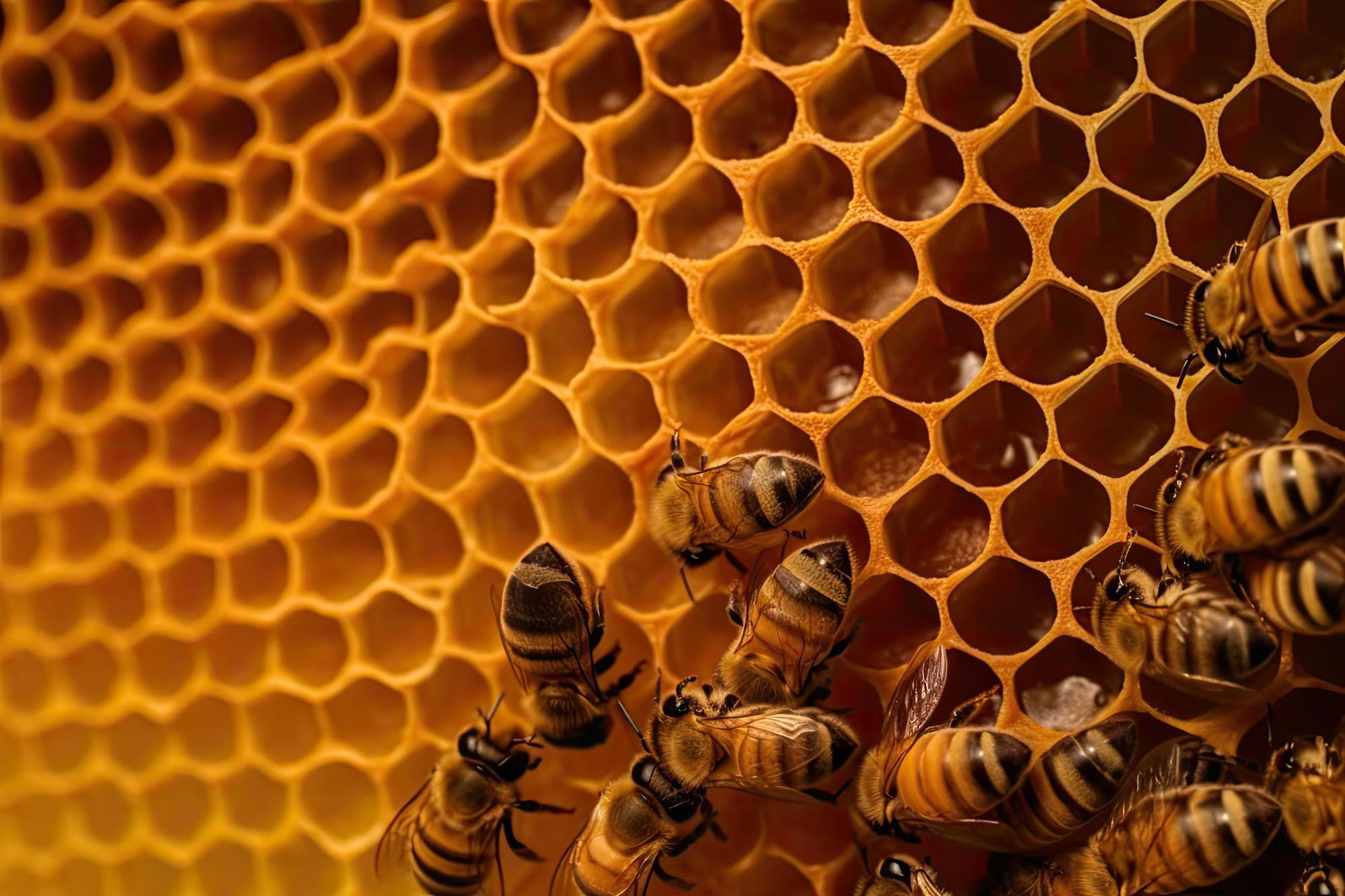
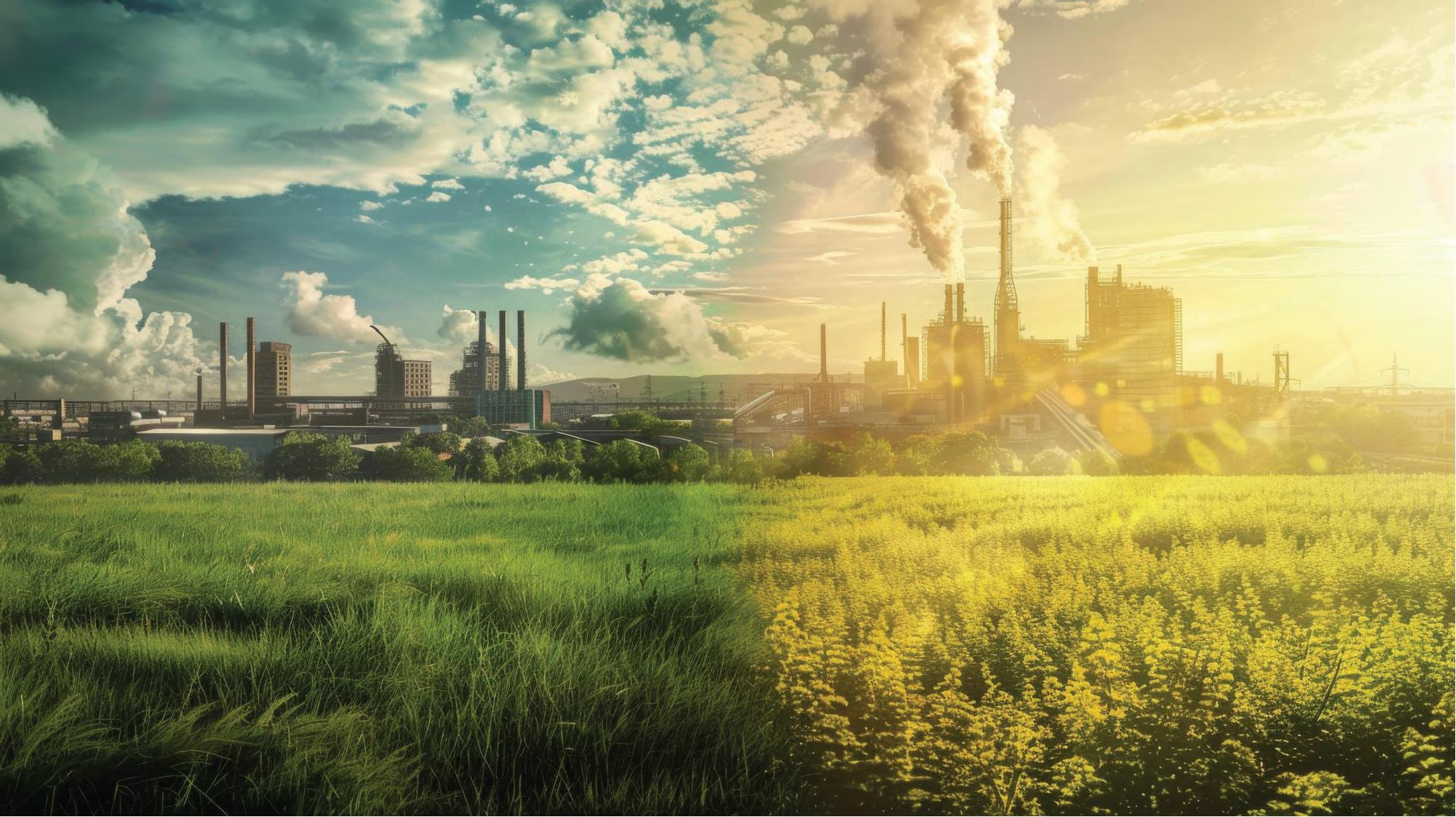
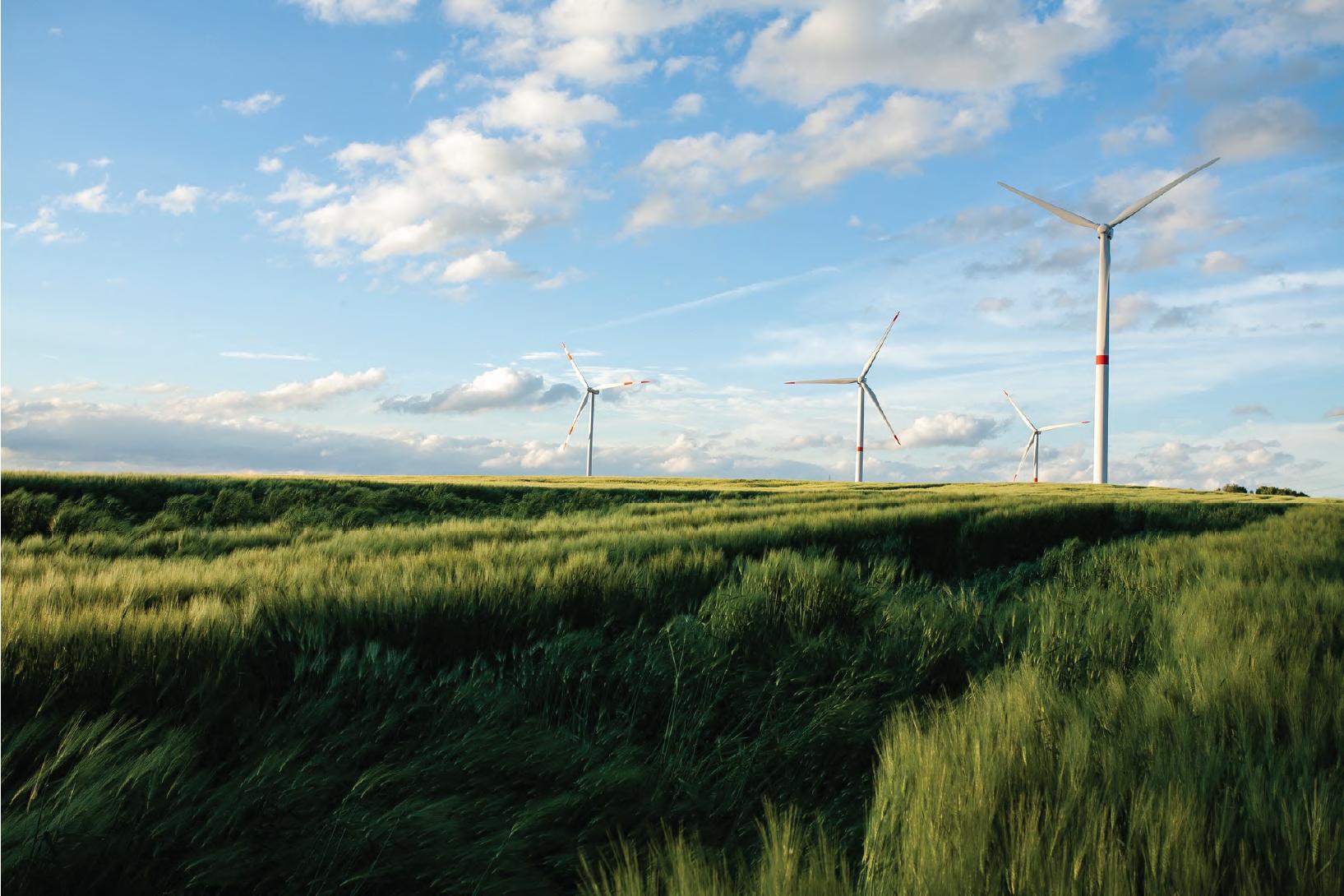

The 50 th World Chemistry Congress (50WCC) and the 53 rd IUPAC General Assembly (53GA) were successfully held at the Kuala Lumpur Convention Centre, Malaysia, marking the first time these flagship IUPAC events were hosted in an ASEAN country. The gathering drew over 3,000 delegates from across the globe (95 countries), reflecting the strong international stature of the congress. The 53 rd General Assembly took place from 12 – 16 July 2025, followed by the 50 th World Chemistry Congress from 14 – 19 July 2025.
Organised by Institut Kimia Malaysia (IKM) under auspices of the International Union of Pure and Applied Chemistry (IUPAC), the congress was themed “Chemistry for Sustainable Future”, underscoring the pivotal role of chemistry in addressing global sustainability challenges. The scientific programme offered a dynamic mix of plenary and keynote lectures, workshops, oral presentations, poster sessions, working group meetings, and special forums. Apa rt from the Pure and Applied Chemistry sessions, the delegates also participated in thematic symposia centred on the United Nations Sustainable Development Goals (SDGs), including Zero Hunger, Good Health, Gender Equality, Clean Water, Affordable and Clean Energy, and Climate Action. These sessions featured leading experts from around the world, fostering knowledge exchange on emerging technologies, ethics in science, chemical safety, and professional responsibility.
Highlights of the event included the PhosAgro/UNESCO/IUPAC/IKM Lecture on green chemistry, delivered by Professor Paul Anastas, well- known as the father of green chemistry; workshops on chemical safety and security, enrichment programmes for young chemists, and open forums for knowledge dissemination. The congress also celebrated scientific excellence through prestigious awards, such as the IUPAC - Soong Prize for Sustainable Chemistry and the Chemistry Europe Awards Lecture, delivered by Professor Stefan Grimme. Plenary lectures spanned diverse topics, from AI in drug discovery and nanomaterial design to biosensors for resource- limited settings, quantum information in chemical systems, innovations in fluorine chemistry, and single- atom catalysis.
The General Assembly featured statutory meetings of the IUPAC Council, Divisions, Standing Committees, and executive bodies, alongside networking events such as the World Chemistry Leadership Meeting (WCLM), Town Hall session, leadership forums, and a joint opening ceremony with the congress that included a prize presentation and welcome reception.
Beyond the scientific sessions, delegates were treated to a vibrant array of social and cultural activities that showcased Malaysia’s unique heritage. The Welcome Reception, held at the Kuala Lumpur Convention Centre, offered participants the chance to network while enjoying traditional Malaysian cuisine and cultural showcases The Gala Dinner, held at the Shangri- la Hotel Kuala Lumpur, was a memorable evening filled with Malaysia Chinese cuisines, live entertainment, and opportunities for international delegates to connect in a relaxed setting and beautiful Malaysian traditional performances.
On behalf of the organis ing committee, heartfelt appreciation is extended to all delegates includ ing plenary, keynote, oral and poster presenters. A big thank you also goes to supporters, partners, sponsors, and exhibitors whose contributions were vital to the success of IUPAC 2025. Special thanks to Malaysia Convention & Exhibition Bureau (MyCEB) for their continuous supports.
The Kuala Lumpur Convention Centre provided a world- class venue, ensuring a memorable experience for all delegates. The warmth and hospitality of Malaysia, combined with the rich diversity of its culture, left lasting impressions on participants.
Looking ahead, it is hoped that the knowledge shared, collaborations forged, and commitments renewed during IUPAC 2025 will drive continued innovation in chemistry and contribute meaningfully to the pursuit of a sustainable future.
Once again, thank you everyone who has contributed to the success of the IUPAC 2025, Kuala Lumpur, Malaysia!

The 53 rd IUPAC General Assembly (53GA) was held from 12 –16 July 2025 at the Kuala Lumpur Convention Centre, Malaysia, in conjunction with the 50 th World Chemistry Congress (50WCC). As the governing body’s biennial gathering, the General Assembly brought together IUPAC’s leadership, division members, standing committees, and national representatives from across the globe to review progress, discuss strategic priorities, and make key decisions guiding the Union’s future.
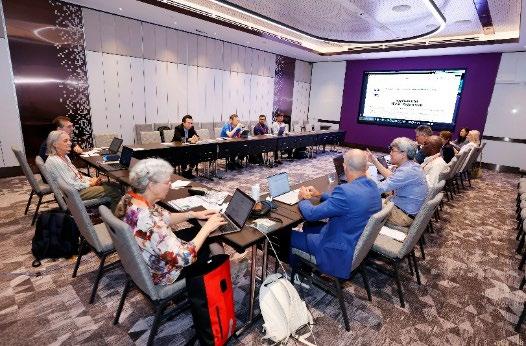


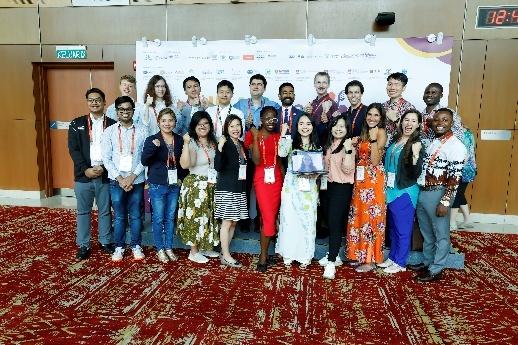
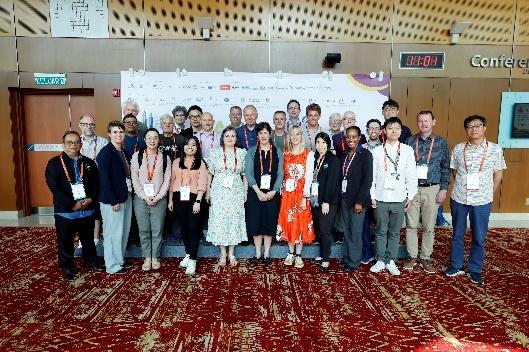
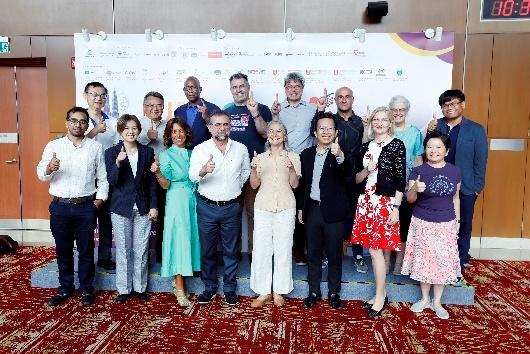
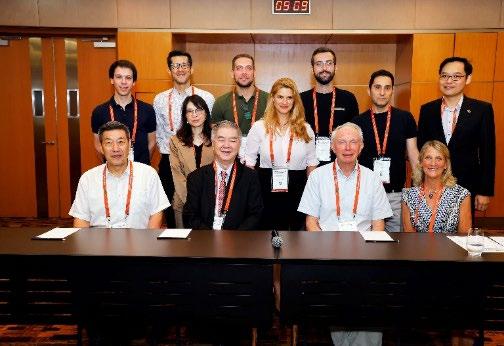
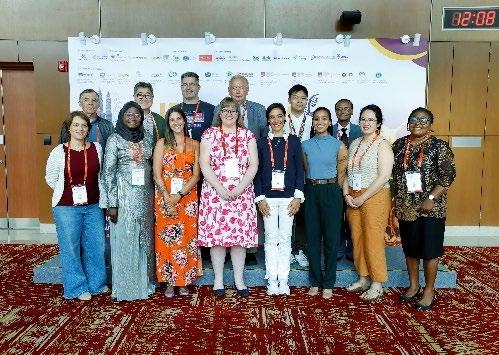
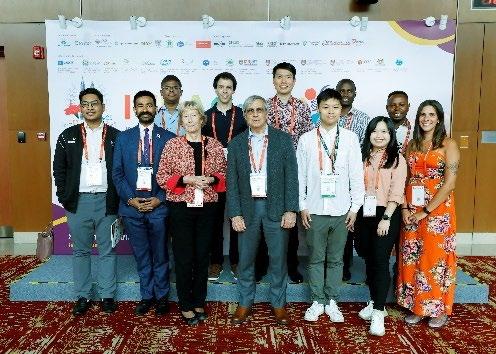
The assembly featured statutory meetings, open forums, and collaborative workshops, providing a platform for scientific governance, policy discussions, and the exchange of ideas between member organizations.
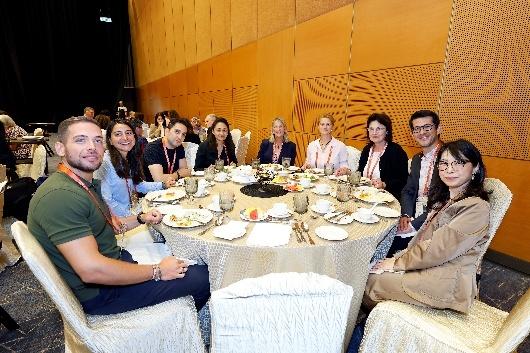
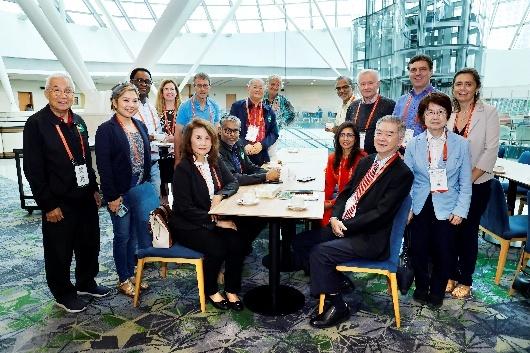

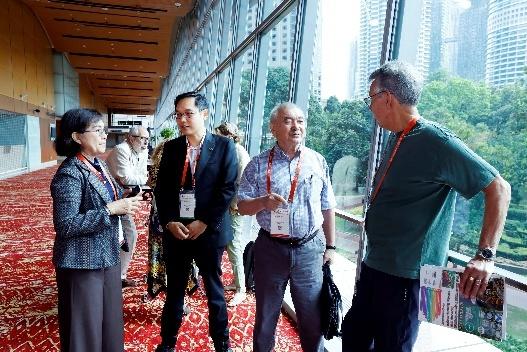
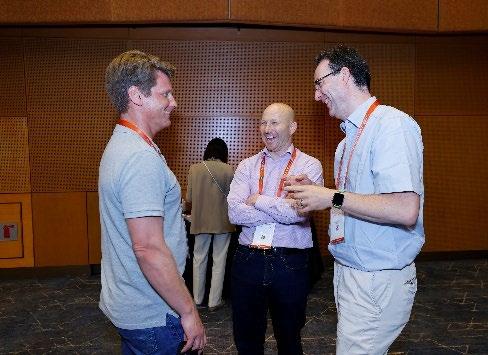


The Highlights included the Council Sessions, where important resolutions were adopted, and the Committee and Division meetings, which advanced projects on nomenclature, chemical data standards, education, and public engagement.
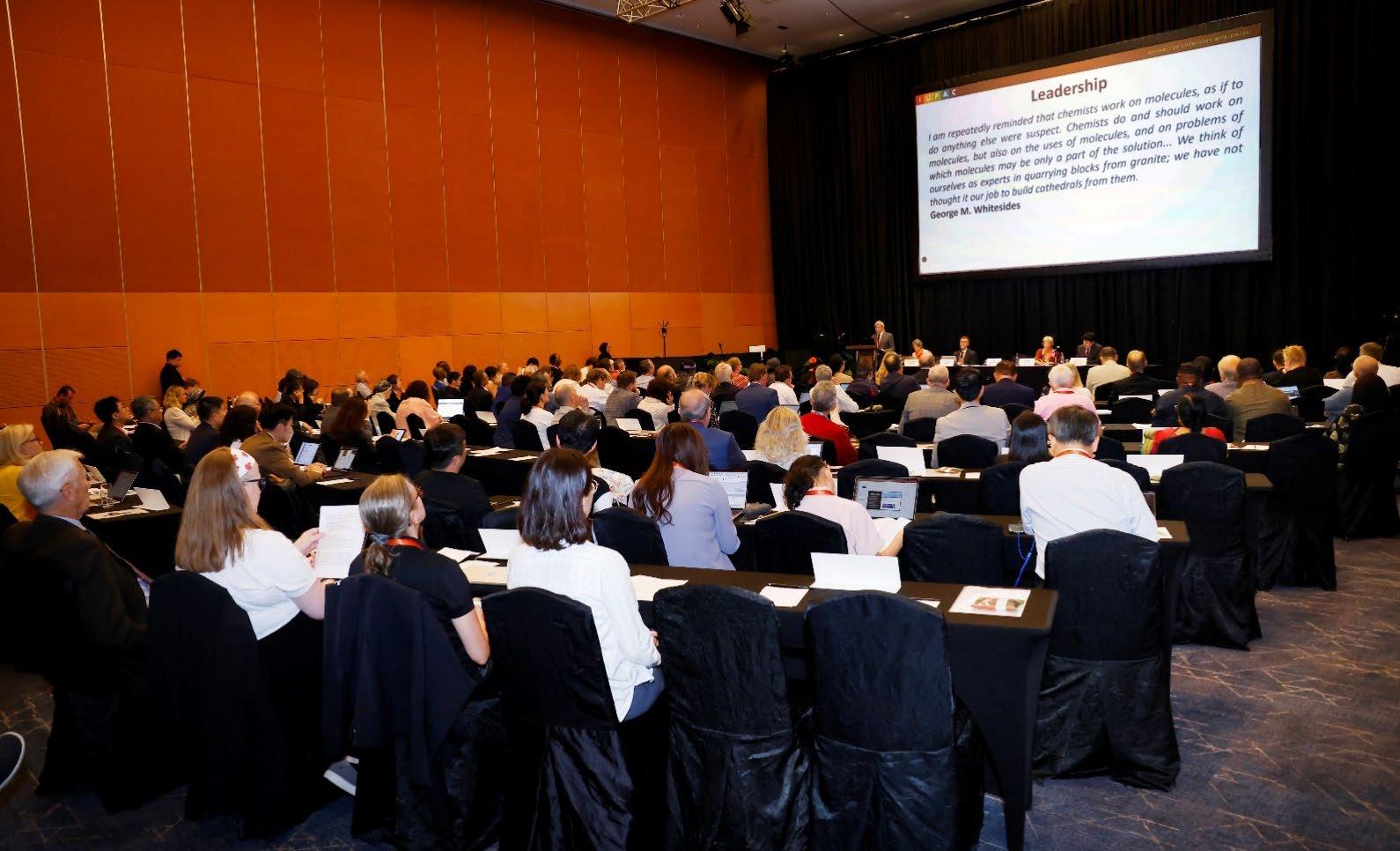
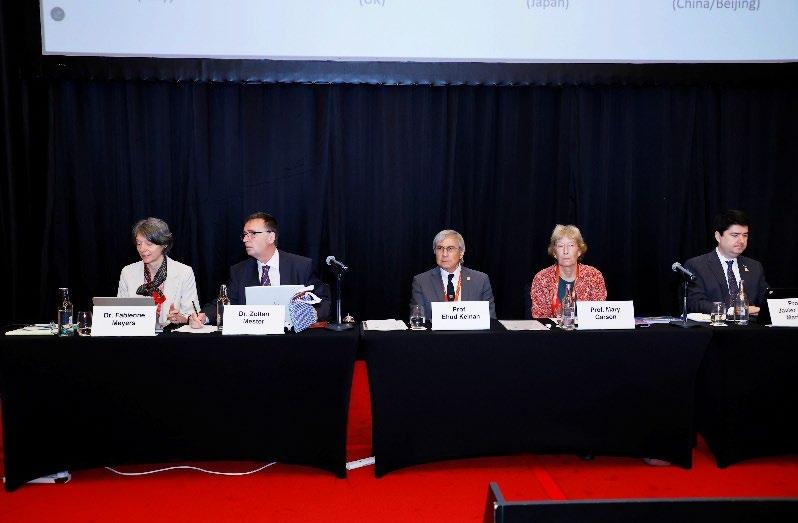
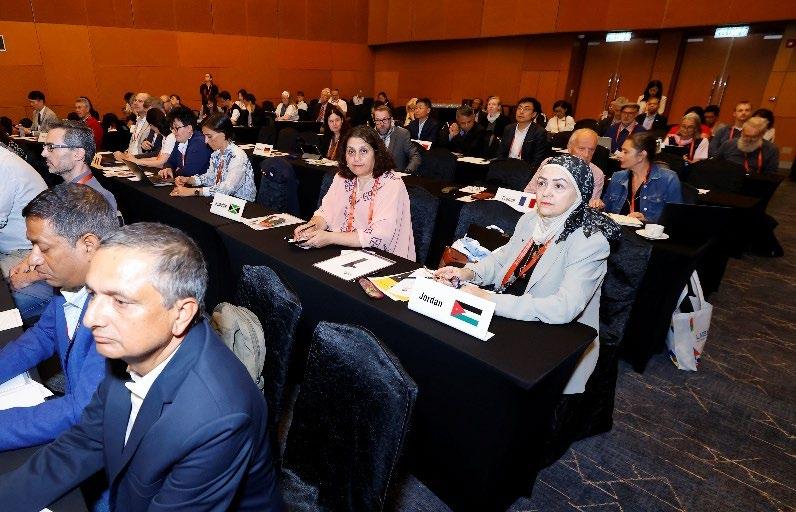
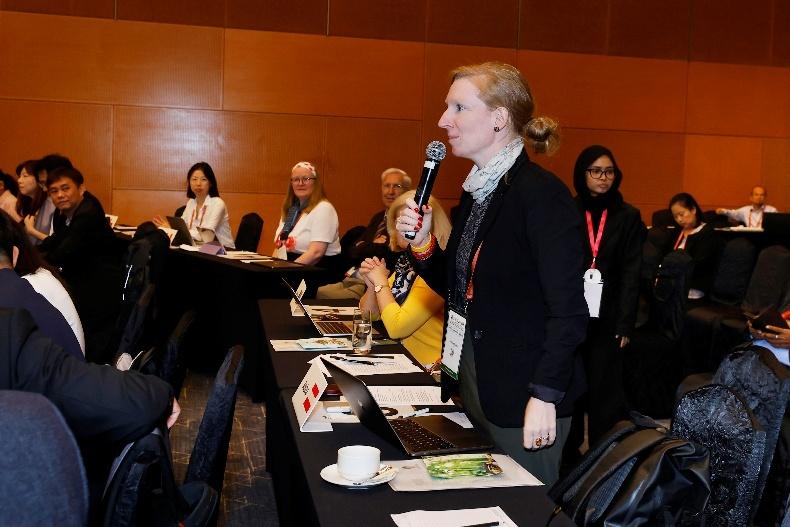
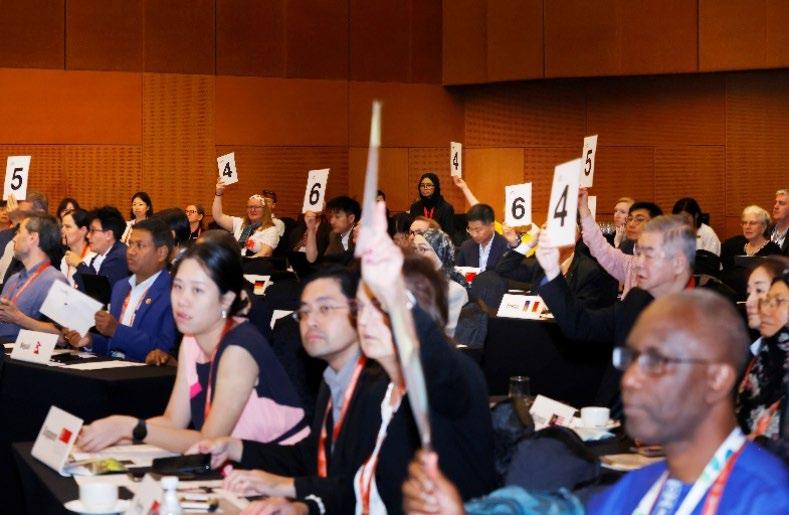

A Town Hall session fostered dialogue between IUPAC leadership and the broader chemistry community, ensuring transparency and inclusivity in decision- making.

The World Chemistry Leadership Meeting bringing together experts from diverse chemical disciplines and cultural backgrounds, the 53GA reinforced IUPAC’s mission to provide objective scientific expertise and foster global collaboration in chemistry, all while aligning its initiatives with the United Nations Sustainable Development Goals (SDGs)

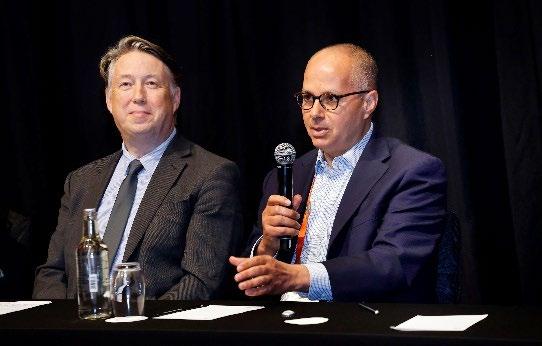
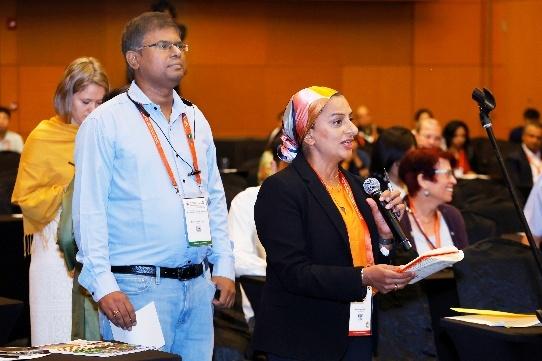
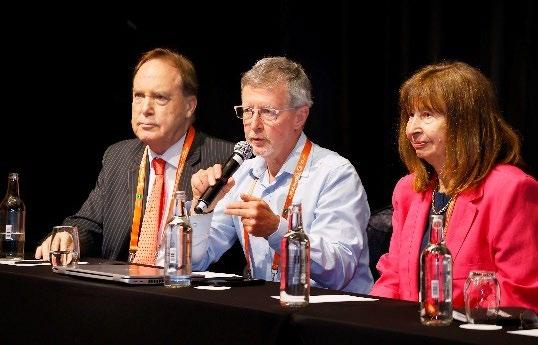
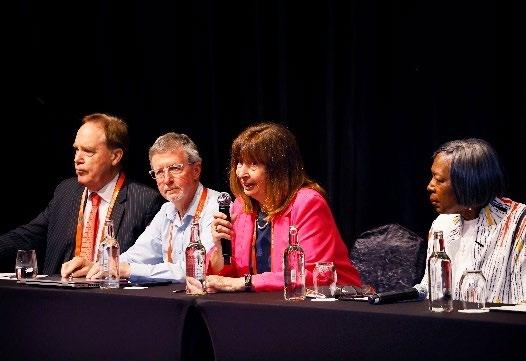
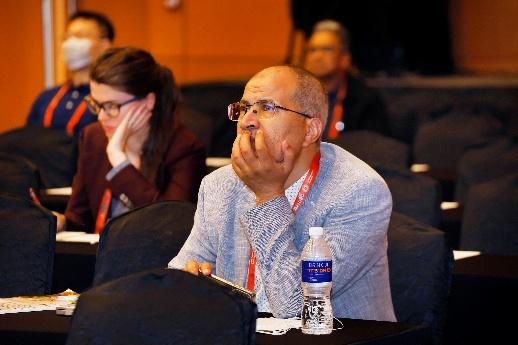

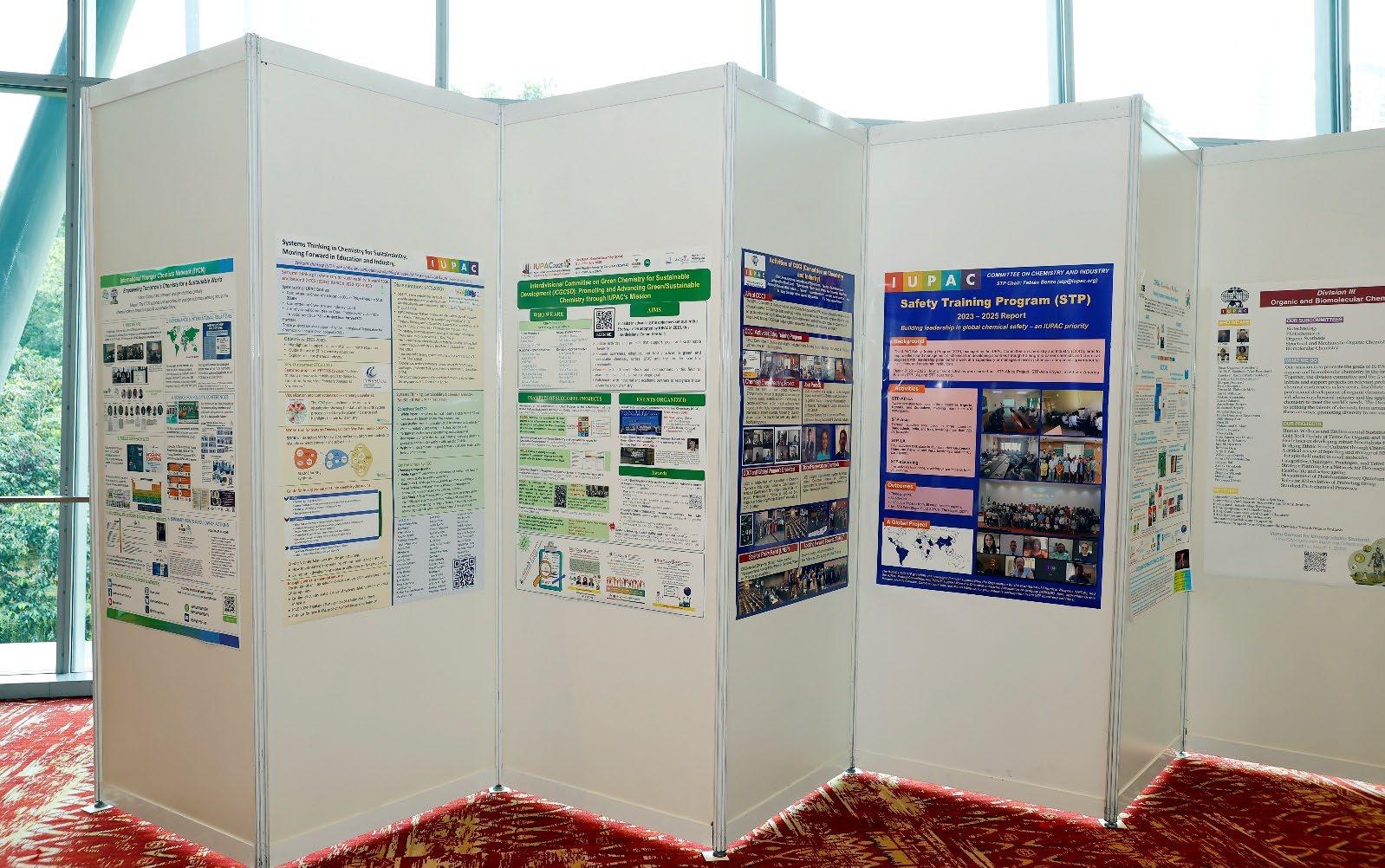
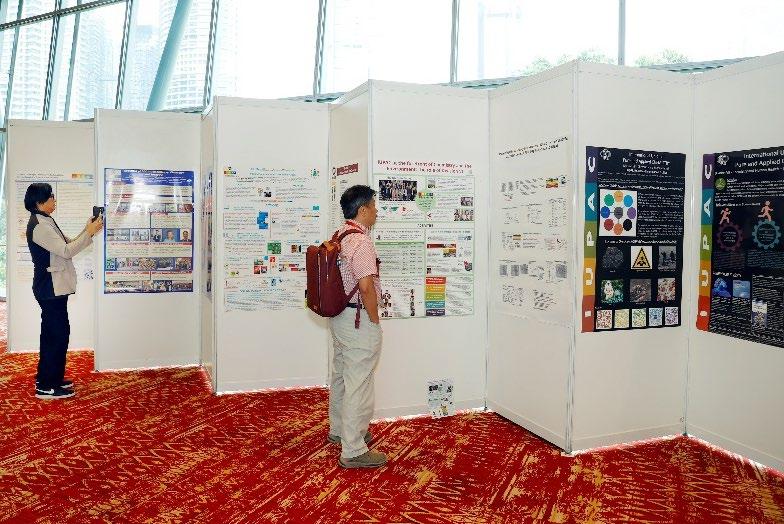
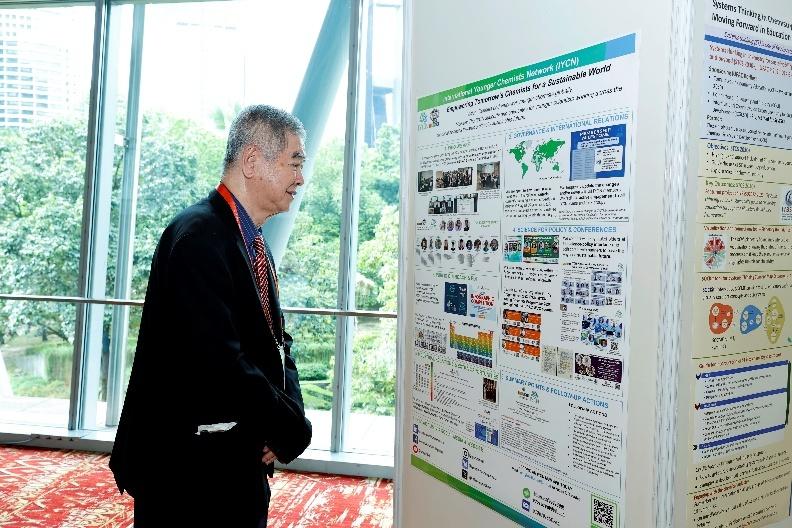
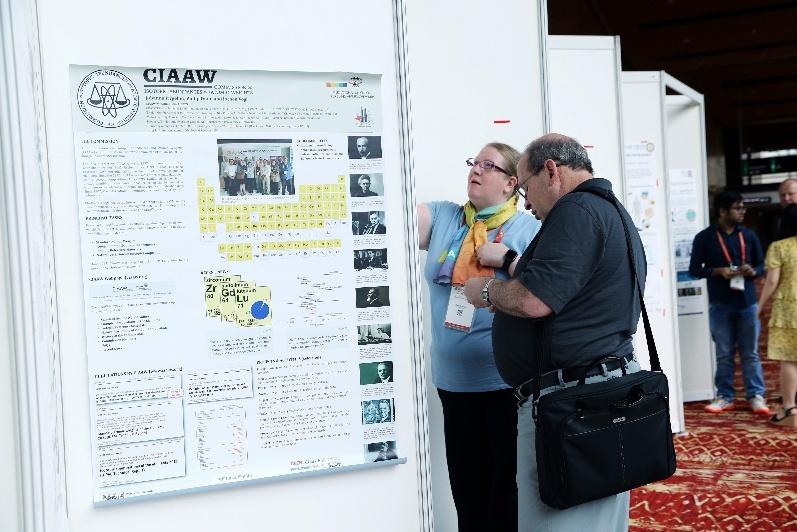
A comprehensive showcase of the innovative works, achievements, and ongoing progress across each IUPAC Division. This presentation highlights the diverse research initiatives, collaborative projects, and scientific contributions that continue to advance the mission of IUPAC in promoting global chemistry excellence.

The Opening Ceremony commenced with a Welcome Speech by Prof Ehud Keinan, President, International Union of Pure and Applied Chemistry (IUPAC). Datuk Dr. Soon Ting Kueh, Organising Chairperson of IUPAC 2025 and President of the Institut Kimia Malaysia (IKM ) presented an Opening Speech. In his speech, Datuk Dr. Soon warmly welcomed delegates from around the world and highlighted the congress theme, “Chemistry for Sustainable Future”, underscoring the pivotal role of chemistry in addressing global challenges and driving progress towards the United Nations Sustainable Development Goals (SDGs).
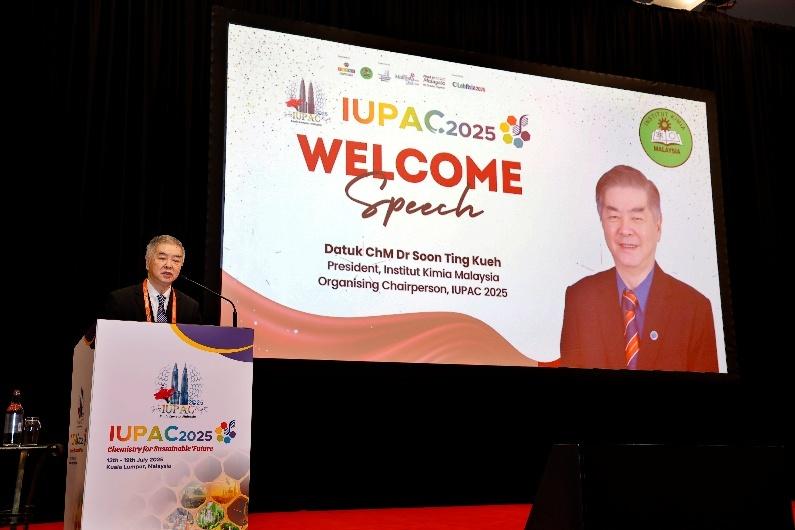
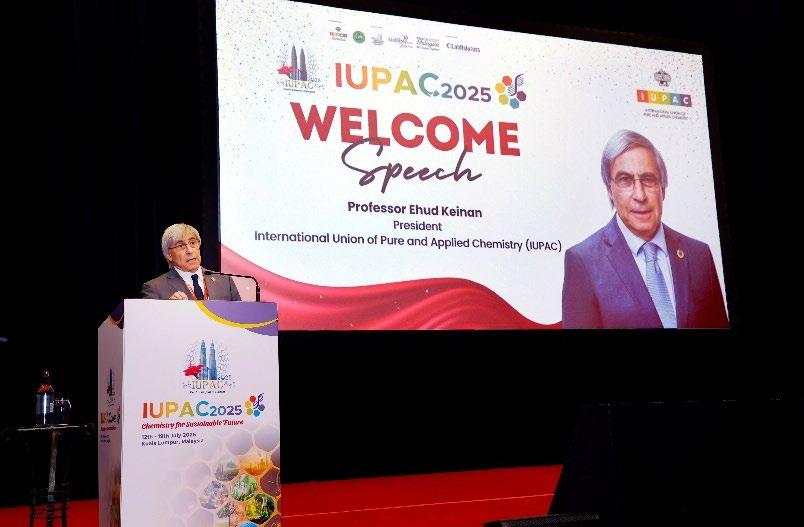
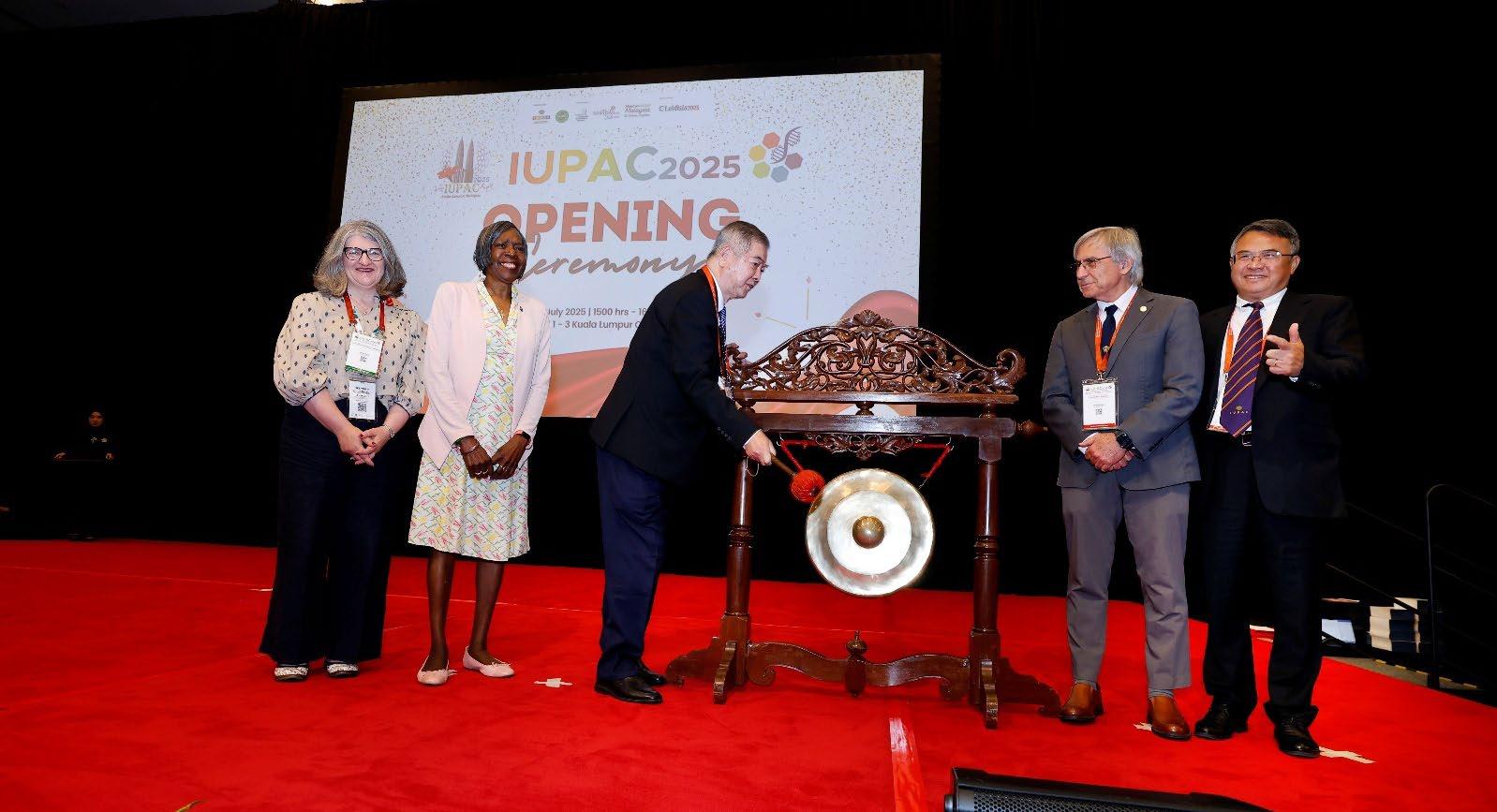
The Congress was officially declared open by Datuk Dr. Soon Ting Kueh, Organising Chairperson of IUPAC 2025, who ceremoniously struck the gong three times, symbolising the commencement of the congress and setting the stage for a week of scientific exchange and collaboration.

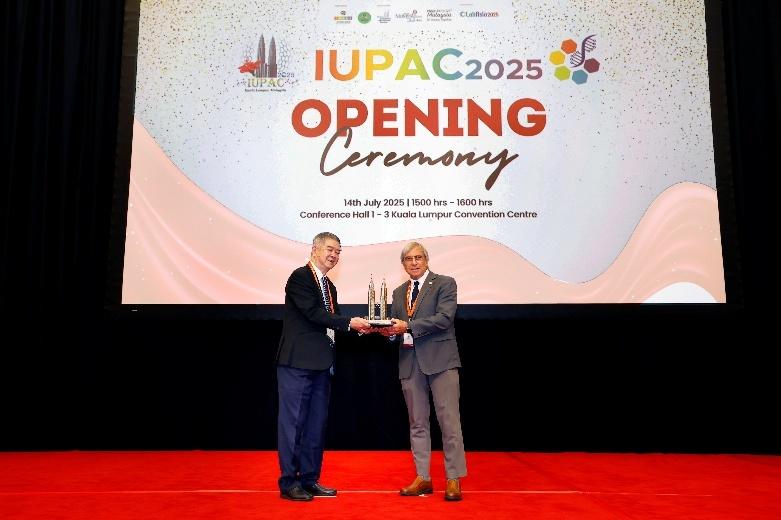
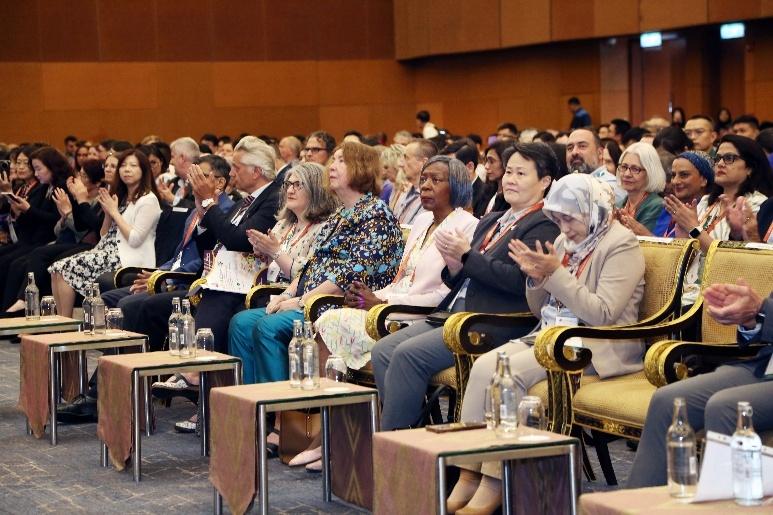
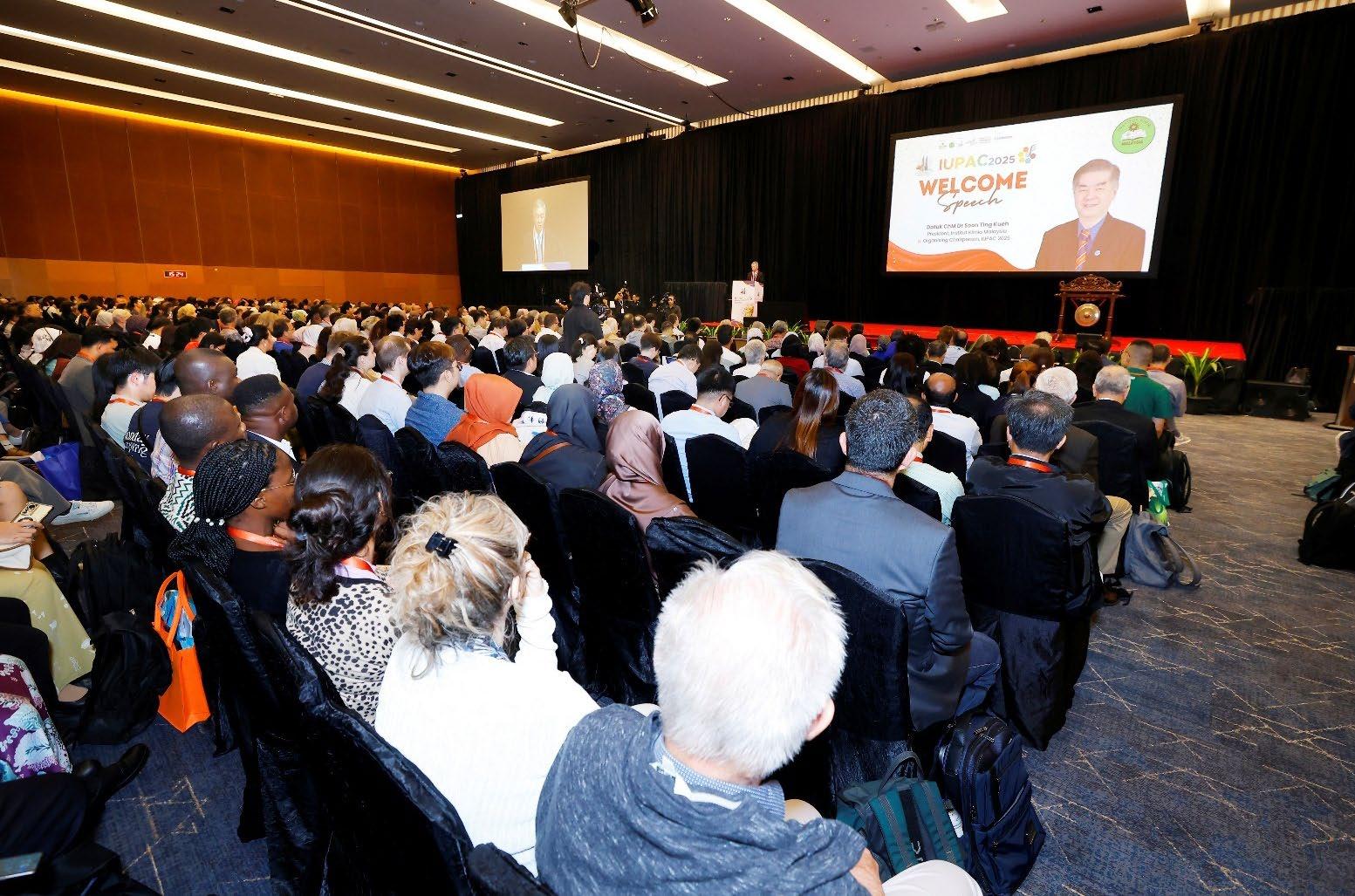
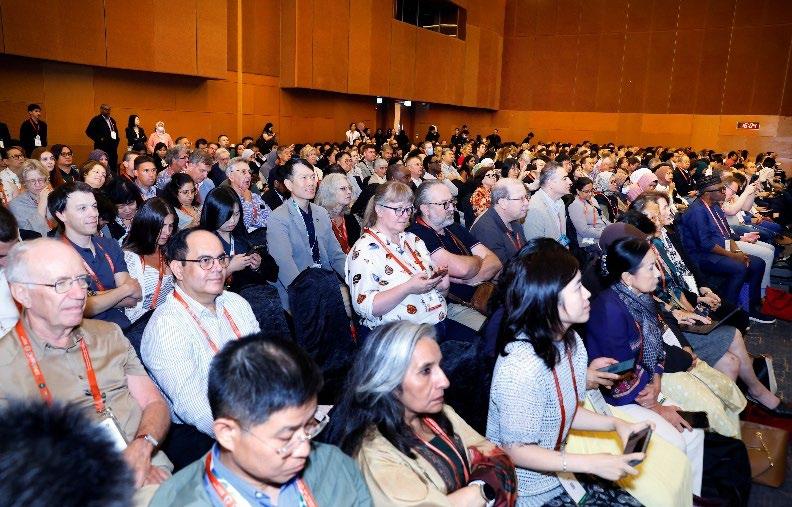
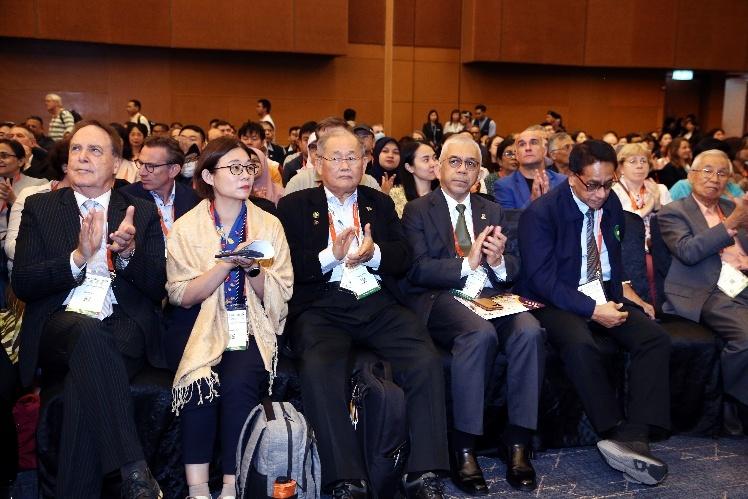
We are indeed proud of the full- house event for the Opening Ceremony.

A series of IUPAC Prize Presentations followed, recognising exceptional achievements in the chemical sciences. Awards presented during the ceremony included:
• 2025 IUPAC Distinguished Women in Chemistry or Chemical Engineering
• 2024 and 2025 IUPAC–Solvay International Award for Young Chemists
• IUPAC 2025 Zhejiang NHU International Award for Advancements in Green Chemistry
These honours celebrated excellence in research, innovation, and leadership, while reinforcing IUPAC’s commitment to diversity, sustainability, and the advancement of chemistry worldwide.
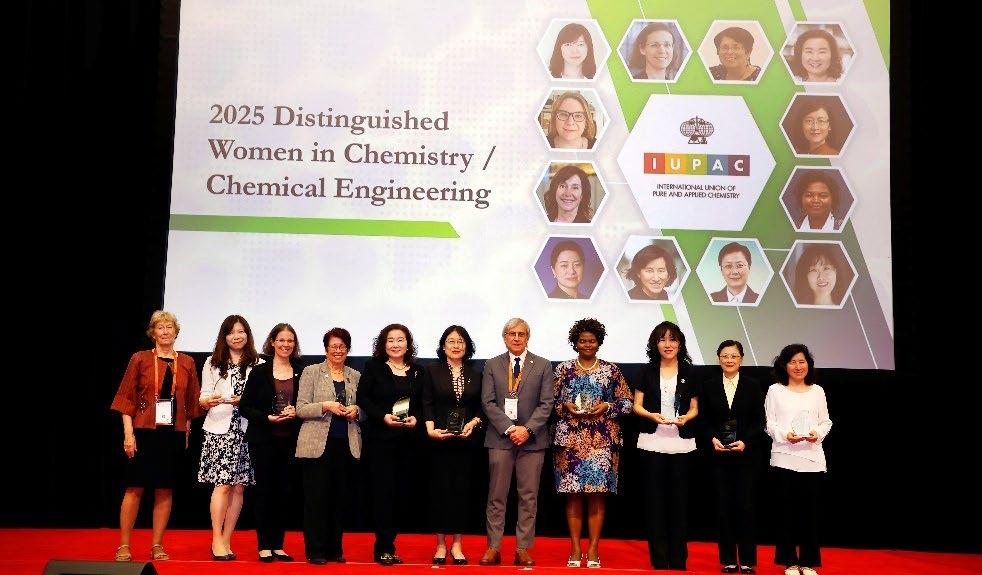
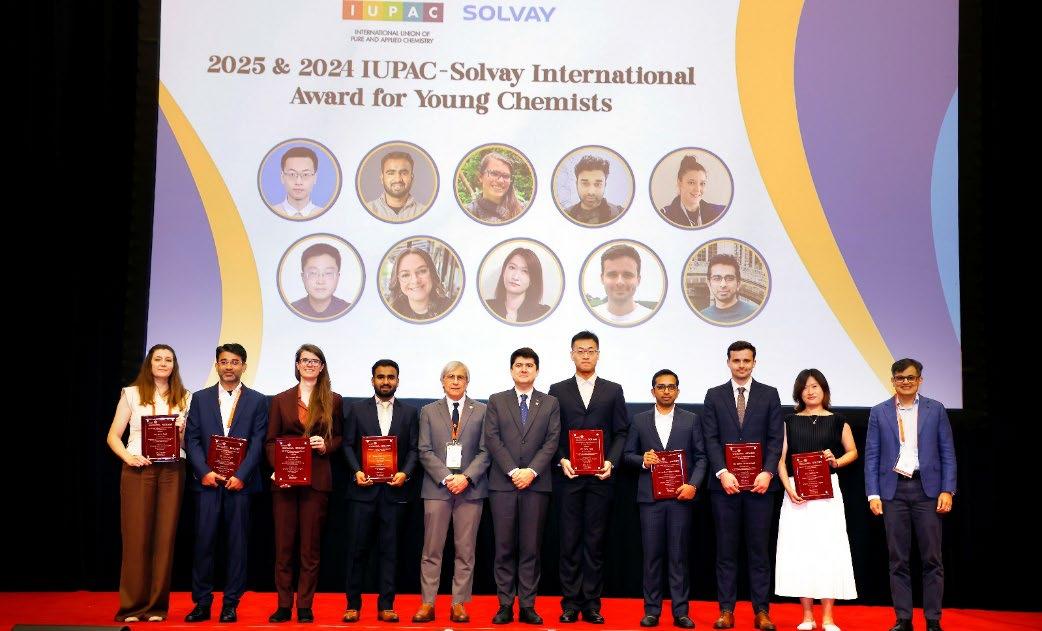
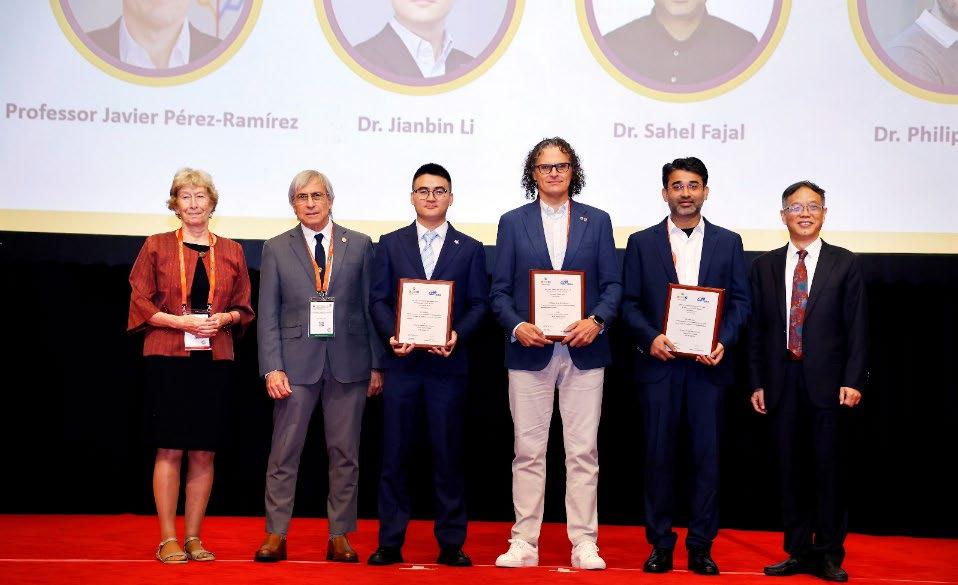

The Welcome Reception was held on the evening of 14 July 2025, immediately following the Opening Ceremony, in the picturesque Grand Ballroom of the Kuala Lumpur Convention Centre. This elegant gathering offered delegates the chance to unwind and network in a relaxed atmosphere while being introduced to the vibrant cultural heritage of Malaysia.
As guests arrived, they were greeted by the melodious strains of the gamelan, the traditional Malay orchestra (“The Gamelan”), creating an inviting and festive ambience. The evening’s highlight was a captivating series of cultural performances, showcasing the diversity and richness of Malaysia’s traditions.
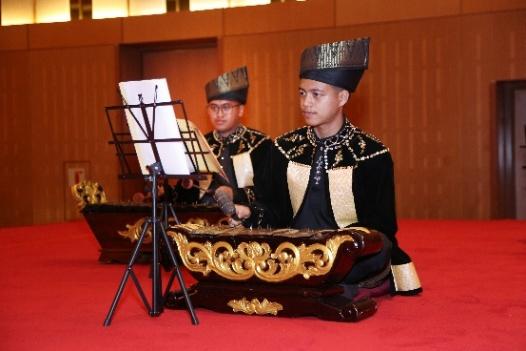
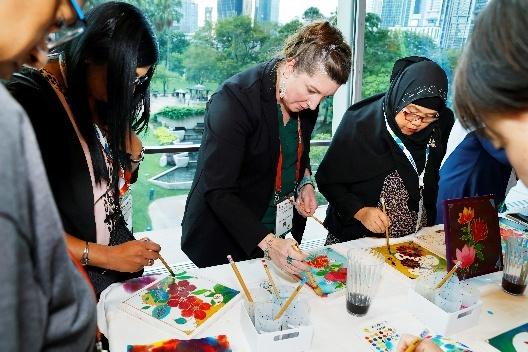
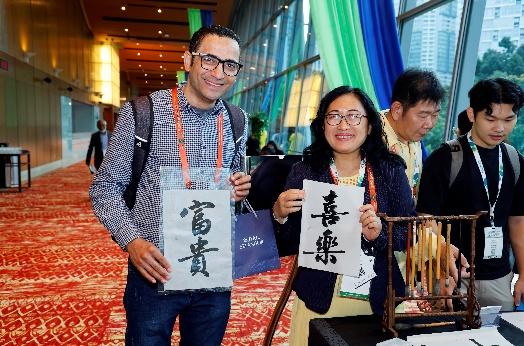
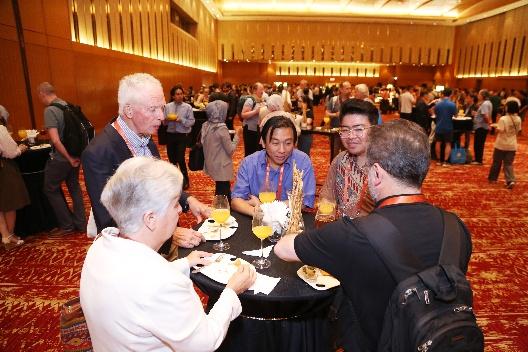
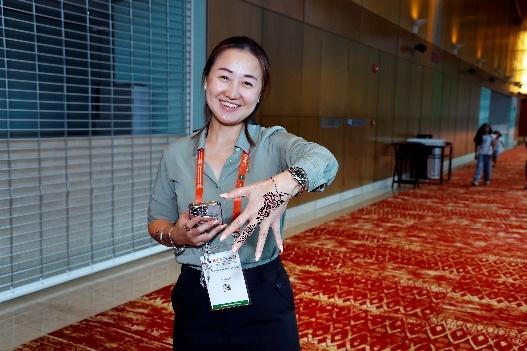
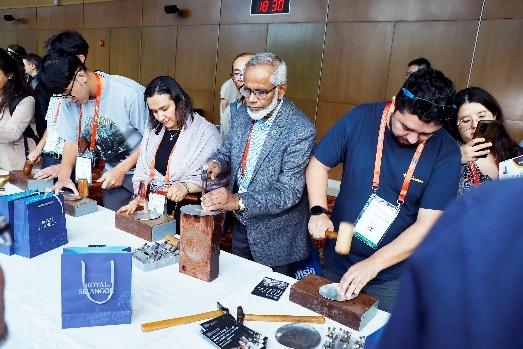
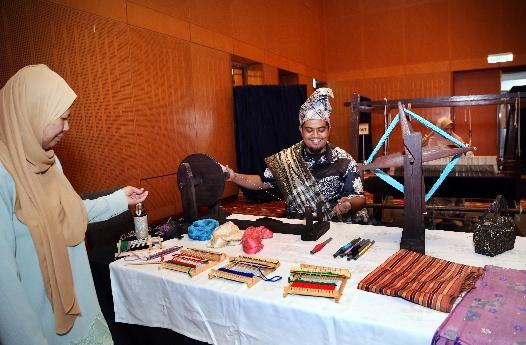
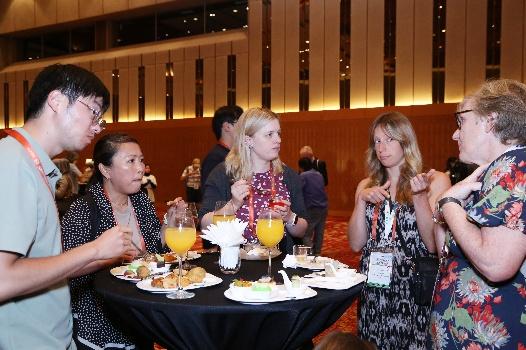
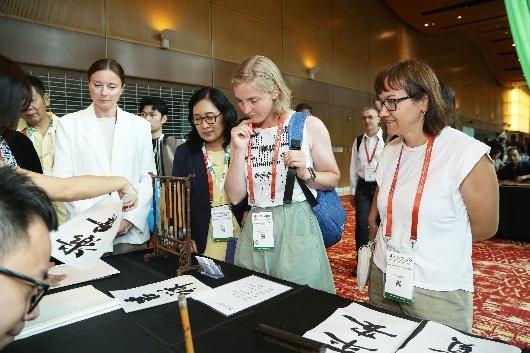
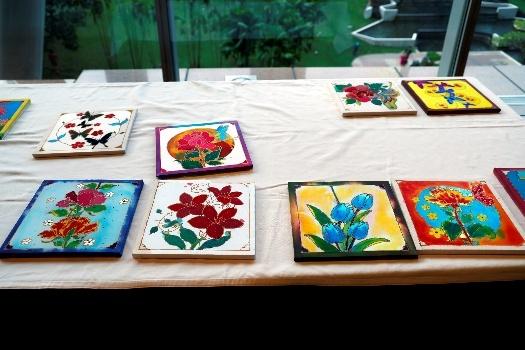
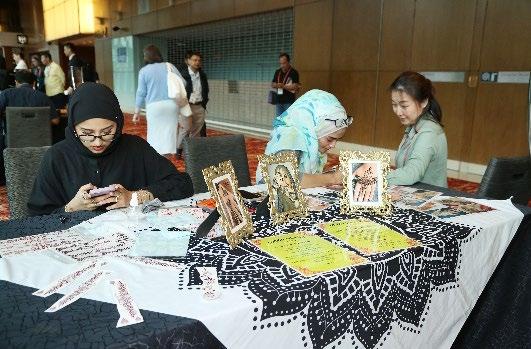
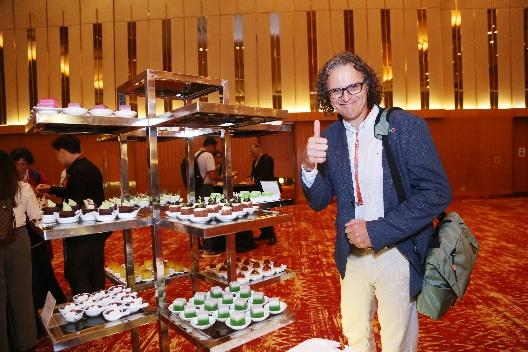
An impressive array of local delicacies was served, allowing delegates to savour the distinctive flavours of Malaysian cuisine. The reception proved to be an excellent platform for participants from around the world to connect, exchange ideas, and foster n ew relationships in a warm and welcoming setting. The combination of cultural immersion, culinary delights, and genuine hospitality made for a memorable evening, setting the tone for an enriching and collaborative congress ahead.

The congress featured a robust and diverse scientific agenda . Expert speakers from around the world shared advancements on emerging technologies, professional ethics, gender equity, chemical safety, and responsible practices in chemistry.
The congress covers a wide range of topics as follows:
CLUSTER I – PURE & APPLIED CHEMISTRY SYMPOSIUMS
Physical & Biophysical
Inorganic & Bioinorganic
Organic & Biomolecular
Polymer & Materials
Analytical & Forensic
Environmental
Cheminformatics
Human Health & Well Being
Education & Public Understanding
Green Chemistry
CLUSTER II – CHEMISTRY & SDGs
SDG2: Zero Hunger [Agriculture & Food Chemistry]
SDG3: Good Health & Well Being [Natural Products & Medicinal Chemistry]
SDG5: Gender Equality [Ethics, Diversity and Inclusion in Science Education]
SDG6: Clean Water & Sanitation [Water & Wastewater Management]
SDG7: Affordable & Clean Energy [Renewable & Low- cost Energy]
SDG13: Climate Action [Sustainable & Green Chemistry]
CLUSTER III – THEMATIC SESSION
Artificial Intelligence in Chemistry
Young Ambassador for Chemistry (YAC) Programme on Chemistry in Everyday Life
Green Chemistry in Education
Symposium on Chemical Safety and Security
Invest Sarawak
Malaysian Rubber Board (MRB) Celebrating 100 Years of Excellence in Rubber and Latex Sciences
Professional and Responsible Practices in Chemistry Including Responsible Care
PhosAgro/UNESCO/IUPAC Symposium on Green Chemistry: Experience and Opportunities for Cooperation for Sustainable Future
American Chemical Society (ACS) on Campus
The Royal Society of Chemistry (RSC) Forum on Open Knowledge Dissemination
International Younger Chemists Network (IYCN) / Malaysian Young Chemists Network (MYCN) - Young Chemist Programme

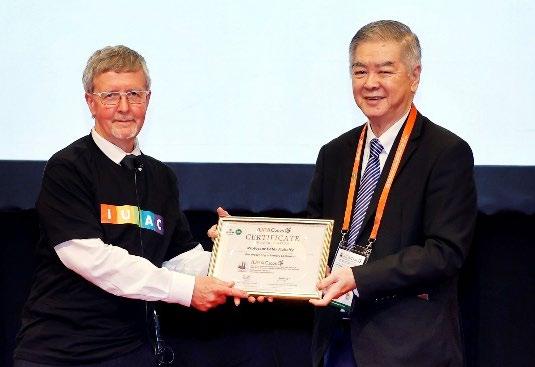
Plenary 1 (14 July 2025):
Prof Dr Peter Mahaffy, King's University, Canada
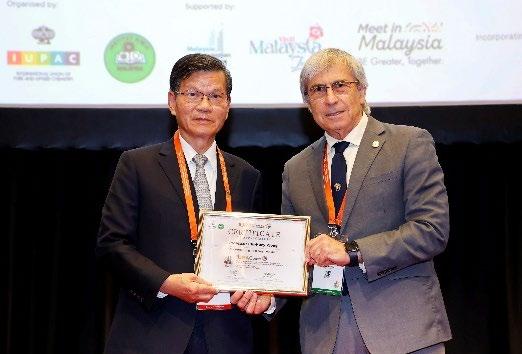
Plenary 4 (15 July 2025):
Prof Dr Chi - Huey Wong, Scripps Research Institute, United States
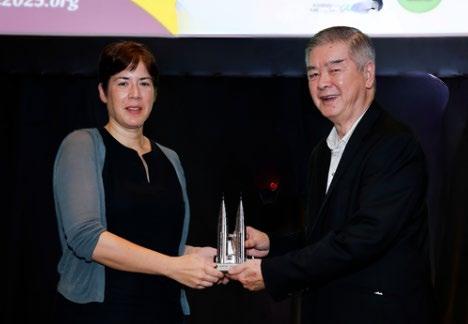
Plenary 7 (17 July 2025):
Prof Dr Christine Luscombe , Okinawa Institute of Science and Technology, Japan
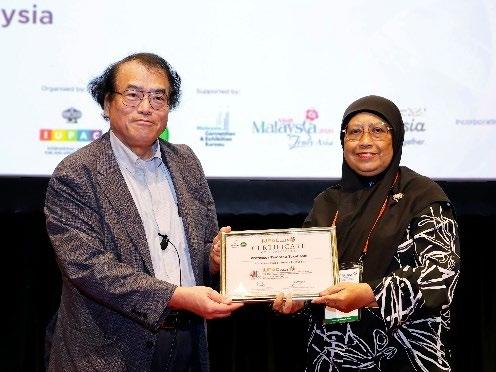
Plenary 10 (18 July 2025):
Prof Dr Tamotsu Takahashi , Hokkaido University, Japan
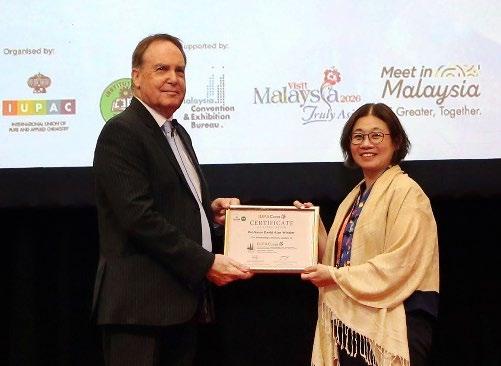
Plenary 2 (14 July 2025):
Prof Dr David Winkler, La Trobe University, Australia

Plenary 5 (16 July 2025):
Prof Dr Zhaomin Hou, RIKEN Center for Sustainable Resource Science, Japan
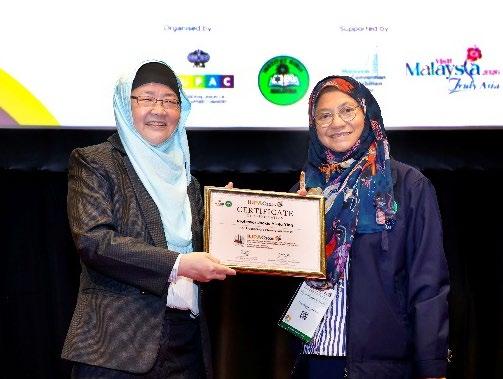
Plenary 8 (17 July 2025):
Prof Dr Jackie Yi - Ru Ying, King Faisal Specialist Hospital & Research Centre, Saudi Arabia
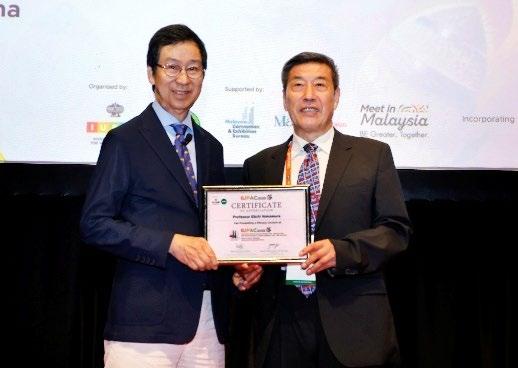
Plenary 11 (19 July 2025):
Prof Dr Eiichi Nakamura, The University of Tokyo & Nankai University, China, China
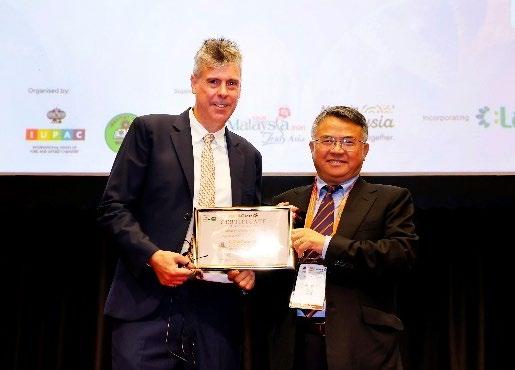
Plenary 3 (15 July 2025):
Prof Dr Gregory Scholes, Princeton University, United States
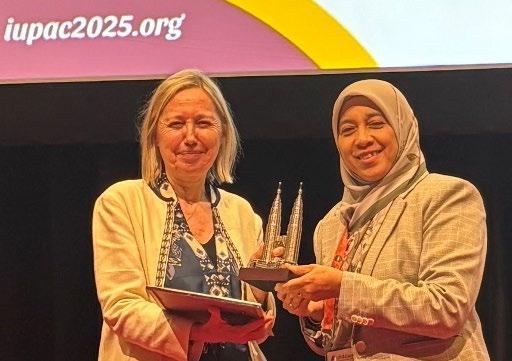
Plenary 6 (16 July 2025):
Prof Dr Veronique Gouverneur , University of Oxford, United Kingdom
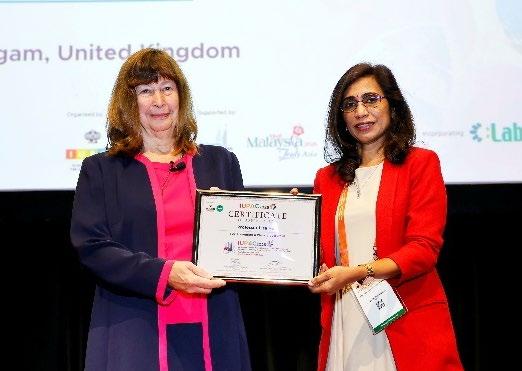
Plenary 9 (18 July 2025):
Prof Dr Lisa Hall, University of Cambridge, United Kingdom
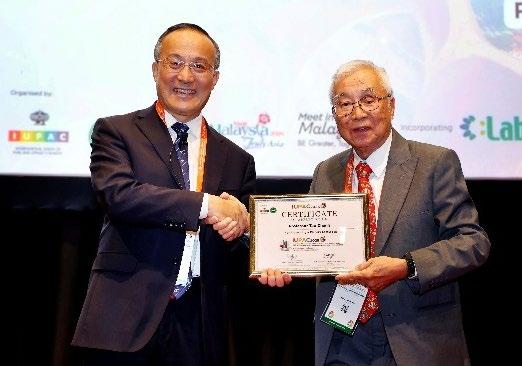
Plenary 12 (19 July 2025):
Prof Dr Zhang Tao, Chinese Academy of Sciences, China

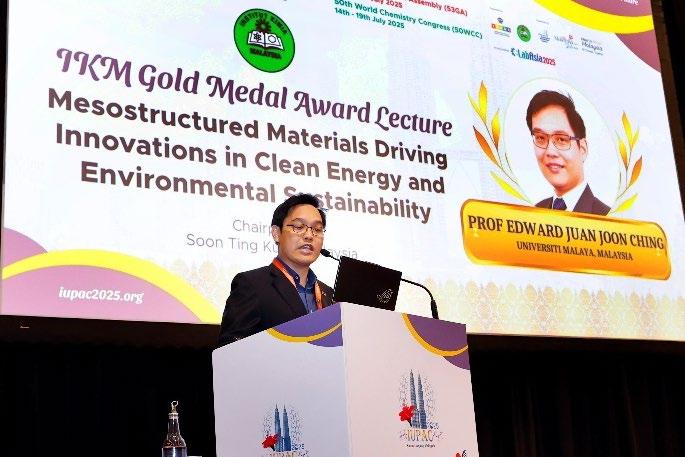
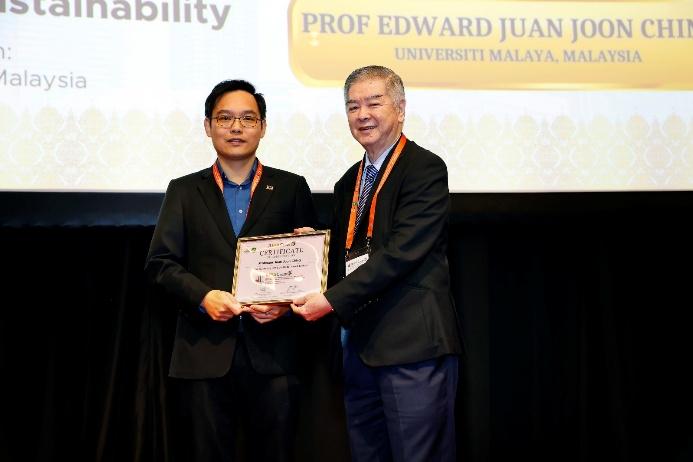
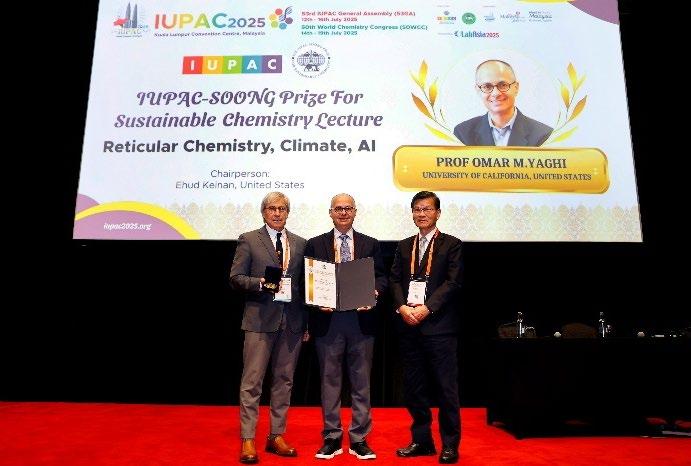
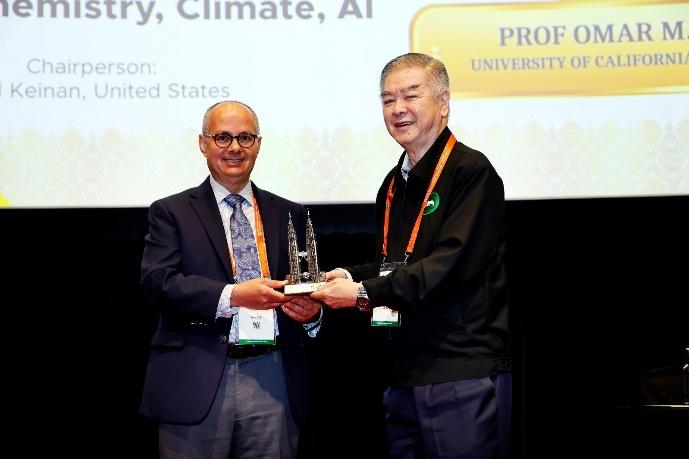

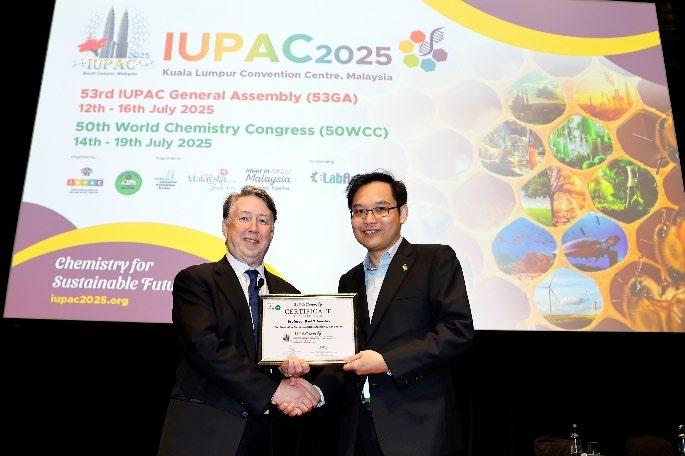
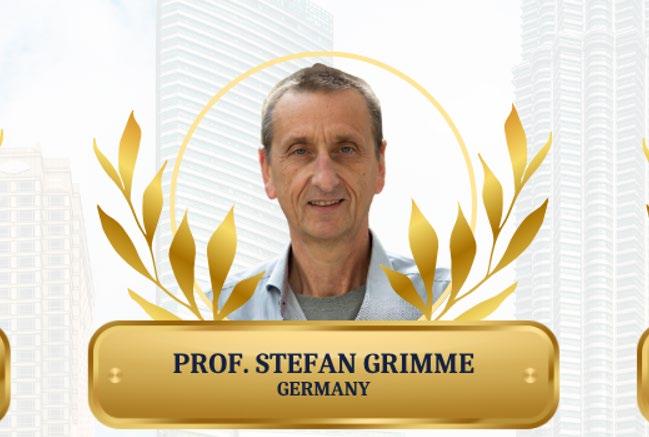
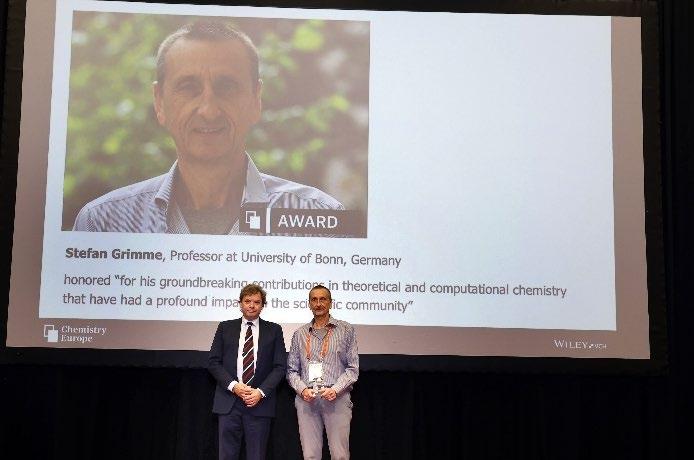

A total of 93 Keynote Lectures from all around the world presenting their researches and collaborations.
1. Prof Dr Adam Lee, Griffith University, Australia
2. Dr Aik Hwee Eng, K&W Training & Consulting, Cordon
3. Prof Dr Ananikov Valentine, Zelinsky Institute of Organic Chemistry, Russian Academy of Sciences, Russian Federation
4. Prof Dr Antonio Patti, Monash University, Australia
5. Prof Dr Atsushi Kajiwara, Nara University of Education, Japan
6. Prof Dr Aura Tintaru, Aix -Marseille University, France
7. Dr Aurelia Sorina Visa, Coriolan Dragulescu Institute of Chemistry, Romania
8. Prof Dr Bin Ren, Xiamen University, China
9. Prof Dr Brynn Hibbert, University of New South Wales, Australia
10. Prof Dr Carol Sze Ki Lin, City University of Hong Kong, Hong Kong, China
11. Dr Chan Kok Meng, Petroliam Nasional Berhad (PETRONAS), Malaysia
12. Dr Chee Sian Gan, Agilent Technologies, Singapore
13. Dr Christine Straut Langlinais, Sandia National Laboratories, United States
14. Mr Christopher John Biai, Kementerian Pertanian dan Keterjaminan Makanan, Malaysia
15. Dr Elizabeth Philip, Forest Research Institute Malaysia (FRIMGHG Reporting), Malaysia
16. Prof Dr Emily Parker, Victoria University of Wellington, New Zealand
17. Prof Dr Evelina Colacino, Institut Charles Gerhardt Montpellier (ICGM), France
18. Assoc Prof Dr Felix Ho, Uppsala University, Sweden
19. Prof Dr Frances Separovic, University of Melbourne, Australia
20. Prof Dr Francesca Kerton, Memorial University of Newfoundland, Canada
21. Asst Prof Dr Fun Man Fung, University College Dublin, Ireland
22. Prof Dr Gabriele Centi, University of Messina, Italy
23. Prof Dr Gang Fu, Xiamen University, China
24. Prof Dr Heike Knicker, Instituto de la Grasa, Consejo Superior de Investigaciones Científicas IG-CSIC, Spain
25. Prof Dr Hongmei Li, National Institute of Metrology, China
26. Prof Dr Hongqi Sun, The University of Western Australia, Australia
27. Assoc Prof Dr Hwei Voon Lee, Universiti Malaya, Malaysia
28. Prof Dr Ian Cousins, Stockholm University, Sweden
29. Prof Dato' Dr Ibrahim Jantan, Universiti Kebangsaan Malaysia, Malaysia
30. Prof Dr Igor Lacik, Polymer Institute of the Slovak Academy of Sciences, Slovakia
31. Assoc Prof Dr Jaafar Abdullah, Universiti Putra Malaysia, Malaysia
32. Prof Dr Javier Pérez -Ramírez, ETH Zurich, Switzerland
33. Prof Dr Jian-Feng Li, Xiamen University, China
34. Prof Dr Jinlong Gong, Tianjin University, China
35. Prof Dr Jitladda Sakdapipanich, Mahidol University, Thailand
36. Prof Dr Joel Ager, Lawrence Berkeley National Laboratory, United States
37. Prof Dr John Wang, National University of Singapore, Singapore
38. Prof Dr Juan Joon Ching, Universitii Malaya, Malaysia
39. Prof Dr Junwang Tang, Tsinghua University, China
40. Prof Dr Karen Wilson, Griffith University, Australia
41. Prof Dr Kumar Sudesh, Universiti Sains Malaysia, Malaysia
42. Assoc Prof Dr Laura Russo, University of Milano-Bicocca, Italy
43. Prof Dr Lidia Armelao, University of Padova, Italy
44. Prof Dr Liming Dai, University of New South Wales, Australia
45. Prof Dr Luisa Torsi, University of Bari Aldo Moro, Italy
46. Prof Dr Mageswary Karpudewan, Universiti Sains Malaysia, Malaysia
47. Prof Dr Martina Havenith, Ruhr University of Bochum, Germany
48. Prof Dr Mauro Mocerino, Curtin University, Australia
49. Assoc Prof Dr Melanie Kah, University of Auckland, New Zealand
50. Prof Dr Mirabbos Hojamberdiev, University of Southern Denmark, Denmark
51. Prof Dr Mohamed Hasnain Isa, Universiti Teknologi Brunei, Brunei
52. Prof Dr Mohd Rafie Johan, Universiti Malaya, Malaysia
53. Dato' Ir Mohd Zaki Mat Amin, National Water Research Institute of Malaysia (NAHRIM), Malaysia
54. Prof Dr Myung Han Yoon, Gwangju Institute of Science and Engineering, Korea, Rep
55. Prof Dr Nanfeng Zheng, Xiamen University, China
56. Prof Dr Nicholas Priest, Middlesex University, United Kingdom
57. Prof Dr Patricia Forbes, University of Pretoria, South Africa
58. Prof Dr Patrick Theato, Karlsruhe Institute of Technology, Germany
59. Prof Dr Peng Wang, Chinese Academy of Science, China
60. Prof Dr Philip Jessop, Queen's University, Canada
61. Prof Dr Pierre Braunstein, University of Strasbourg, France
62. Prof Dr Priyani Paranagama, University of Kelaniya, Sri Lanka
63. Prof Dr Qi Lin Zhou, Nanka University, China
64. Prof Dr Qiang Zhang, Tsinghua University, China
65. Prof Dr Renee Cole, University of Iowa, United States
66. Prof Dr Robert Graham Cooks, Purdue University, United States
67. Prof Dr Roland Kallenborn, Norwegian University of Life Sciences, Norway
68. Prof Dr Rusli Daik, Universiti Kebangsaan Malaysia, Malaysia
69. Dr Seamus Delaney, Deakin University, Australia
70. Prof Dr Seng Neon Gan, Universiti Malaya, Malaysia
71. Prof Dr Shuli You, Shanghai Institute of Organic Chemistry, China
72. Prof Dr Slavica Razic, University of Belgrade, Serbia
73. Prof Dr Soo Young Kim, Korea University, Korea, Rep
74. Prof Dr Stefan Grimme, University of Bonn, Germany
75. Prof Dr Supawan Tantayanon, Chulalongkorn University, Thailand
76. Assoc Prof Dr Suresh Valiyaveettil, National University of Singapore, Singapore
77. Assoc Prof Dr Tan Kar Ban, Universiti Putra Malaysia, Malaysia
78. Prof Dr Thanh Thi Kim Nguyen, University College London, United Kingdom
79. Prof Dr Tierui Zhang, Technical Institute of Physics and Chemistry, China
80. Prof Dr Tiow Gan Ong, Academia Sinica Taiwan, Taiwan, China
81. Prof Dr Uday Maitra, Indian Institute of Science, India
82. Prof Dr Vannajan Sanghiran Lee, Universiti Malaya, Malaysia
83. Prof Dr Vivian Wing Wah Yam, The University of Hong Kong, Hong Kong, China
84. Prof Dr Wickneswari Ratnam, Universitii Kebangsaan Malaysia, Malaysia
85. Prof Dr Xuefeng Jiang, East China Normal University, China
86. Prof Dr Ye Wang, Xiamen University, China
87. Prof Dr Yijiao Jiang, Macquerie University, Australia
88. Dato Dr Zairossani Mohd Nor, Malaysian Rubber Board (MRB), Malaysia
89. Prof Dr Zhaoke Zheng, Shandong University, China
90. Prof Dr Zheng Liu, Nanyang Technological University, Singapore
91. Prof Dr Zhigang Shuai, The Chinese University of Hong Kong, Shenzhen, China
92. Prof Dr Zhimin Liu, The Chinese Academy of Sciences, China
93. Prof Dato Dr Zulkifli Idrus, Universiti Putra Malaysia, Malaysia

Organisations from academia, government, non- profit organisations, and the commercial sector were invited to propose symposia for inclusion in the congress program me
Cluster I: Pure & Applied Chemistry
Education & Public Understanding General Session:
S13 Symposium Multi - language Dictionary for Chemistry Education
S19 Symposium Systems Thinking in Chemistry for Sustainability
S21 Symposium CTI Workshop
Environmental General Session:
S05 Symposium Evaluation of Advanced Technologies for Carbon Sequestration, Utilisation and Capture
S06 Symposium Understanding and Managing Environmental Impacts of Tire Use: From Wear Particles to End- of- Life Management
S07 Environmental Occurrence and management of PFAS
S08 Symposium Applications of Nanotechnology for Sustainable Agriculture
S09 Symposium Marine Radioactive
S10 Symposium Nuclear Magnetic Resonance Spectroscopy for Environment and Sustainability
S15 Symposium Microplastics and Nanoplastics
S17 Symposium Carbon- Neutral Chemical Production via Advanced Nanocatalysis
S20 Symposium Chemical of Emerging Concern (CECs) in Polar Environments
Green Chemistry General Session:
S11 Symposium IUPAC Contribution and Green Chemistry Contribution Innovations towards Sustainable Development
S16 Symposium Towards a Sustainable Future: Engaging Society for a Systemic Change
Organic & Biomolecular General Session:
S02 Symposium Organic mechanochemistry
S03 Symposium Diradical Chemistry
S04 Symposium A.I. Guided Automation in Synthetic Processes
Polymer & Materials General Session:
S18 IKM- Malaysian Rubber Board (MRB) Symposium on Elastomers and Latexes (IMSEL 2025)
S22 Symposium on Biopolymers and Sustainability
Symposium Chair(s)
Dr Denis Zhilin, "Skolca" Innovative School, Russia
Prof Stephen Matlin, Imperial College, London
Prof Dr Peter Mahaffy, King's University, United Kingdom
Prof Dr Mustafa Sozbilir, Ataturk University, Turkiye
Prof Dr Diane Purchase , Middlesex University, UK
Dr Divina Angela Navarro, Commonwealth Scientific and Industrial Research Organisation, Australia
Prof Dr Rai Kookana, University of Adelaide, Australia
Assoc Prof Dr Melanie Kah, University of Auckland, New Zealand
Assoc Prof Dr Melanie Kah, University of Auckland, New Zealand
Prof Dr Rai Kookana, University of Adelaide, Australia
Prof Dr Juan Joon Ching, Universiti Malaya, Malaysia
Dr Silvina Di Pietro, Florida International University, USA
Dr Elisa Carignani , ICCOM- CNR, Italy
Dr Silvia Borsacchi , ICCOM- CNR, Italy
Prof Dr Weiping Wu, University of Chinese Academy of Sciences, China P.R
Prof Dr Hemda Garelick, Middlesex University, UK
Prof Dr Ong Wee Jun, Xiamen University, Malaysia
Prof Dr Roland Kallenborn, Norwegian University of Life Sciences (NMBU), Norway
Prof Dr Jane Wissinger, University of Minnesota Twin Cities, USA
Prof Dr Buxing Han, Institute of Chemistry, Chinese Academy of Sciences, China P.R.
Prof Juliana L. Vidal, Beyond Benign, USA
Prof João Borges , University of Aveiro, Portugal
Dr Davor Margetic, Ruder Boskovic Research Institute, Croatia
Prof Dr Manabu Abe , Hiroshima University, Japan
Asst Prof Dr Russo Laura, University of Milano – Bicocca, Italy
Dr Fatimah Rubaizah Mohd Rasdi , Malaysian Rubber Board, Malaysia
ChM Dr Siang Yin Lee , Malaysian Rubber Board, Malaysia
Professor Dr Carol Sze Ki Lin, City University of Hong Kong

SDG2: Zero Hunger [Agriculture & Food Chemistry]
SDG3: Good Health & Well Being [Natural Products & Medicinal Chemistry]
Symposium Chair(s)
ChM Dr Lee Yook Heng, Universiti Kebangsaan Malaysia, Malaysia
Jointly Organised by
• Institut Kimia Malaysia (IKM)
• Malaysian Agricultural Research and Development Institute (MARDI)
• Academy of Sciences Malaysia Food security Task Force (ASM)
Assoc Prof ChM Dr Fatimah Salim, Universiti Teknologi MARA (UiTM), Malaysia
Jointly Organised by
• Institut Kimia Malaysia (IKM)
• Institute for Medical Research (IMR)
• Institut Patologi, Perubatan Makmal dan Forensik (I- PPerForM)
• Atta- ur- Rahman Institute for Natural Product Discovery (AuRIns)
Assoc Prof ChM Dr New Siu Yee , University of Nottingham, Malaysia
Prof Dr Chiu Mei Hung, National Taiwan Normal University, Taiwan, China
SDG5: Gender Equality [Ethics, Diversity and Inclusion in Science Education]
SDG6: Clean Water & Sanitation [Water & Wastewater Management]
Jointly Organised by
• Institut Kimia Malaysia (IKM)
• Royal Society of Chemistry (RSC)
• Institute of Science Education
• INEOS Nitriles Process Technology
ChM Dr Nurfaizah Abu Tahrim, Universiti Kebangsaan Malaysia, Malaysia
Jointly Organised by
• Institut Kimia Malaysia (IKM)
• National Water Research Institute of Malaysia (NAHRIM)
• Centre For Water Research and Analysis (ALIR)
SDG7: Affordable & Clean Energy [Renewable & Low- cost Energy]
DG13: Climate Action [Sustainable & Green Chemistry]
Assoc Prof ChM Wong Lai Peng, Universiti Tunku Abdul Rahman, Malaysia
Organised by
• Institut Kimia Malaysia (IKM)
ChM Dr Jeyanny Vijayanathan, Forest Research Institute Malaysia (FRIM), Malaysia
Jointly Organised by
• Institut Kimia Malaysia (IKM)
• Institute for Environment and Development (LESTARI)
Cluster III: Thematic Sessions
TS1 Artificial Intelligence in Chemistry
TS2 Young Ambassador for Chemistry (YAC) Programme on Chemistry in Everyday Life
TS3 Green Chemistry in Education
Symposium Chair(s)
Prof ChM Dr Siong Fong Sim, Universiti Malaysia Sarawak (UNIMAS), Malaysia
Jointly Organised by
• Institut Kimia Malaysia (IKM)
• Chinese Chemical Society, China P.R
• Russian Academy of Sciences, Russia
ChM Marhayani binti Md Saad, Jabatan Kimia Malaysia, Malaysia
ChM Dr Li Hui Ling, Jabatan Kimia Malaysia, Malaysia
Asst Prof Dr Yvonne Choo Shuen Lann, Xiamen University, Malaysia
Jointly Organised by
• Institut Kimia Malaysia (IKM)
• Jabatan Kimia Malaysia, Malaysia
Prof ChM Dr Mageswary Karpudewan, Universiti Sains Malaysia, Malaysia

Jointly Organised by
• Institut Kimia Malaysia (IKM)
• Green Chemistry Institute of ACS, USA
• Beyond Benign, USA
Chm Marhayani Md. Saad, Jabatan Kimia Malaysia, Malaysia
Chm Dr Mohamed Rafiq Sulaiman, Jabatan Kimia Malaysia, Malaysia
Jointly Organised by
TS4 Workshop on Chemical Safety and Security (By Invitation Only)
TS5 Symposium on Chemical Safety and Security
• Institut Kimia Malaysia (IKM)
• Jabatan Kimia Malaysia, Malaysia
• Sandia National Laboratories, USA
• Organisation for the Prohibition of Chemical Weapons, Netherlands
Associate Prof. ChM. Dr. Lee Hooi Ling, Universiti Sains Malaysia, Malaysia
Dr. Christine Straut Langlinais, Sandia National Laboratories, USA
Jointly Organised by
• Institut Kimia Malaysia (IKM)
• Jabatan Kimia Malaysia, Malaysia
• Sandia National Laboratories, USA
• Organisation for the Prohibition of Chemical Weapons, Netherlands
ChM Dr Siang Yin Lee , Malaysian Rubber Board, Malaysia
TS6 Malaysian Rubber Board (MRB) Celebrating 100 Years of Excellence in Rubber and Latex Sciences (100YC)
TS7 Professional and Responsible Practices in Chemistry Including Responsible Care
IUPAC Guiding Principles for the Responsible Practice of Chemistry
TS8 PhosAgro/UNESCO/IUPAC Symposium
Green Chemistry: Experiences and Opportunities for Co- operation for Sustainable Future
TS9 American Chemical Society (ACS) on Campus
TS10 The Royal Society of Chemistry (RSC) Forum on Open Knowledge Dissemination
TS11 International Younger Chemists
Network (IYCN) / Malaysian Young Chemists
Network (MYCN) - Young Chemist Programme
Jointly Organised by
• Institut Kimia Malaysia (IKM)
• Malaysian Rubber Board (MRB), Malaysia
ChM Dr Chang Hon Fong, Institut Kimia Malaysia, Malaysia
Dr Chan Pek Wan, Chemical Industries Council of Malaysia, Malaysia
Dr Mark Cesa, INEOS Nitriles Process Technology, United Kingdom
Jointly Organised by
• Institut Kimia Malaysia (IKM)
• Chemical Industries Council of Malaysia (CICM), Malaysia
Datuk ChM Dr Soon Ting Kueh , Institut Kimia Malaysia, Malaysia
Jointly Organised by
• Institut Kimia Malaysia (IKM)
• PJSC PhosAgro
Associate Prof. ChM. Dr. Lee Hooi Ling, Universiti Sains Malaysia, Malaysia
Ms Sara Bosshart, The Royal Society of Chemistry, United Kingdom
Jointly Organised by IYCN
• Dr Tien Thuy Quach
• Ms Aliene Onyinyechi
• Mr Ayush Agarwal MYCN
• Asst Prof dr Yvonne Shuen Lann Choo
• Assoc Prof Dr Fatimah Salim
• Dr Mohamad Shazeli Che Zain

The congress has attracted approximately 1,700 abstract submissions. We would like to thank all the oral and poster presenters for their support.
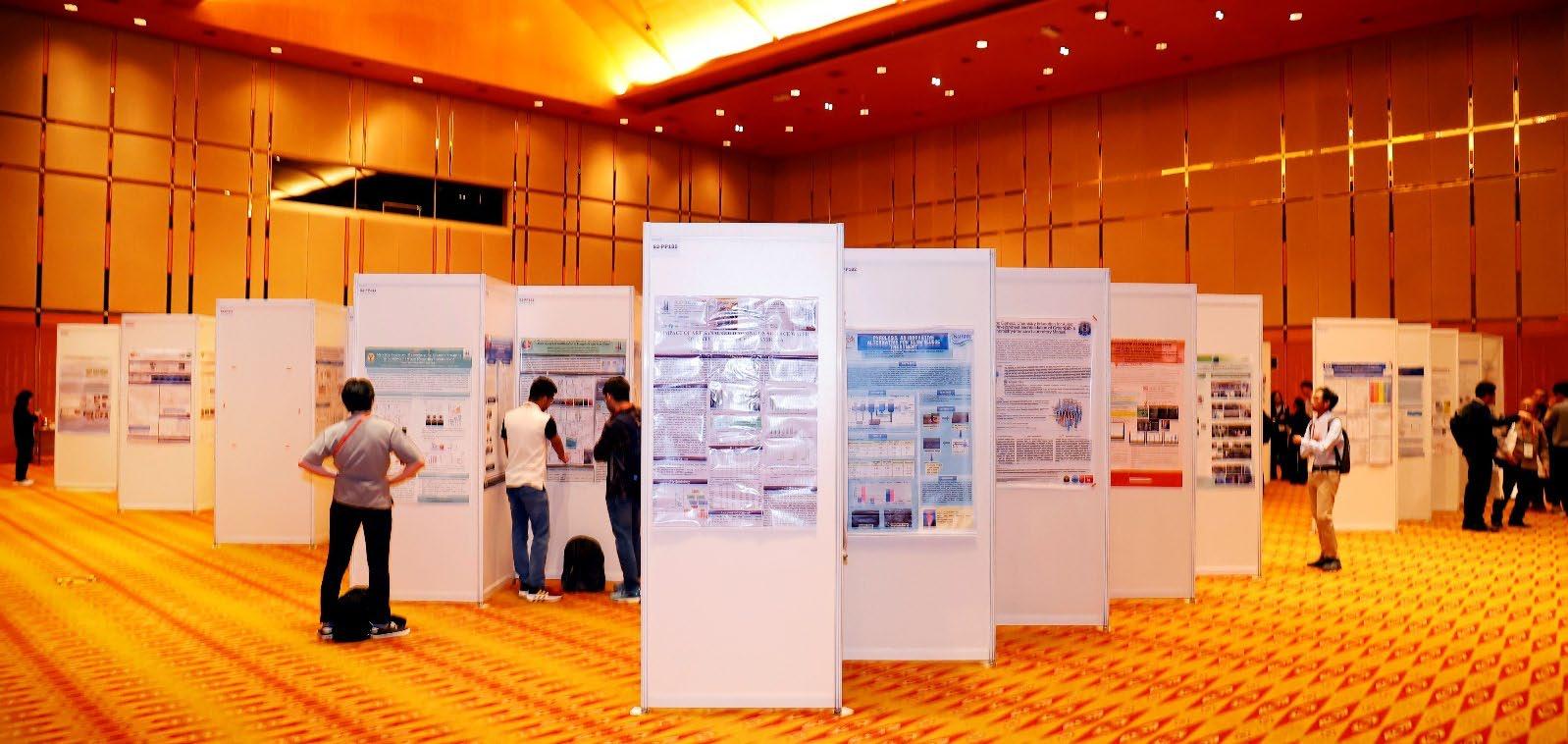
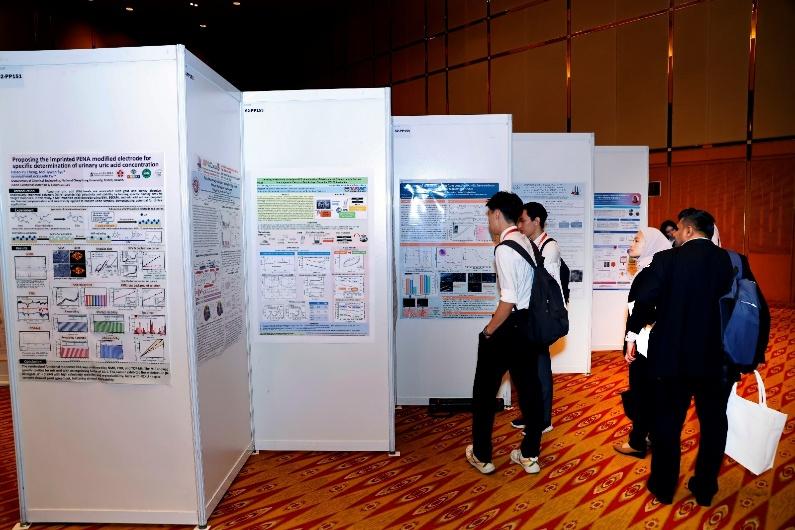
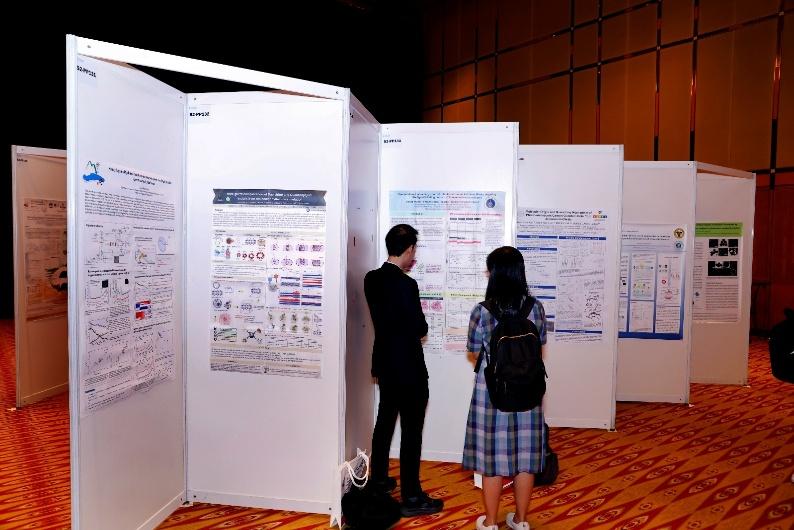
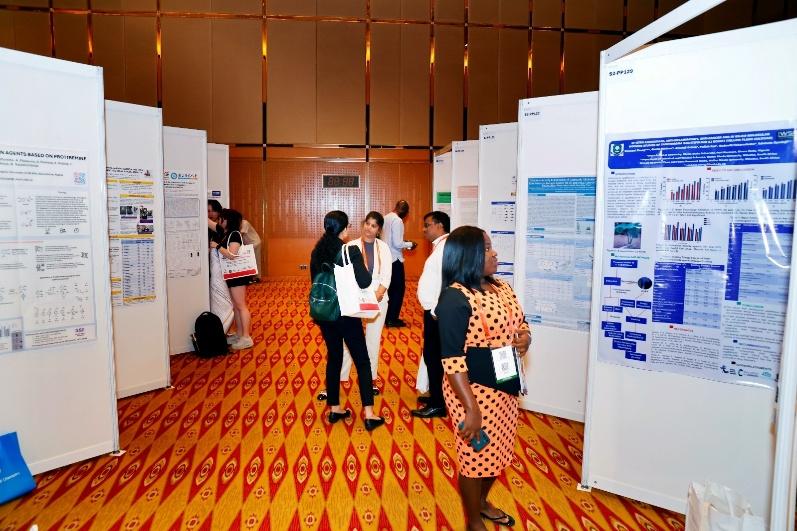
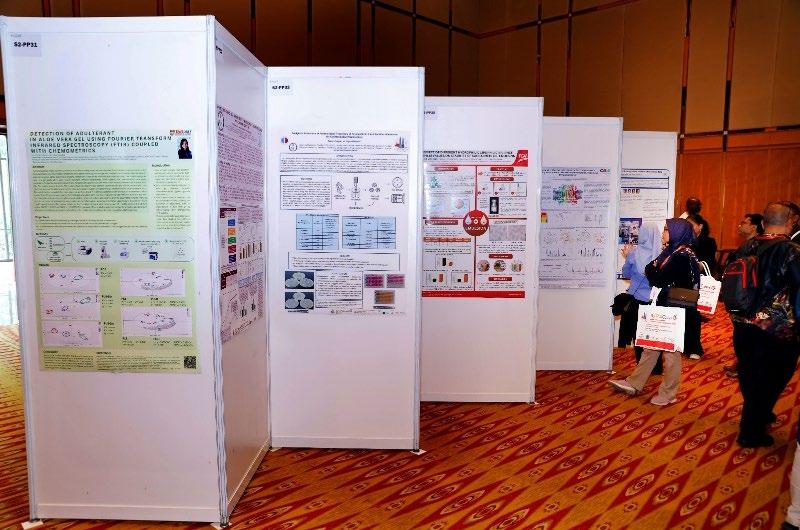
IUPAC 2025 featured an extensive Poster Sessions, with a total of 517 posters accepted for onsite presentations. These sessions provided a dynamic platform for researchers to showcase their work, share innovative findings, and foster discussions with fellow delegates.

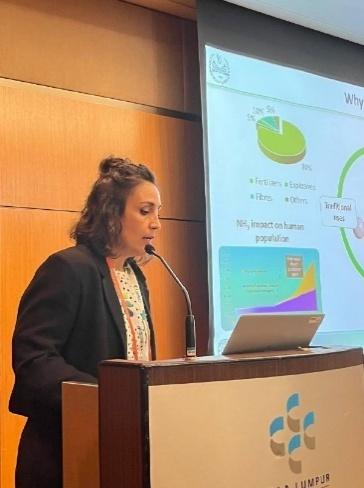
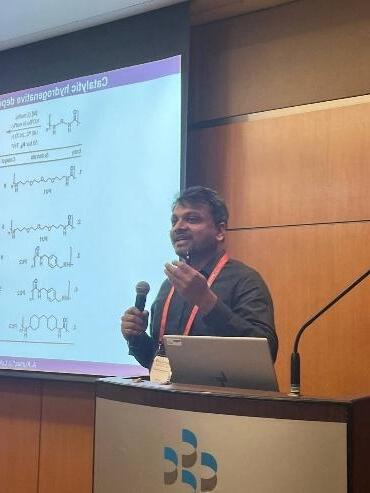
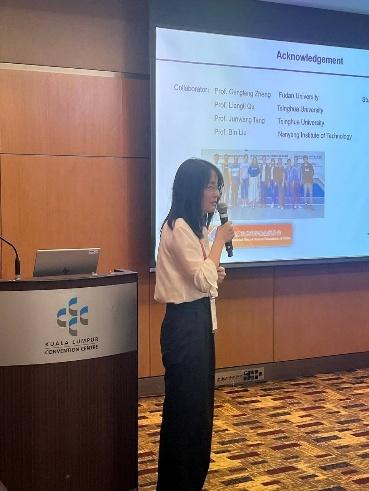
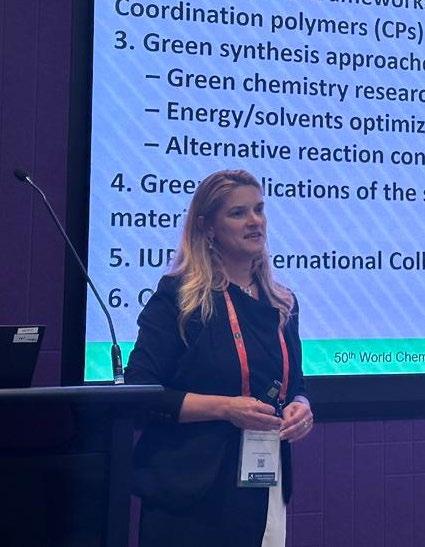
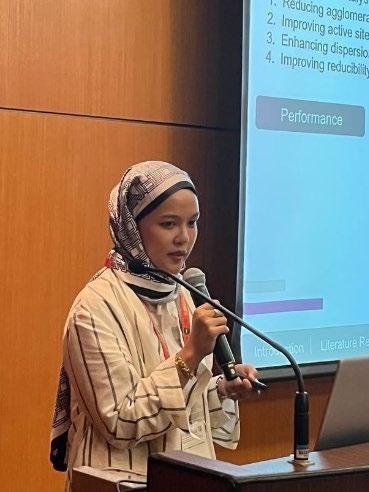
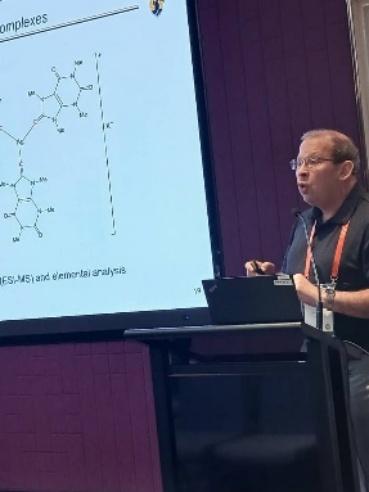
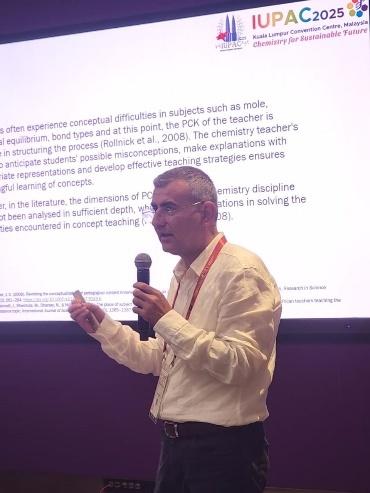
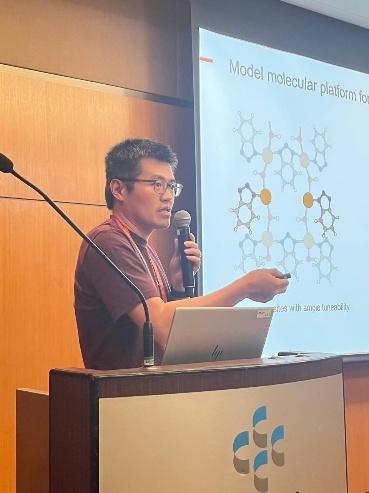
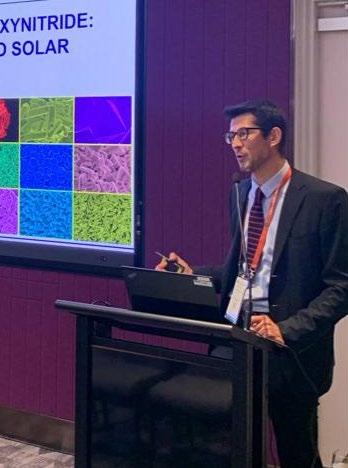
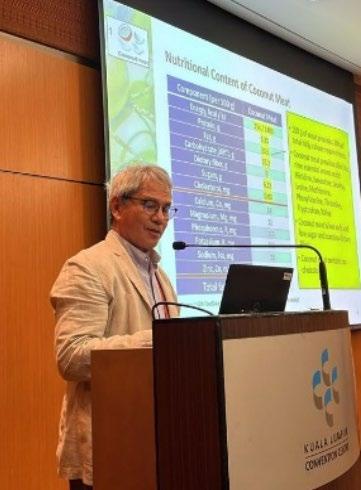

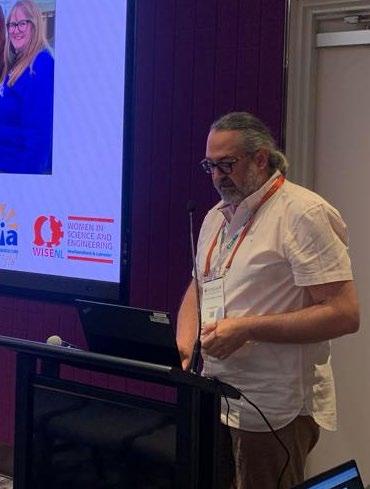
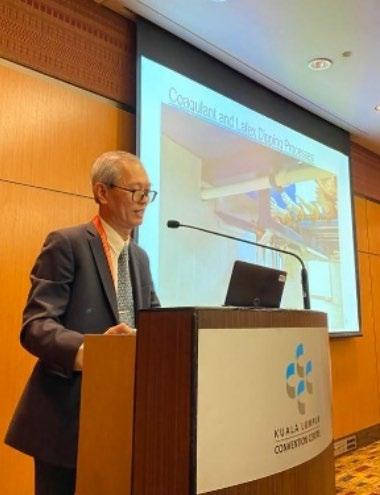

We are honou red to have welcomed more than 700 oral presenters at IUPAC 2025, each contributing their expertise and sharing valuable research that enriches the global chemistry community.

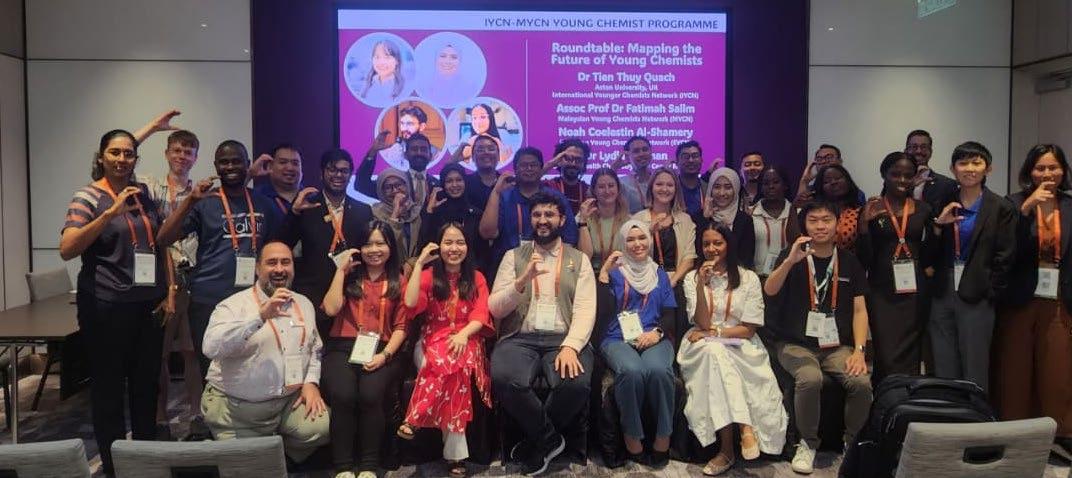
The IYCN- MYCN Young Chemist Programme is a collaborative initiative between the International Younger Chemists Network (IYCN) and the Malaysian Young Chemists Network (MYCN), held in conjunction with IUPAC 2025 on 15, 17 and 1 8 July 2025. This programme aims to empower early- career chemists by providing a dynamic platform for networking, skill- building, and professional development. Through workshops, panel discussions, and interactive sessions, participants will engage with global leaders in chemistry, foster international collaborations, and explore career pathways in academia, industry, and beyond.
*This programme is for IUPAC WCC registered participants only
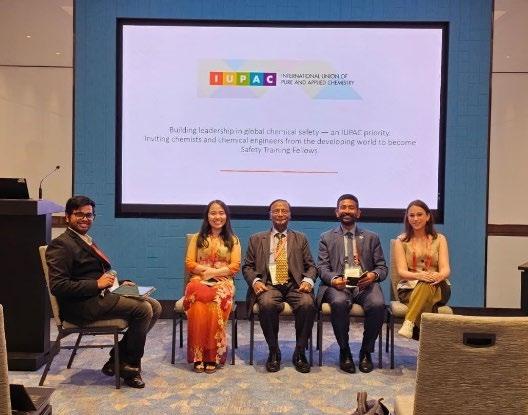
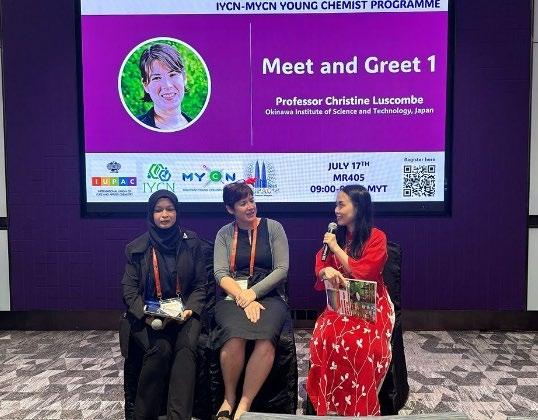
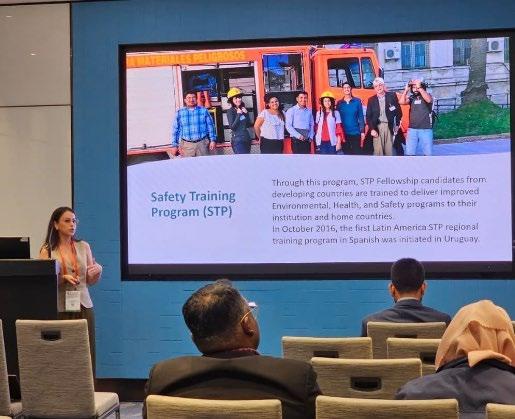
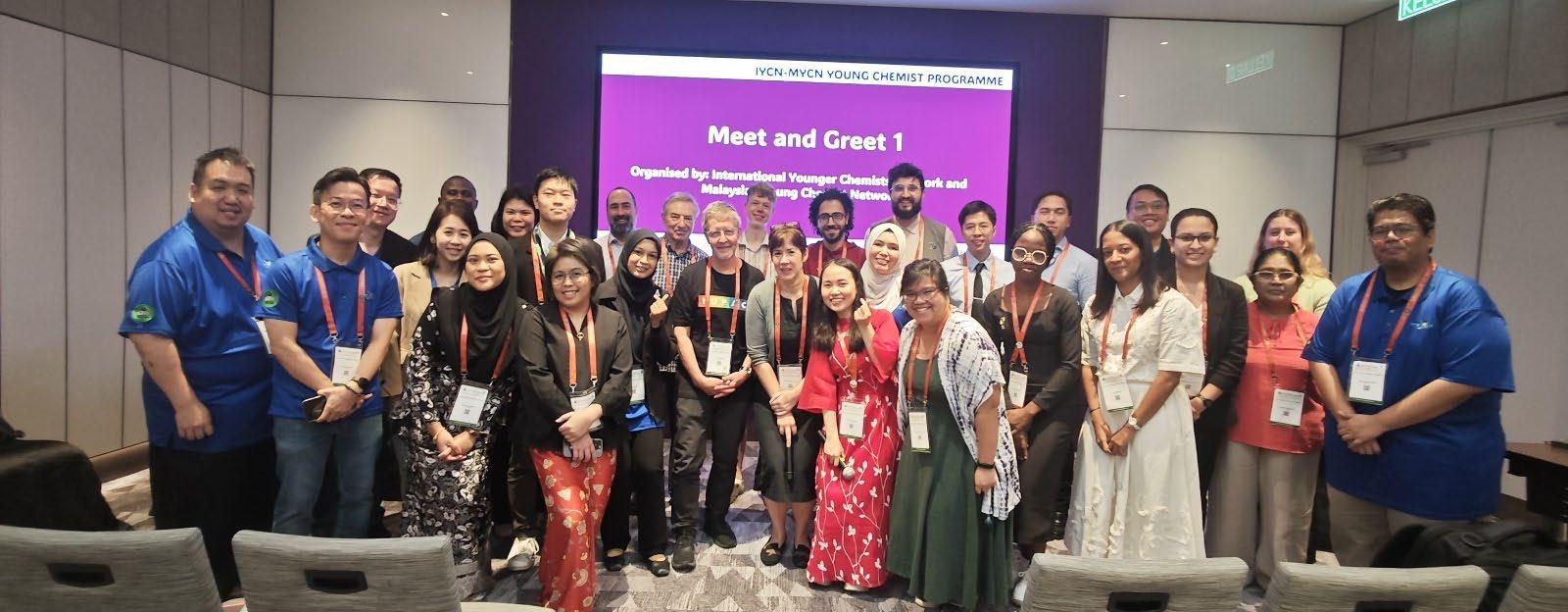

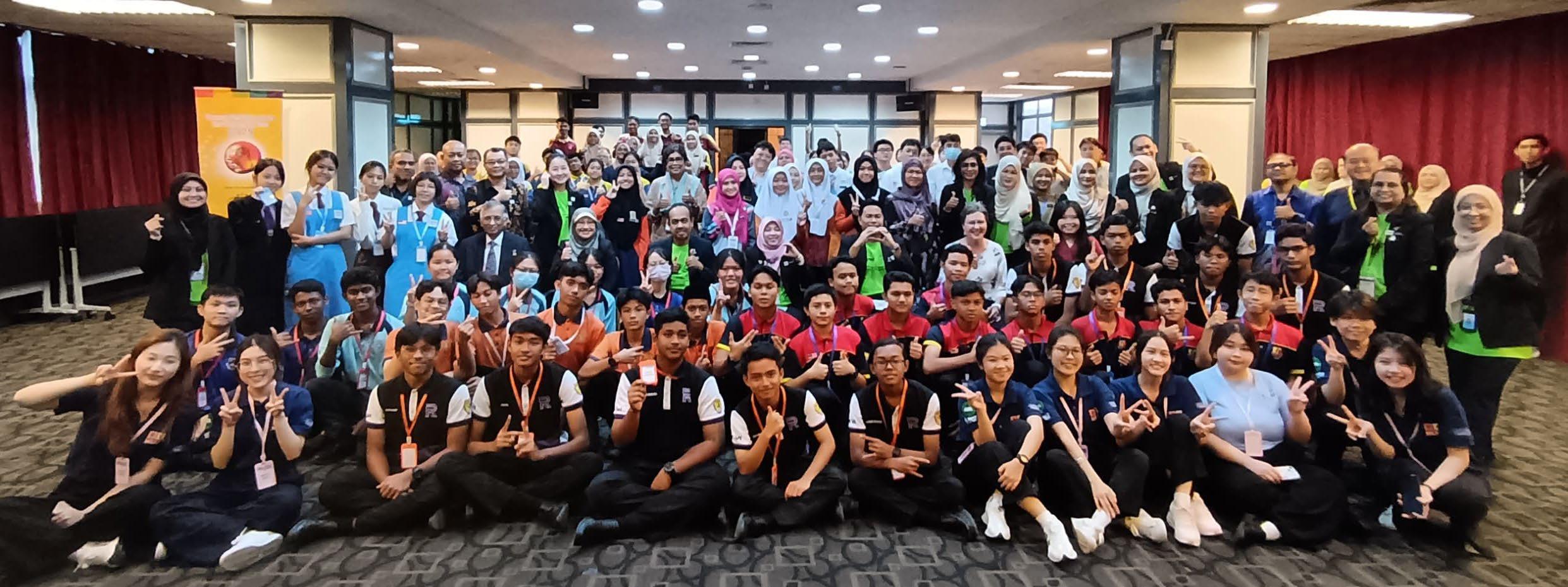
On 17 July 2025, the Department of Chemistry Malaysia (CHEMISTRY Malaysia) launched the Young Ambassador of Chemistry (YAC) program, officiated by Director- General YBrs. ChM
The Young Ambassadors for Chemistry (YAC) program, an initiative under IUPAC/CCE, continues to inspire future scientists through its global “Train the Trainers” approach. Since 2003, YAC has reached 17 countries, bringing teachers and students together to promote chemistry education and outreach. This year, the program was hosted by the Department of Chemistry Malaysia, gathering 20 teachers and 100 students for a day of enriching lectures and hands- on training.
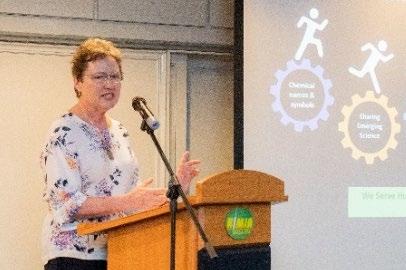
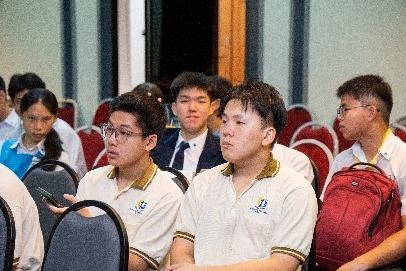
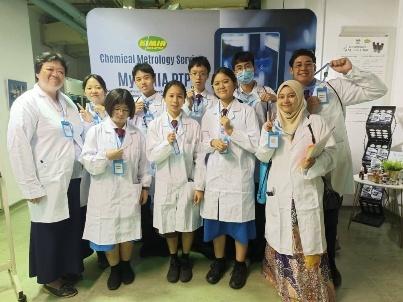
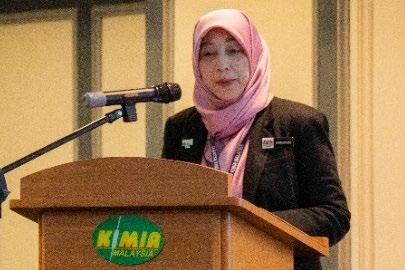
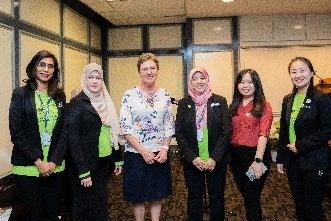
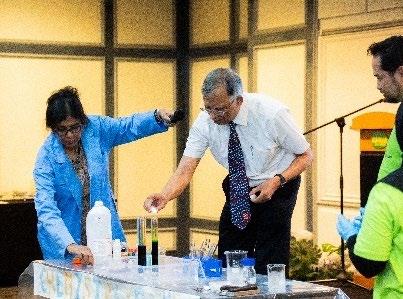

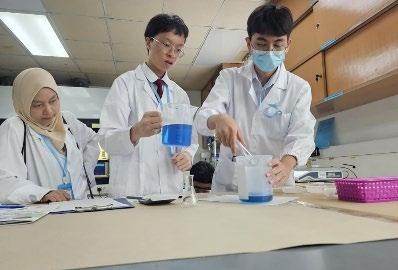
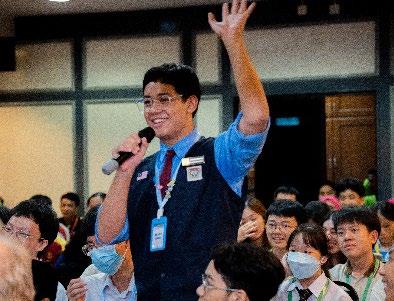
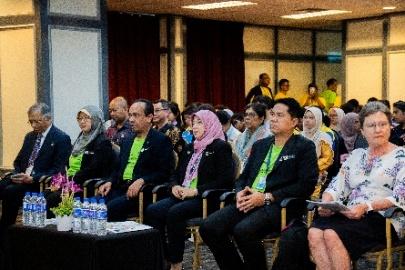
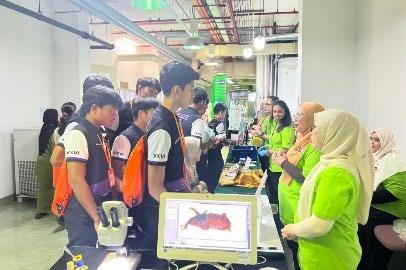
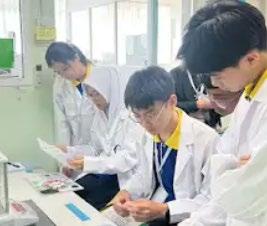
Participants explored how chemistry connects to the United Nations Sustainable Development Goals (SDGs), with activities such as food and microbiological analysis (SDG 3: Health), knowledge- sharing (SDG 4: Education), water testing (SDG 6: Clean Water), Ha lal authentication (SDG 8: Decent Work), precision weighing (SDG 12: Responsible Consumption), and forensic science (SDG 16: Peace & Justice). By equipping teachers and students with practical skills, confidence, and leadership, the YAC program empowers pa rticipants to champion chemistry within their schools and communities, shaping tomorrow’s scientific leaders.

CONGRESS LEGACY – BIULDING AND STRENGTHENING COLLABORATION: PUBLIC JOINT STOCK COMPANY PHOSAGRO AND INSTITUT KIMIA MALAYSIA
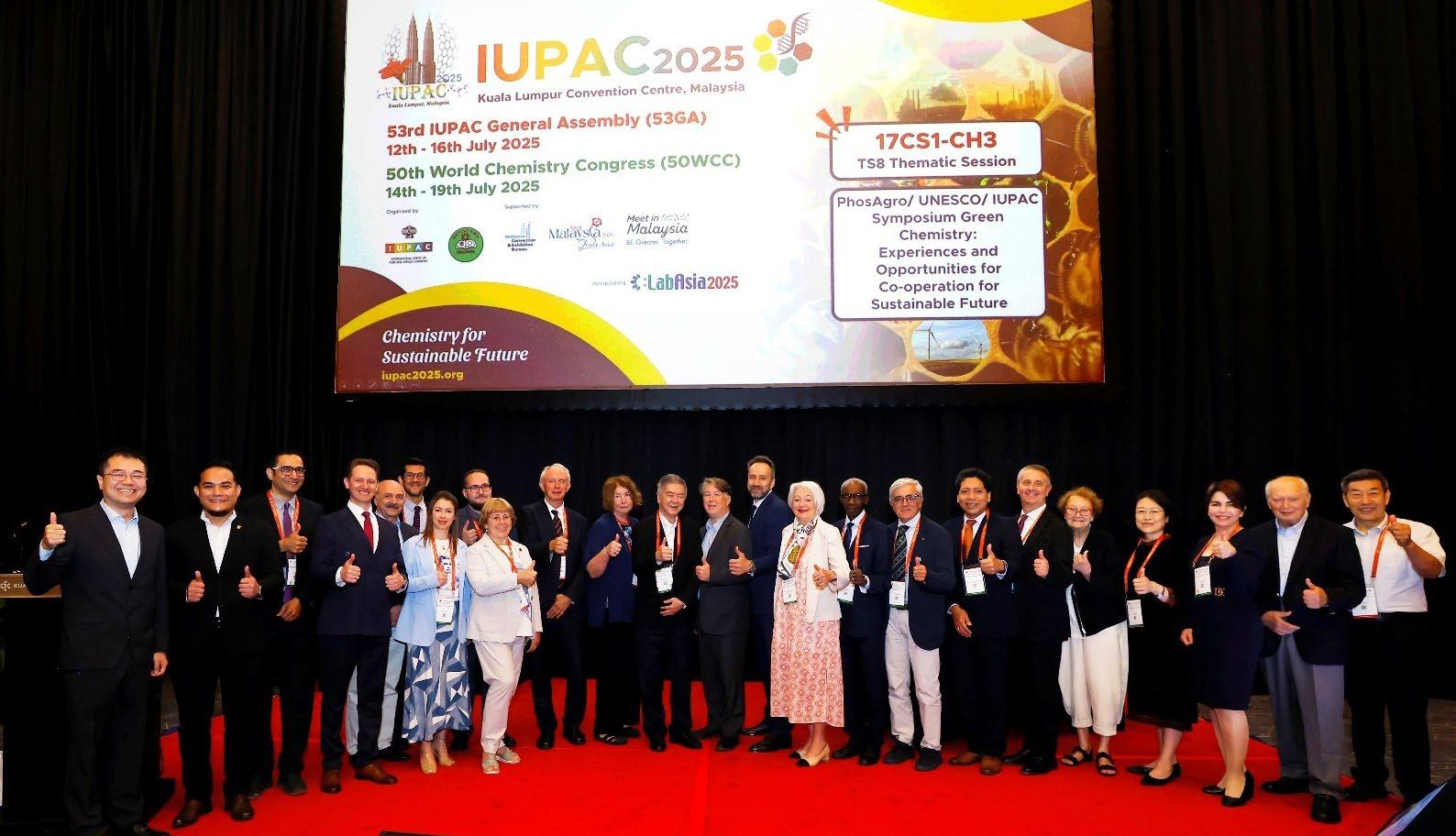
PhosAgro presented a series of Certificate of Appreciation to renowned scientists and collaborators for their outstanding contribution and exceptional commitment to promoting chemical sciences in response to the challenges the society is facing.
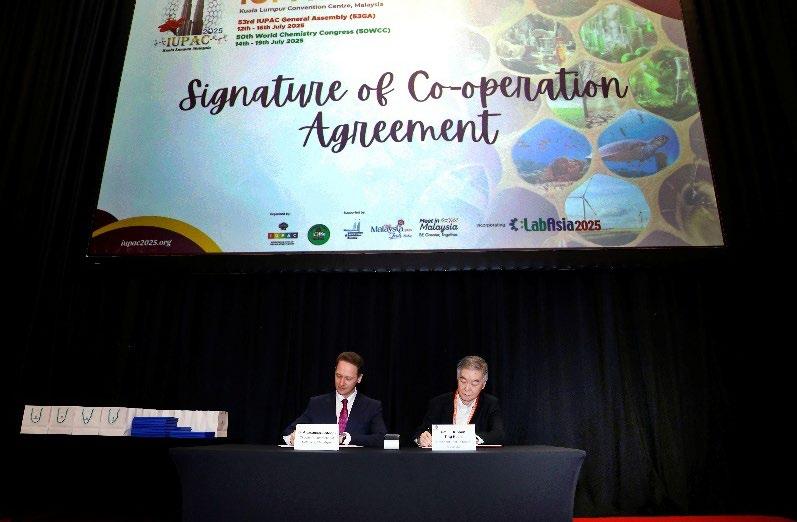
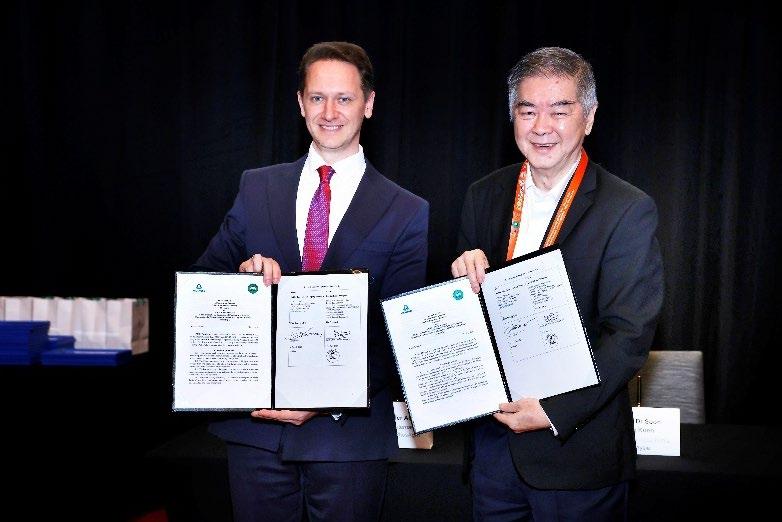
Agreement on Cooperation Between Public Joint Stock Company PhosAgro and Institut Kimia Malaysia in the International Promotion of Fundamental Sciences, Cooperation in Education and Research and Digital Educational Techologies was signed on 17 July 2025 during the “PhosAgro/UNESCO/IUPAC Symposium Green Chemistry: Experiences and Opportunities for Co- operation for Sustainable Future” thematic session, IUPAC 2025, Kuala Lumpur.
Through this partnership, PhosAgro and IKM aim to foster global awareness of the importance of basic scientific research, expand academic exchanges and joint research initiatives, and introduce modern digital platforms that make scientific knowledge more a ccessible. The cooperation underscores a shared commitment to sustainability, innovation, and the development of green chemistry as a tool for addressing global challenges, while strengthening ties between the scientific communities of Russia and Malaysia in the pursuit of knowledgedriven sustainable development.

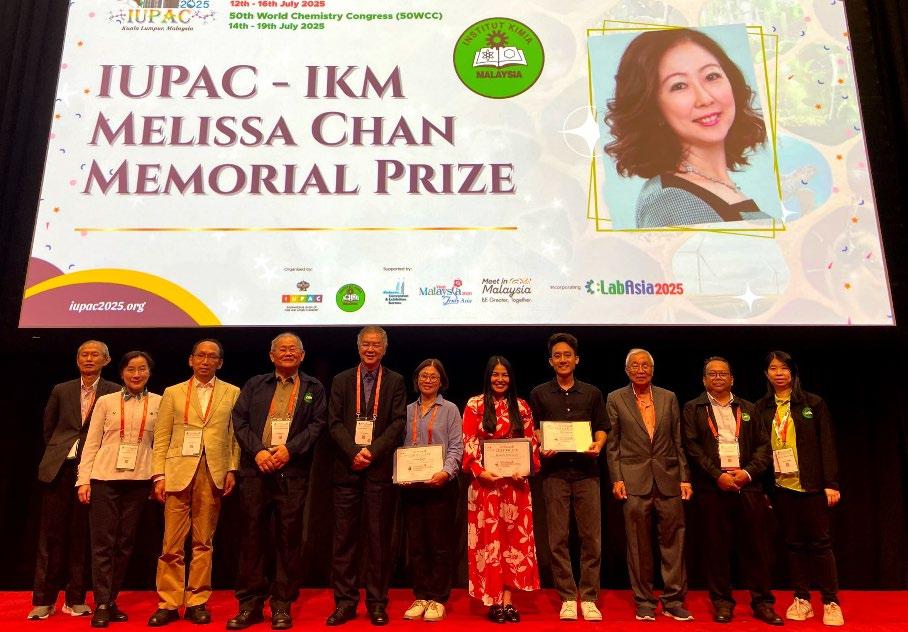
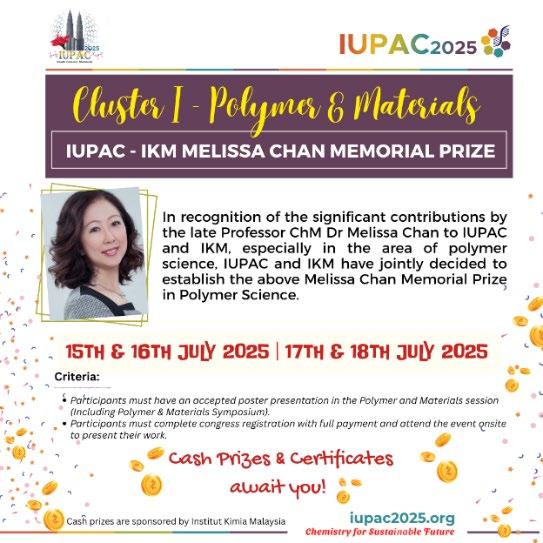
The IUPAC –IKM Melissa Chan Memorial Prize Poster Presentation Competition was established in honour of the late Professor ChM Dr Melissa Chan, in recognition of her significant contributions to the field of polymer science. A total of 69 eligible posters participated across two sessions. Judging was conducted in a silent format without presenter involvement. A panel of 14 judges was appointed and divided into groups to evaluate the entries based on predetermined criteria. A total of RM1,750.00 cash prizes, sponsored by Institut Kimia Malaysia (IKM), was awarded to the top three winners of the competition. The First- Place winner received RM1,000.00, the SecondPlace winner received RM500.00, and the Third- Place winner received RM250.00. In addition to the cash prizes, all winners were presented with a certificate of achievement in recognition of their outstanding accomplishments.
Session 1
15 July 2025, 1 2 00 hrs - 16 July 2025, 1200hrs
Session 2
17 July 2025, 1 2 00 hrs - 18 July 2025, 1200hrs
Venue: Banquet Hall
Organiser:
Datuk Soon Ting Kueh, Malaysia
Prof Rusli Daik, Malaysia
Prof Phang Sook Wai, Malaysia
Winners:
1 st Place: Mr Zhi Yuan Lee, Singapore
2 nd Place: Ms Sumontha Ramangkoon, Thailand
3 rd Place: Prof Zainab Ngaini, Malaysia
Judges:
Prof ChM Dr Ho Chee Cheong, Malaysia
Dr Aik Hwee Eng, Malaysia
Datin ChM Dr Zuriati Zakaria , Malaysia
Dato Dr Yew Chong Hooi, Malaysia
Prof Huanli Dong, China
Prof Rusli Daik, Malaysia
Prof Atsushi Kajiwara , Japan
Prof Atsushi Sudo, Japan
Prof Yoshito Andou, Japan
Prof Ishak Ahmad, Malaysia
Prof Christine Luscombe, Japan
Prof Carol Sze Ki Lin, Hong Kong, China
Prof Daewon Sohn, Korea
Prof Myung Han Yoon, Korea

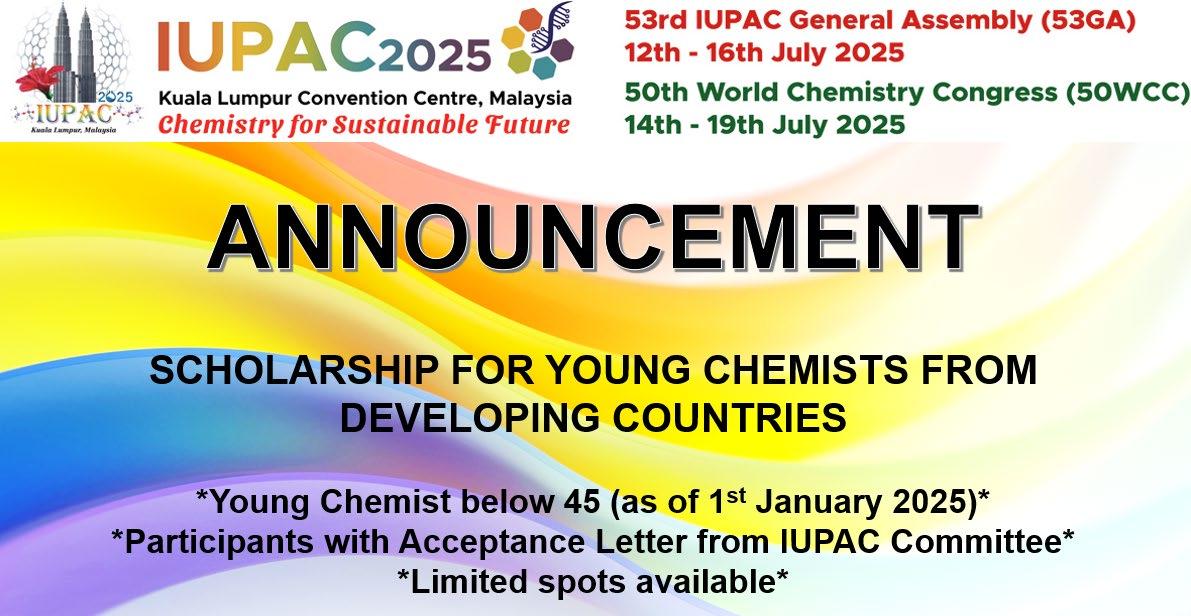
IUPAC 2025 offered scholarships for the young chemists from developing countries aimed at supporting delegates from resource- limited settings, particularly those from low- and middle- income countries (LMICs). These grants were designed to broaden access to the congress, ensuring diverse participation and fostering collaboration across regions and disciplines within the global chemistry community.
A key focus was on encouraging the participation of young scientists, researchers, and students in chemistry and related fields. By providing financial support, IUPAC 2025 sought to empower the next generation of chemists to present their work, exchange id eas, and connect with international leaders driving innovation in chemical sciences.
Eligibility and selection criteria were clearly outlined, with emphasis placed on the quality and relevance of the applicants submitted abstracts or research projects. In total, IUPAC 2025 awarded 40 scholarships to young chemists from developing countries, enabling recipients to present their findings to an international audience, gain feedback, and build lasting collaborations
We extend our special thanks to Institut Kimia Malaysia and the Malaysia Convention & Exhibition Bureau (MyCEB) for their support on this initiative.

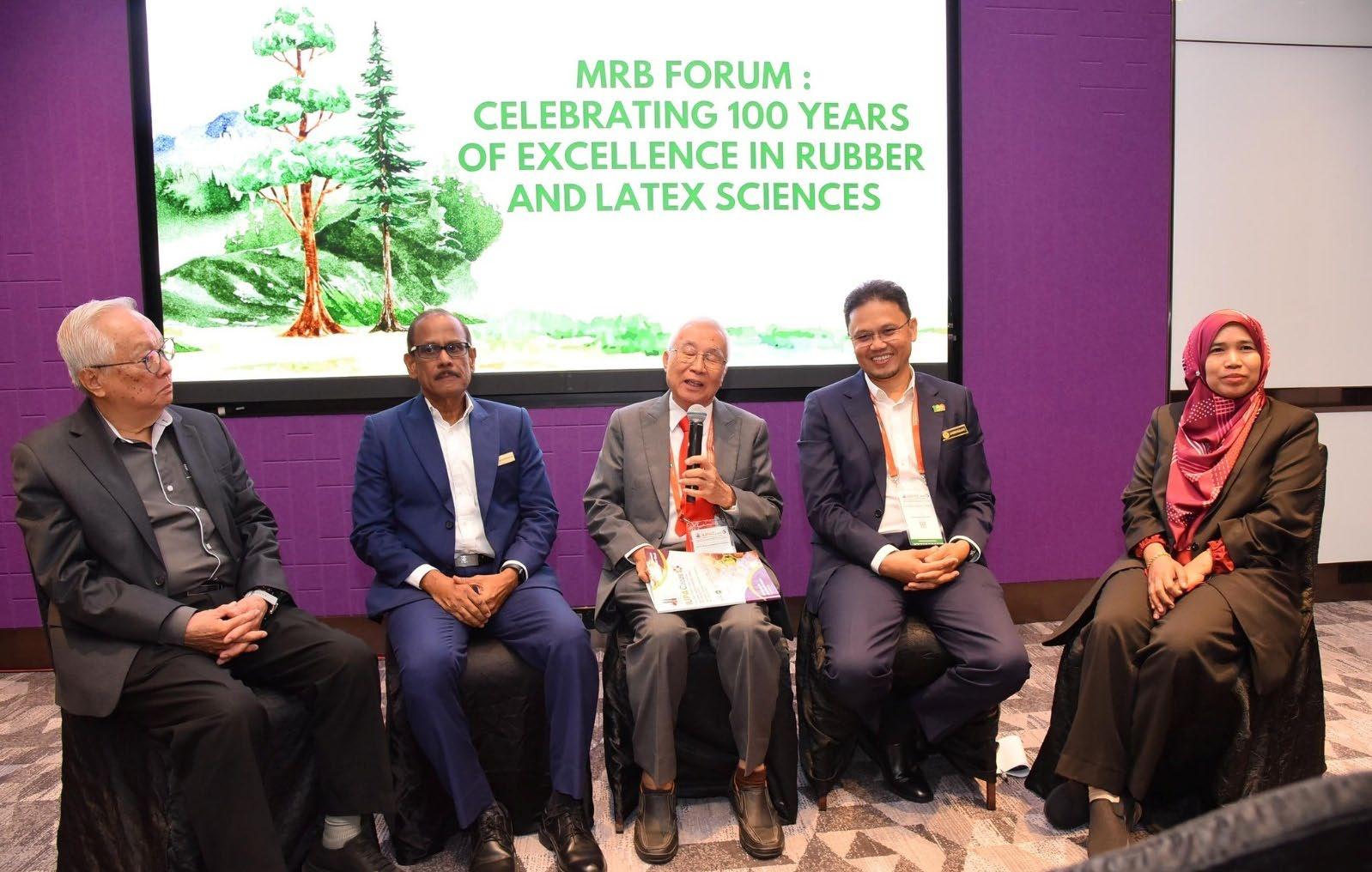
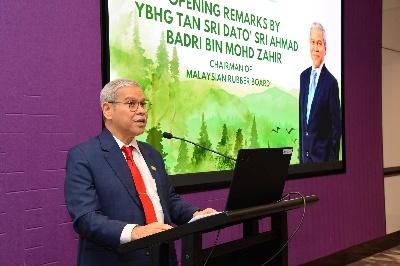
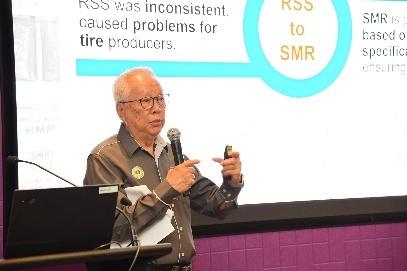
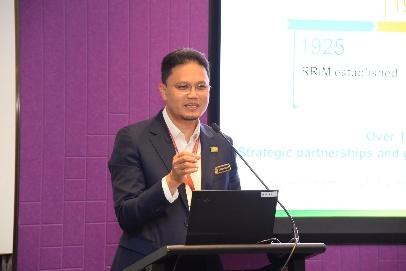
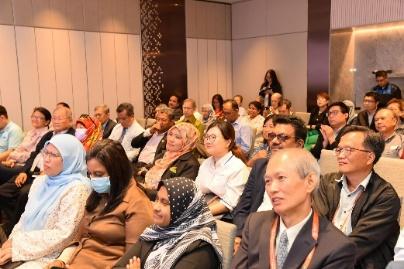
A landmark celebration for Malaysia’s rubber industry!
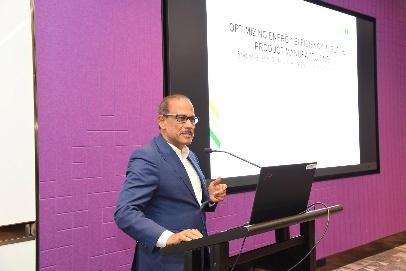
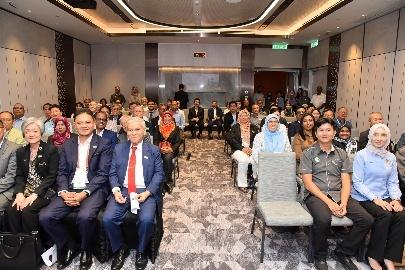
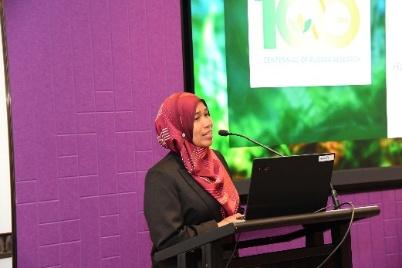
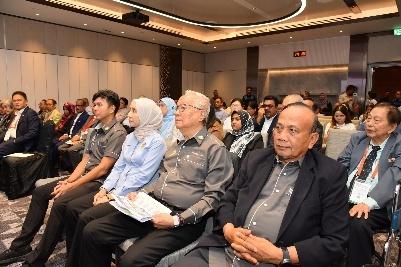
On 16 July 2025, the Malaysian Rubber Board (MRB) successfully organised the MRB Forum: Celebrating 100 Years of Excellence in Rubber and Latex Sciences at the KLCC Convention Centre, Kuala Lumpur, during the IUPAC 2025. The event was officiated by YBhg. Tan Sri Dato’ Sri Ahmad Badri bin Mohd Zahir, Chairman of MRB, in recognition of a century- long journey marked by innovation, scientific leadership, and global impact in the rubber and latex research domain. From pioneering research in the early 20th century to today’s advanced technologies and sustainable practices, MRB continues to lead as a key driver of natural rubber growth and transformation in the industry. This forum brought together researchers, industry players, and stakeholders to reflect on the past, celebrate present achievements, and envision the future of rubber science in Malaysia.
As MRB steps into its second century, it remains committed to advancing the rubber sector through innovation, sustainability, and global collaboration.
Source: https://www.facebook.com/share/p/1CQSTmsHRj/ Malaysian Rubber Board (MRB) Facebook page.

The IUPAC 2025 Gala Dinner took place on 16 July 2025 at the prestigious Shangri- La Hotel, Kuala Lumpur, bringing together a full house of more than 800 delegates from across the globe. It was a remarkable evening that celebrated not only the spirit of science but also Malaysia’s vibrant cultural heritage.
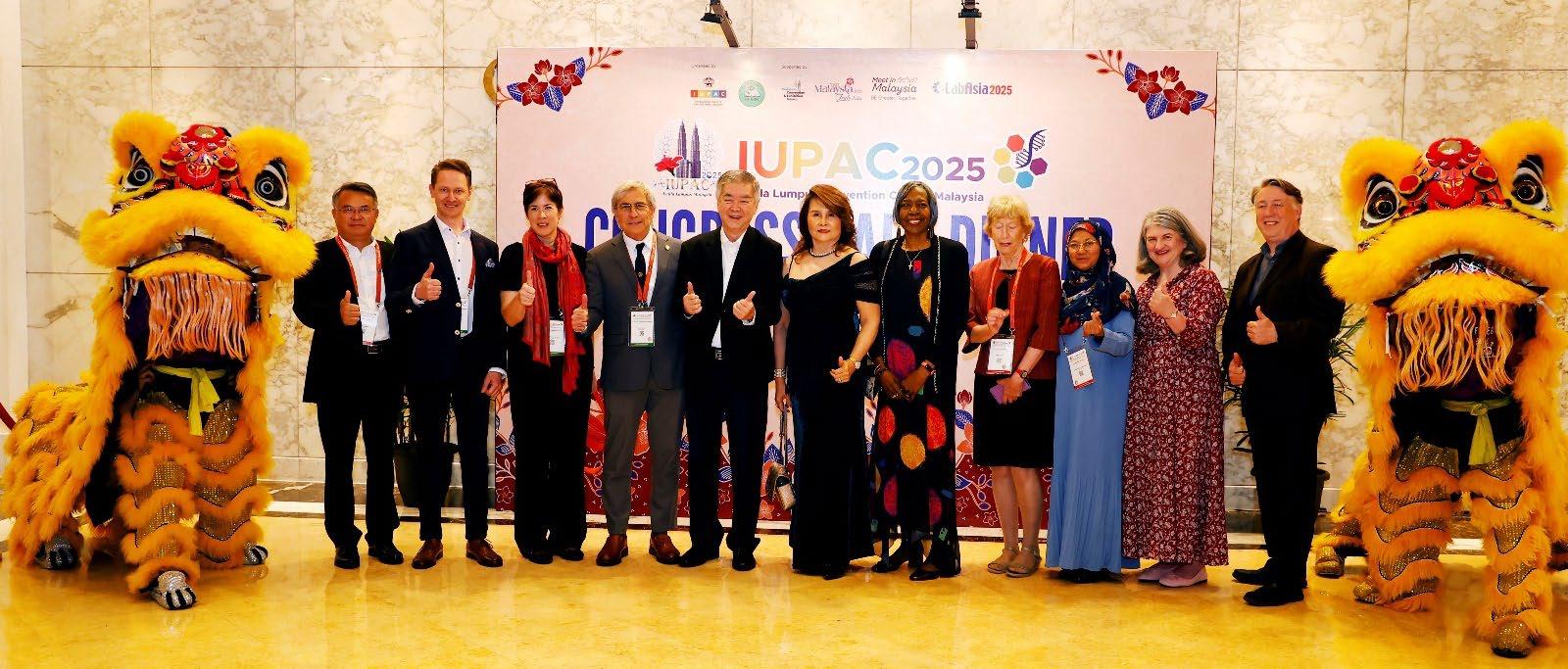
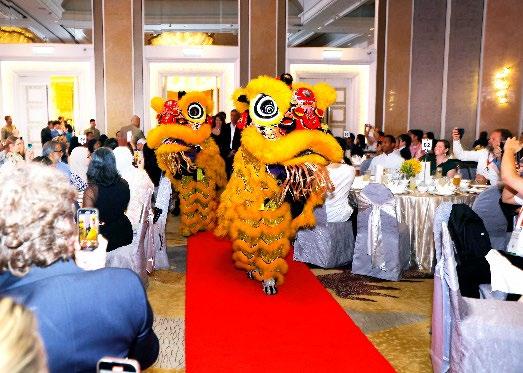
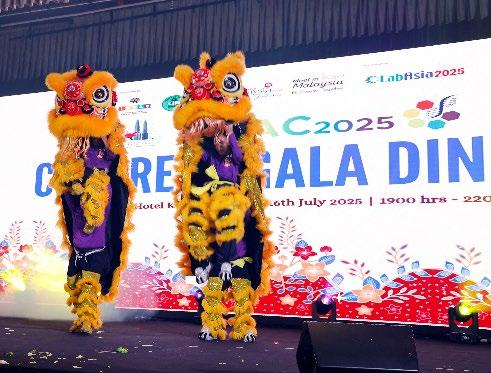
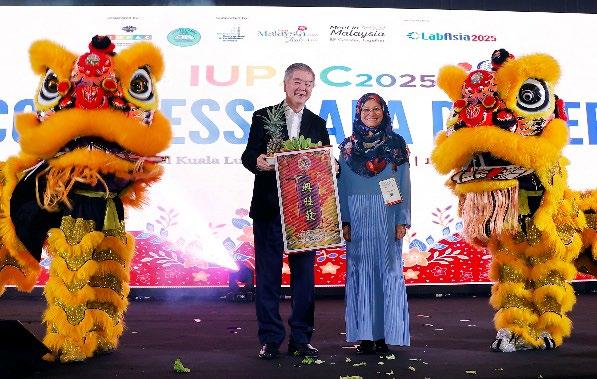
The evening commenced with a spectacular Lion Dance performance, as the lions proudly ushered the VIP guests into the Grand Ballroom with an air of festivity and good fortune. The energy continued to build with a short yet powerful performance of the Lion Dance on stage, setting a joyful and auspicious tone for the dinner.
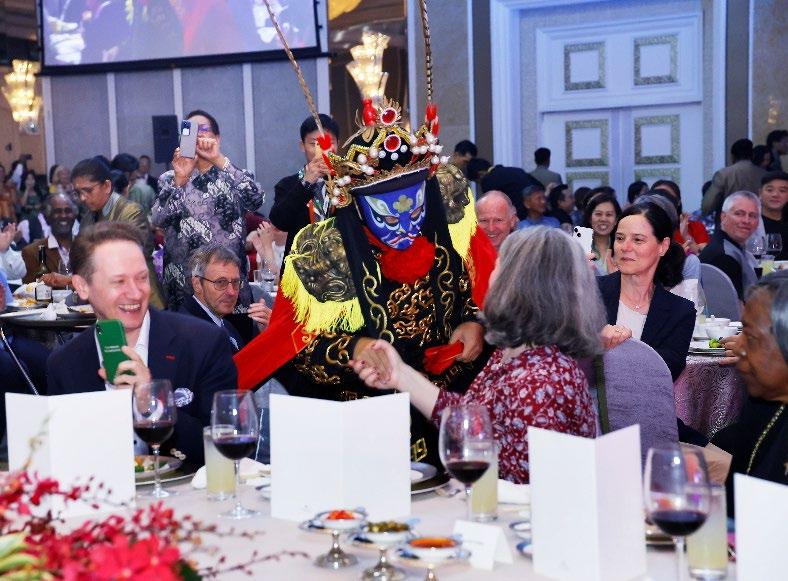
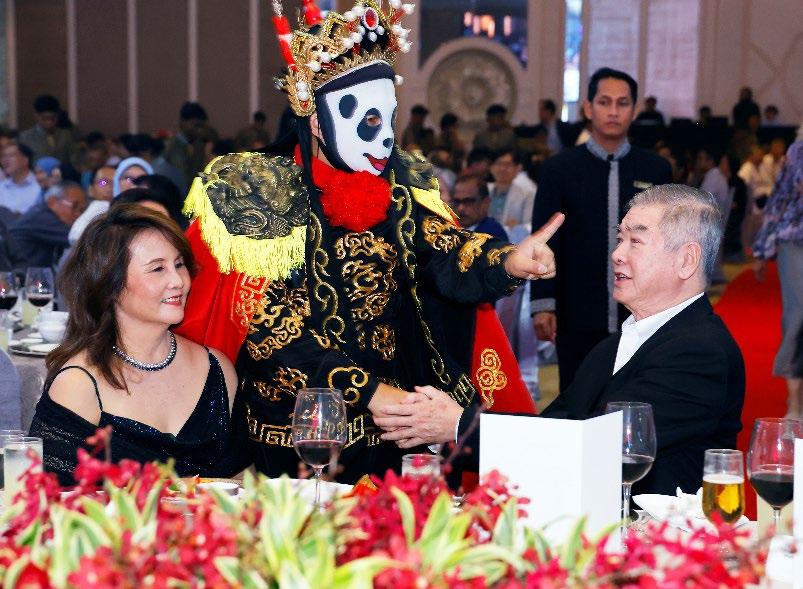
Guests were later enthralled by one of the evening’s highlights the mesmeris ing Mask Changing performance, which drew rounds of applause for its artistry and mastery.

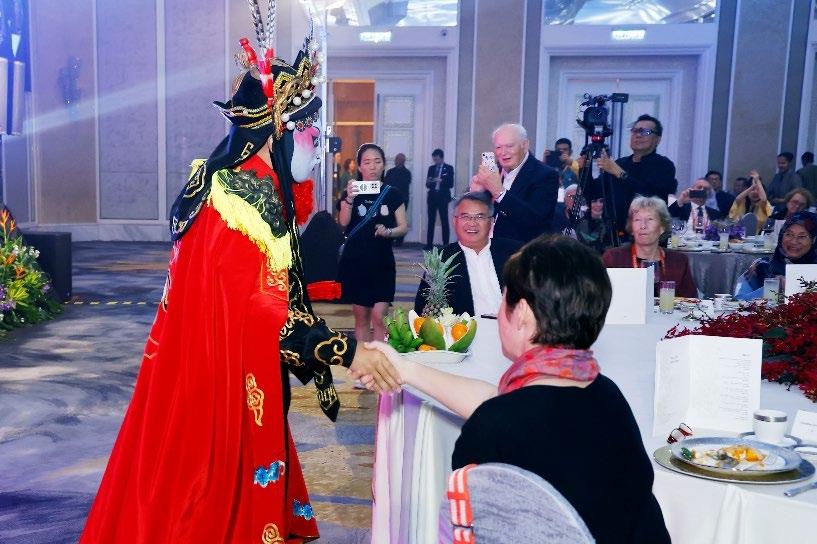
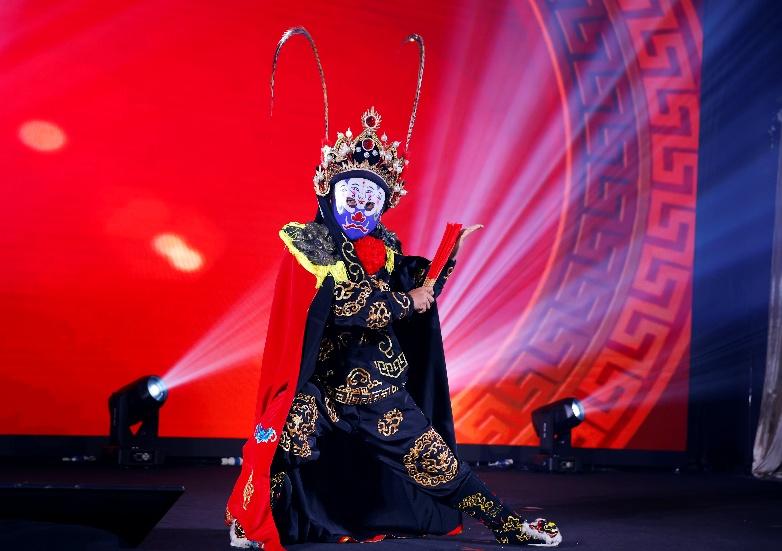
Adding a heartfelt dimension to the evening, the National Council of Senior Citizens Organisations, Malaysia (NASCOM) delighted the audience with a moving choir and duet performance, showcasing the spirit of inclusivity and community.
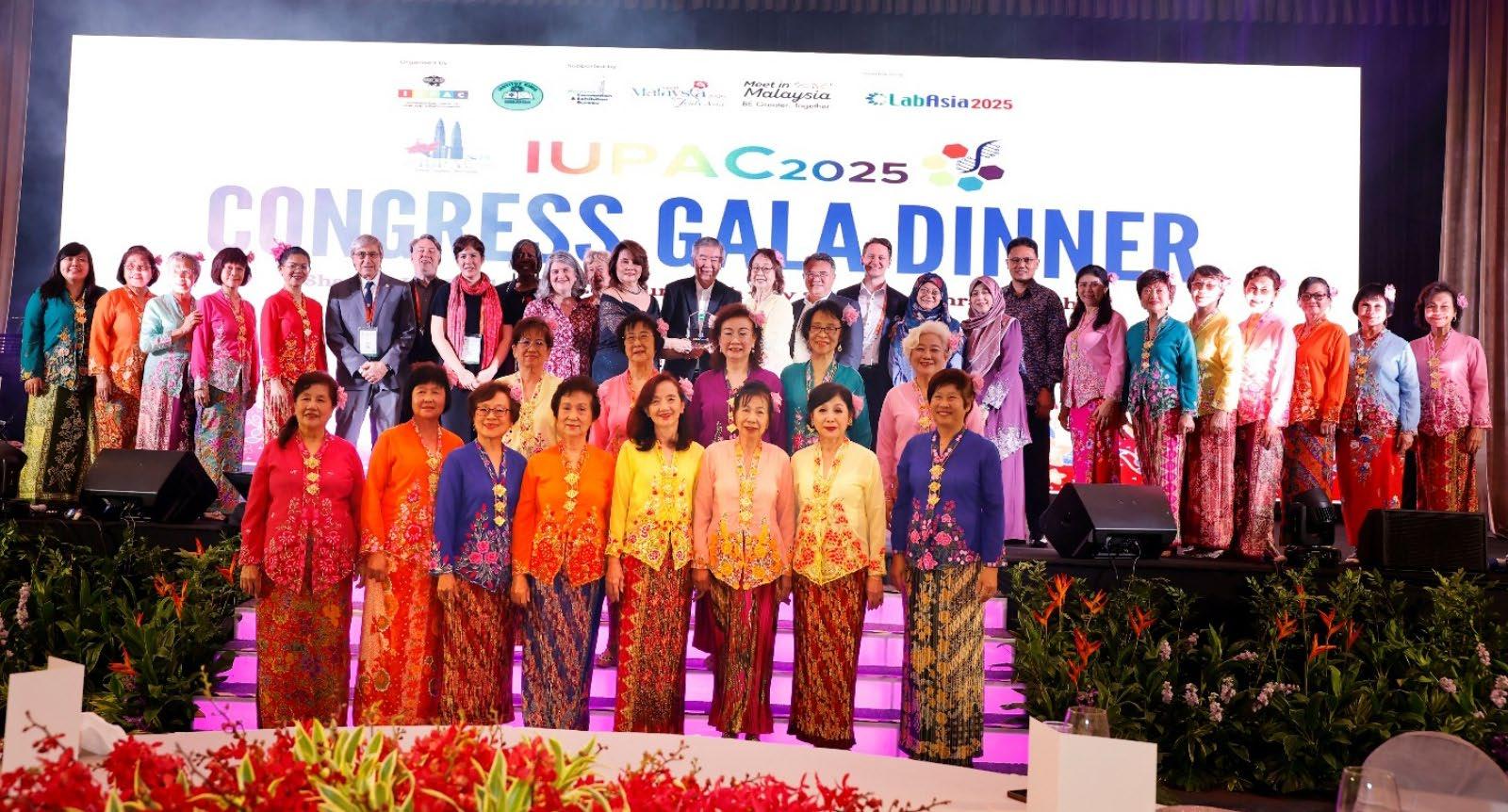
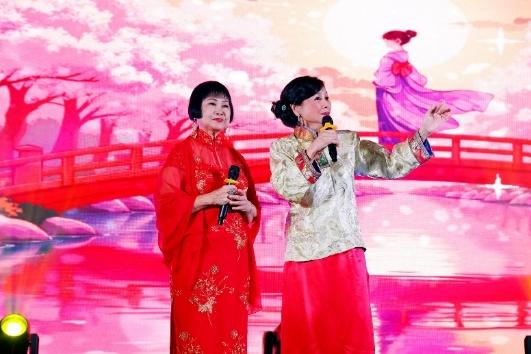
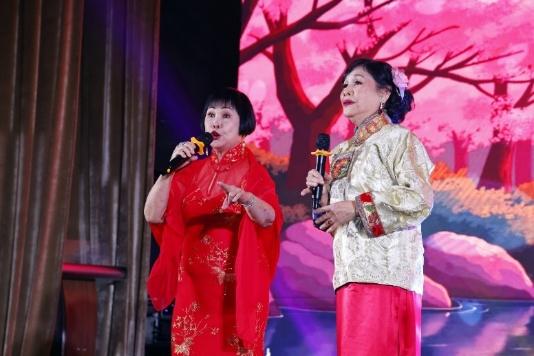
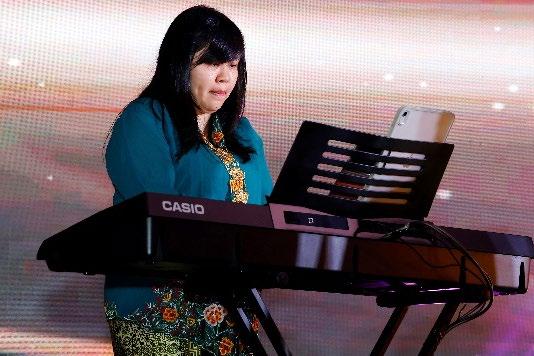

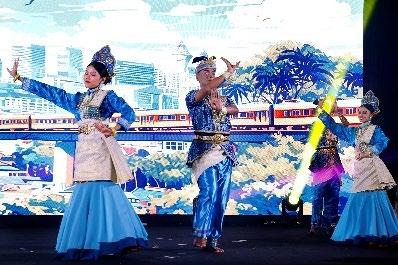
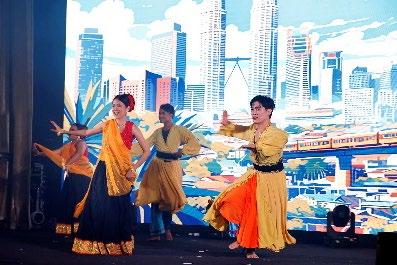
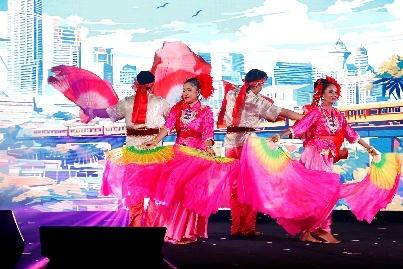
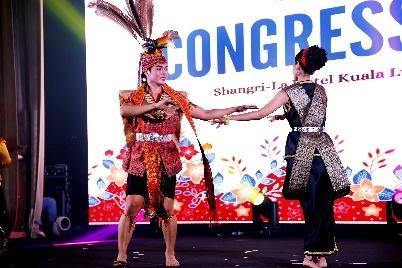
The Gala Dinner also featured a beautiful showcase of Malaysian cultural performances, reflecting the country’s diverse traditions through music and dance.
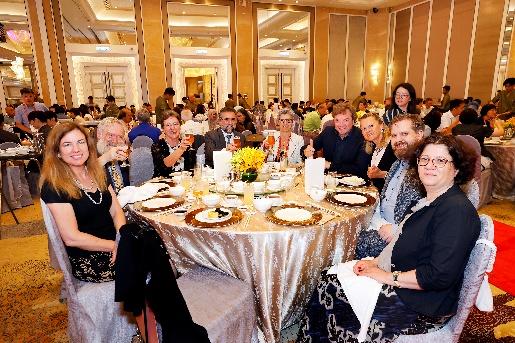
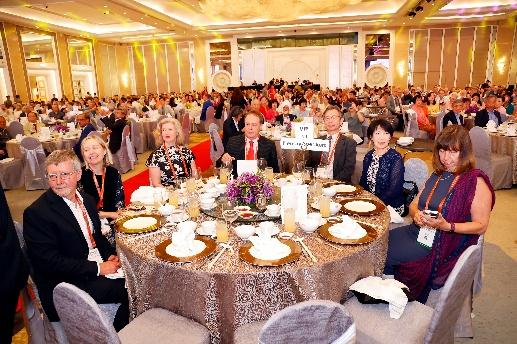
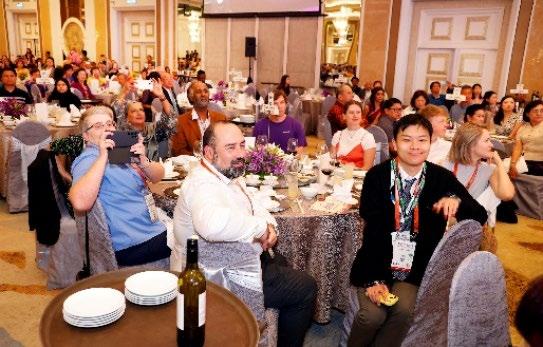
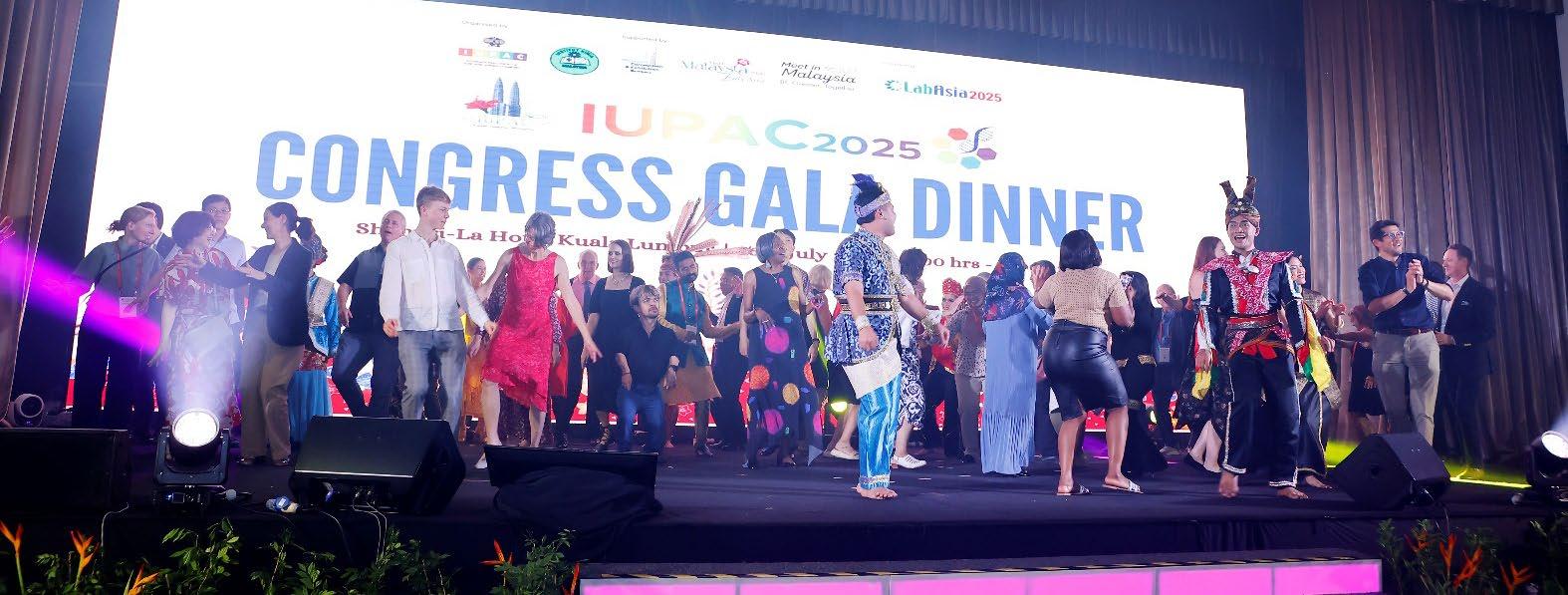
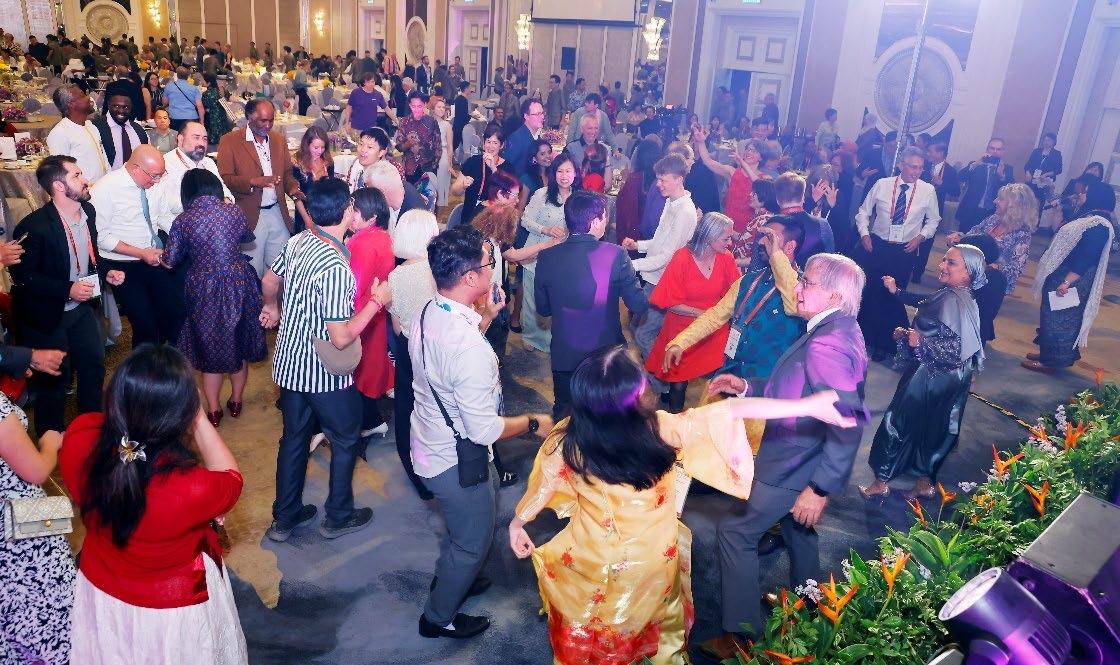
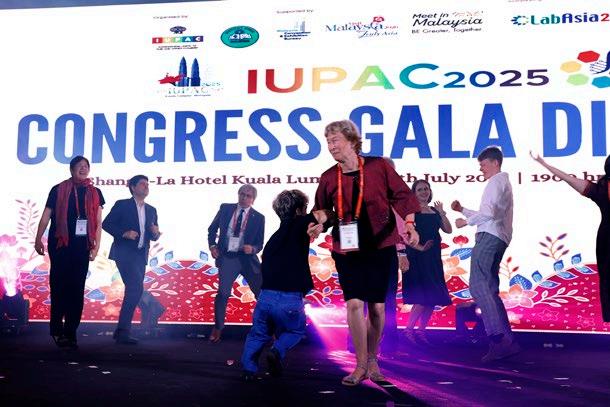
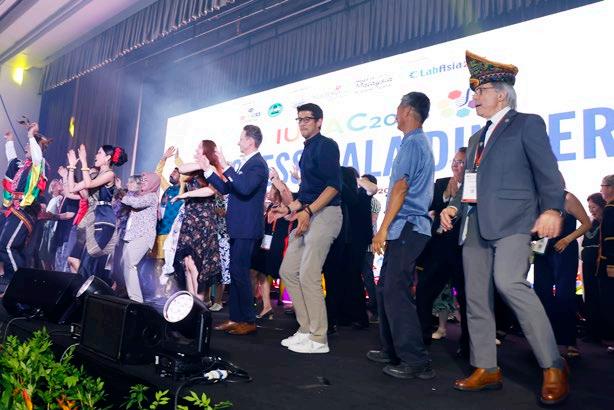
The night was filled with camaraderie, cultural appreciation, and celebration leaving delegates with lasting memories of fellowship, joy, and Malaysian hospitality. It was a fitting highlight of IUPAC 2025, strengthening bonds within the global chemistry community and underscoring the congress’s spirit of unity, collaboration, and cultural exchange.

On 17 July 2025, the Institut Kimia Malaysia (IKM) hosted the IUPAC 2025 Appreciation Dinner at the Mandarin Oriental Hotel, Kuala Lumpur, to honour the invaluable contributions of those who made the congress a success. The evening was a heartfelt occasion to recognise the unwavering support of the organising committee, IUPAC Council and officers, plenary and invited speakers, sponsors, partners, and collaborators who played a key role in bringing the global chemistry com munity together.
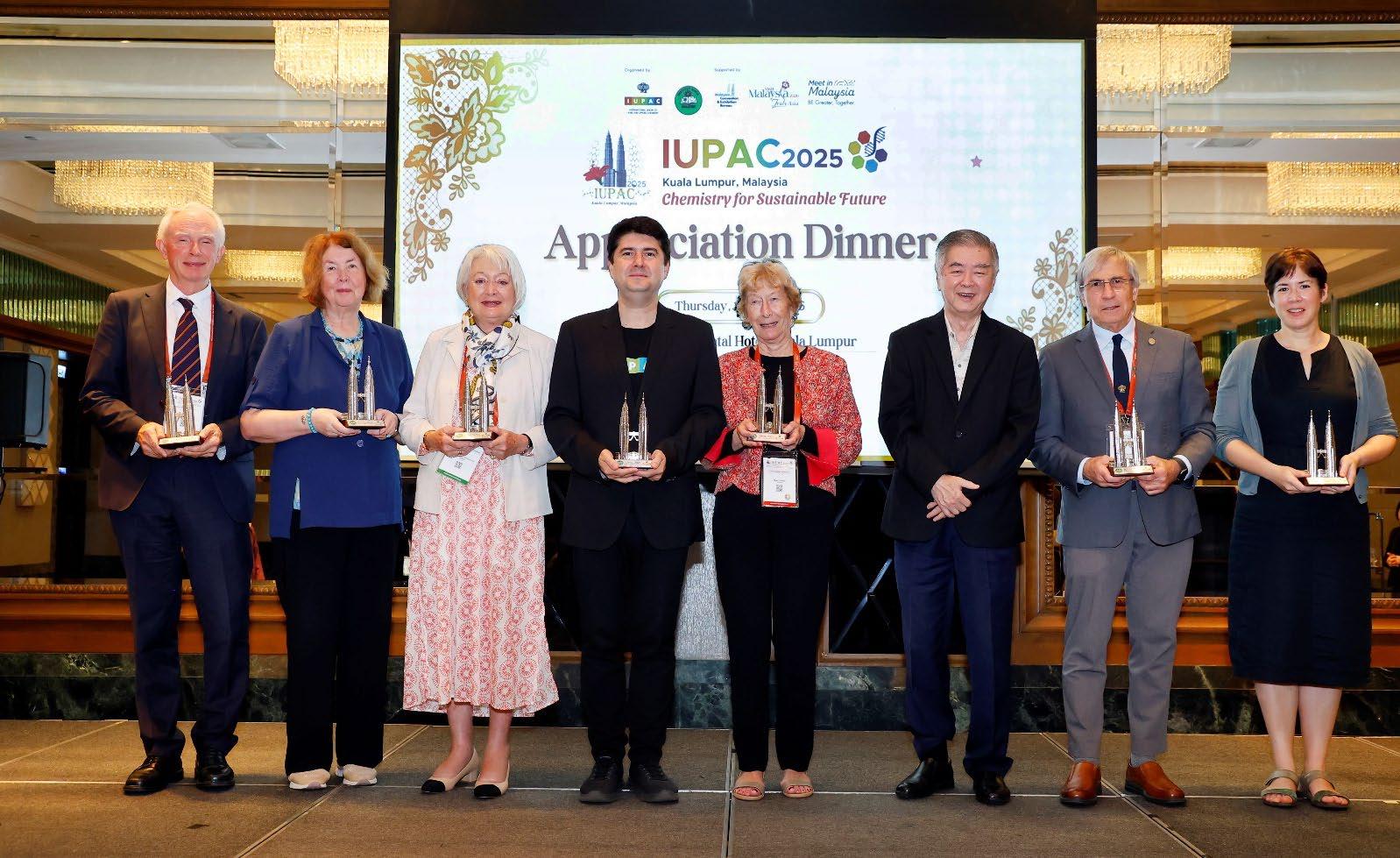
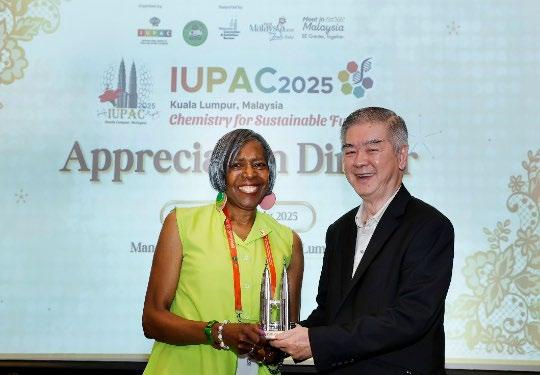
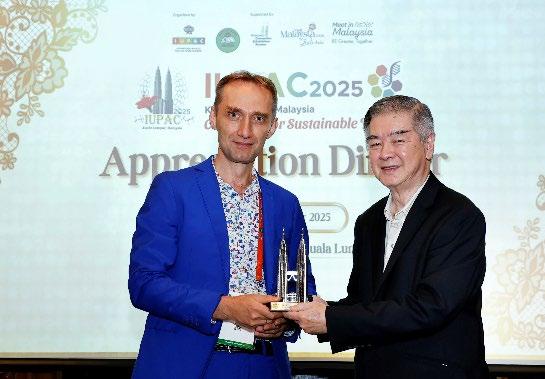
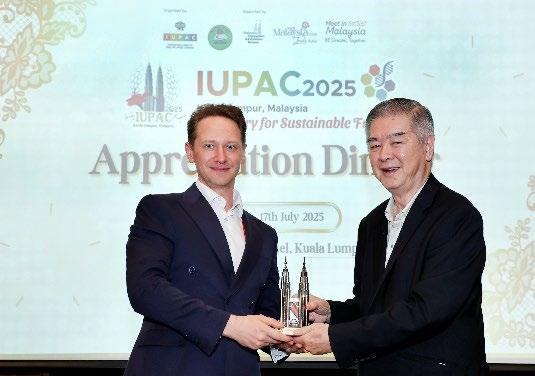
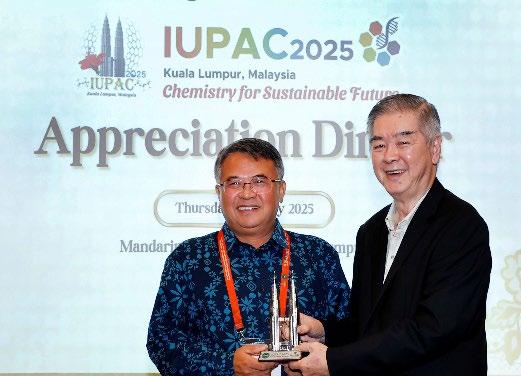
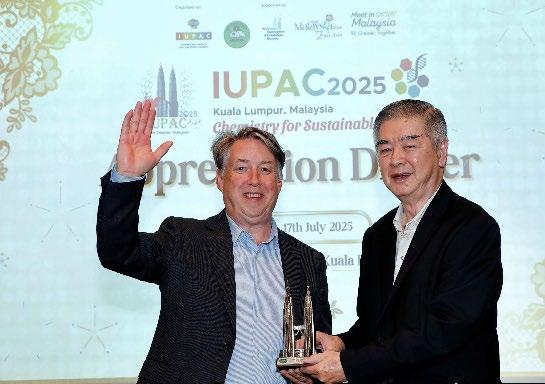
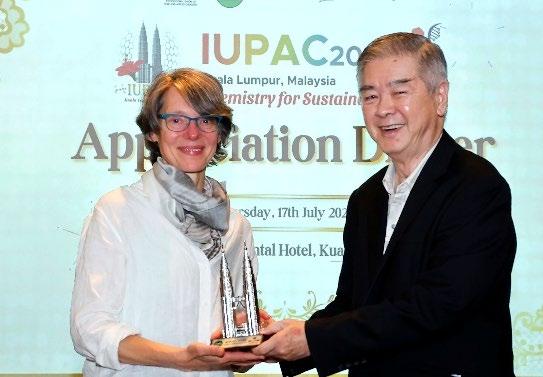
A token of appreciation was presented to acknowledge their dedication and commitment. Adding a personal touch, members were invited on stage to share their reflections and words of thanks, creating an atmosphere of camaraderie and gratitude.

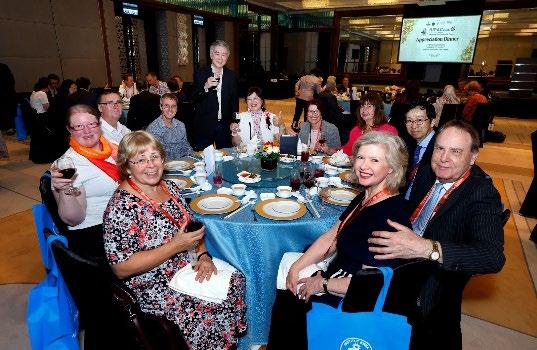
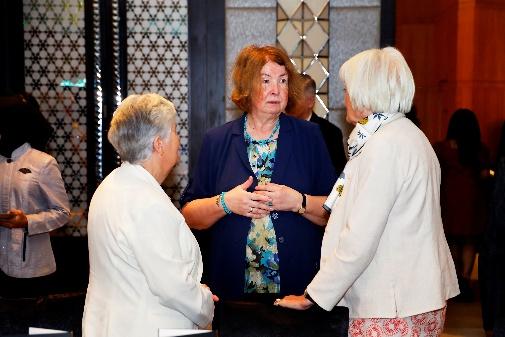

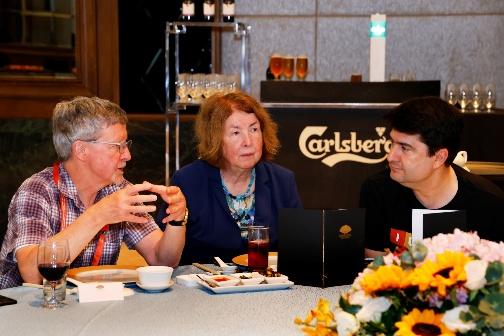
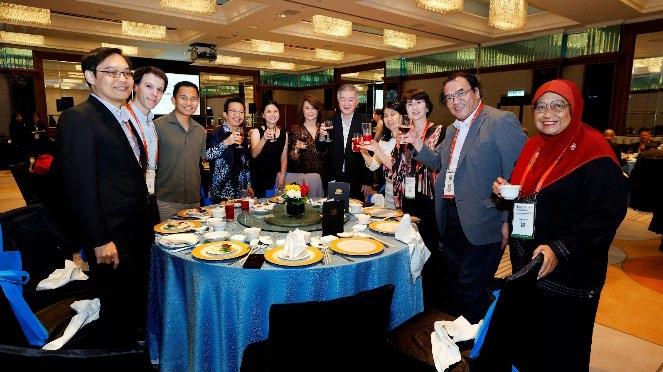
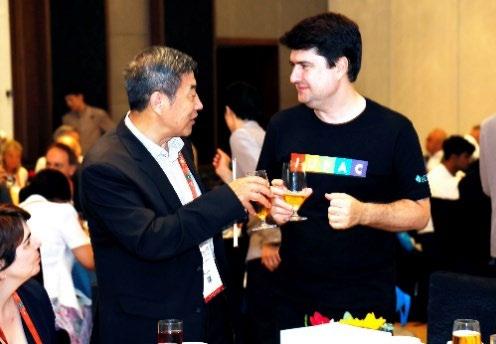
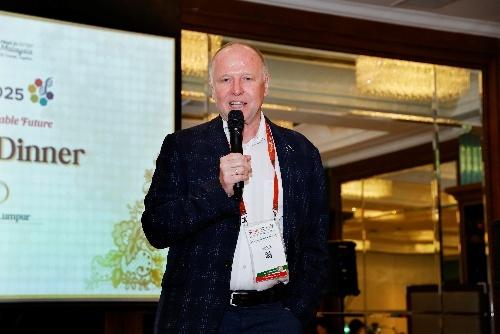
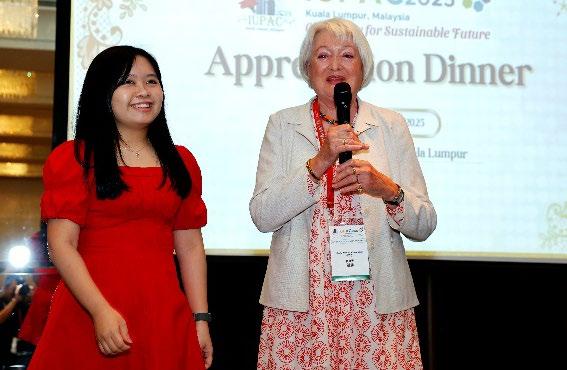
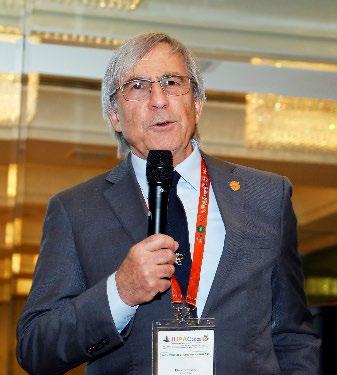
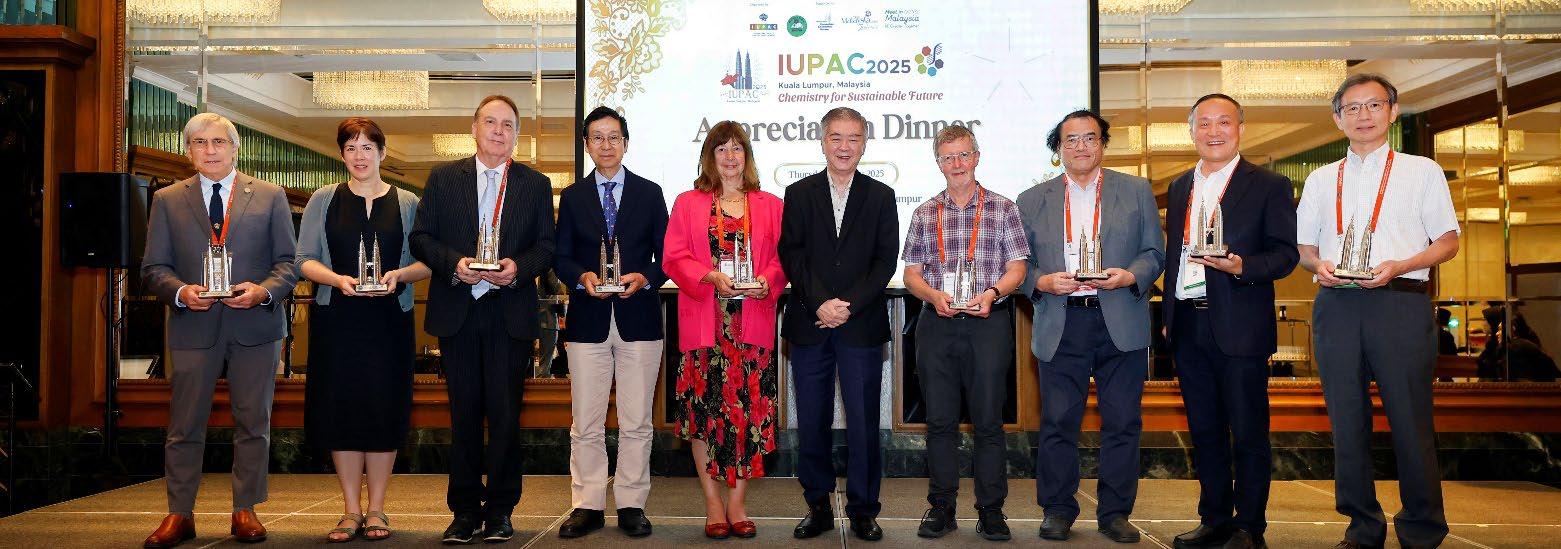
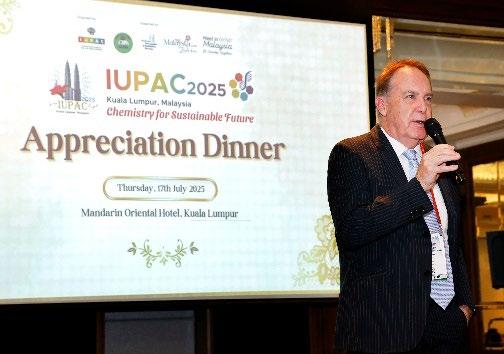
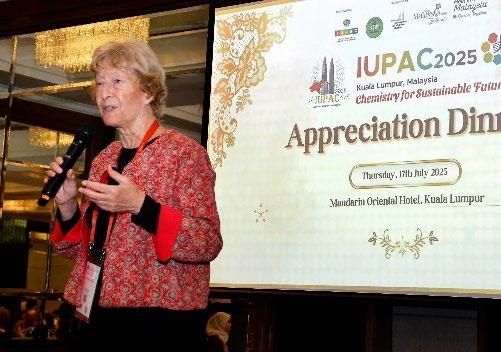
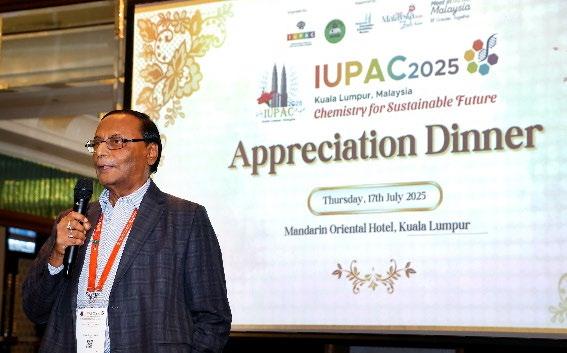
The dinner underscored the spirit of partnership and collaboration that defined IUPAC 2025 , while celebrating the collective effort behind its success. It was not only an evening of appreciation but also a reaffirmation of the strong ties within the global chemistry community, paving the way for future collaborations.

The Closing Ceremony of IUPAC 2025 was held on 19 July 2025, marking the conclusion of the 50 th World Chemistry Congress in Kuala Lumpur, Malaysia . The ceremony highlighted the achievements of the congress and celebrated the strong spirit of international collaboration in chemistry.
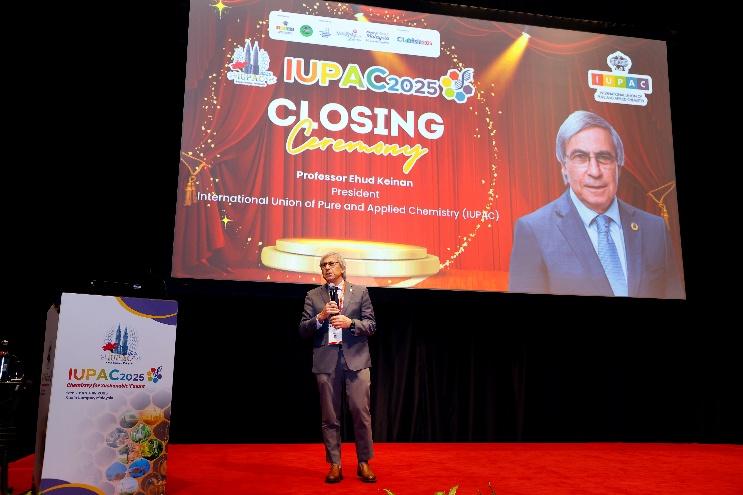
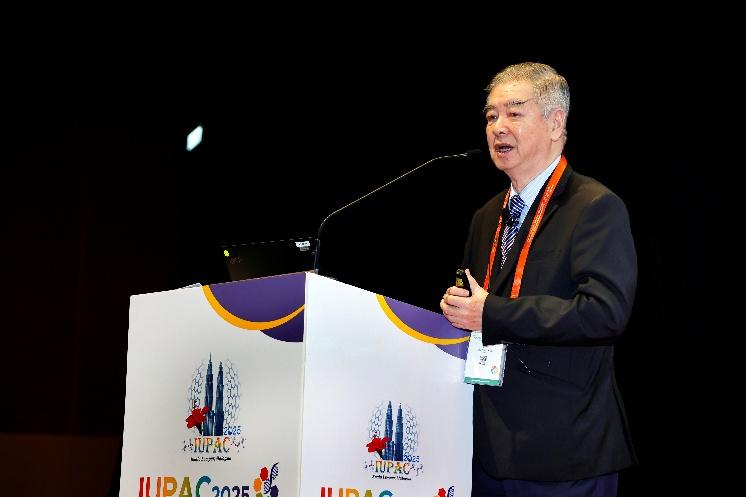
Prof Ehud Keinan delivered the closing address and officially announced Montréal, Canada as the host city for IUPAC 2027. Datuk Soon then delivered a heartfelt speech, expressing gratitude to the committees, speakers, sponsors, and delegates whose contributions ensured the success of IUPAC 2025.

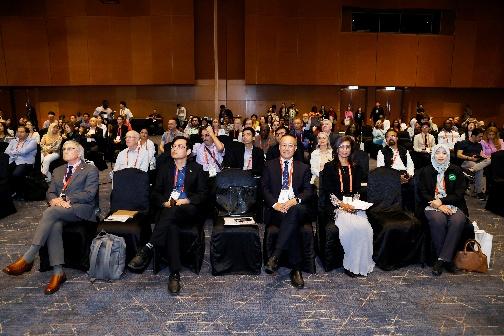
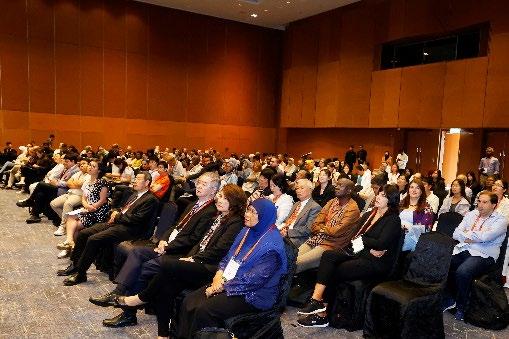
The event closed with warm applause and optimism for future congresses.
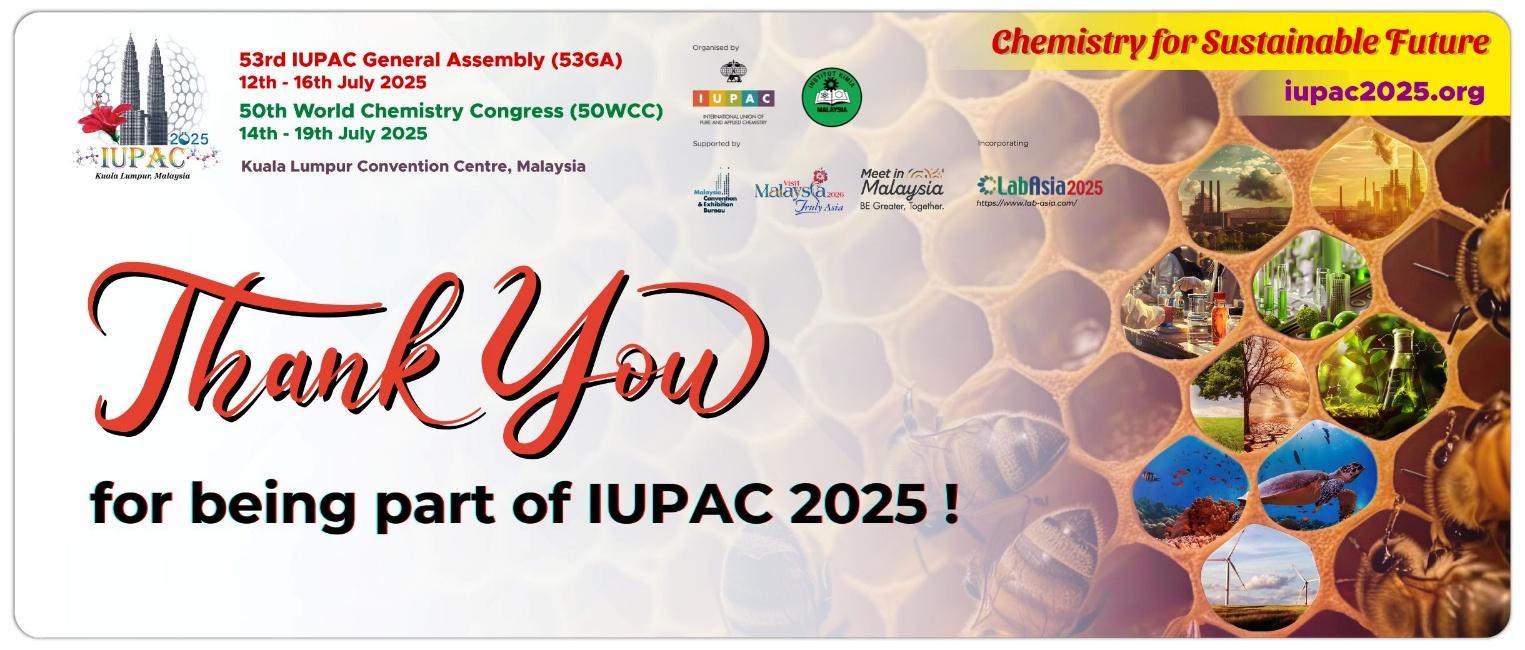

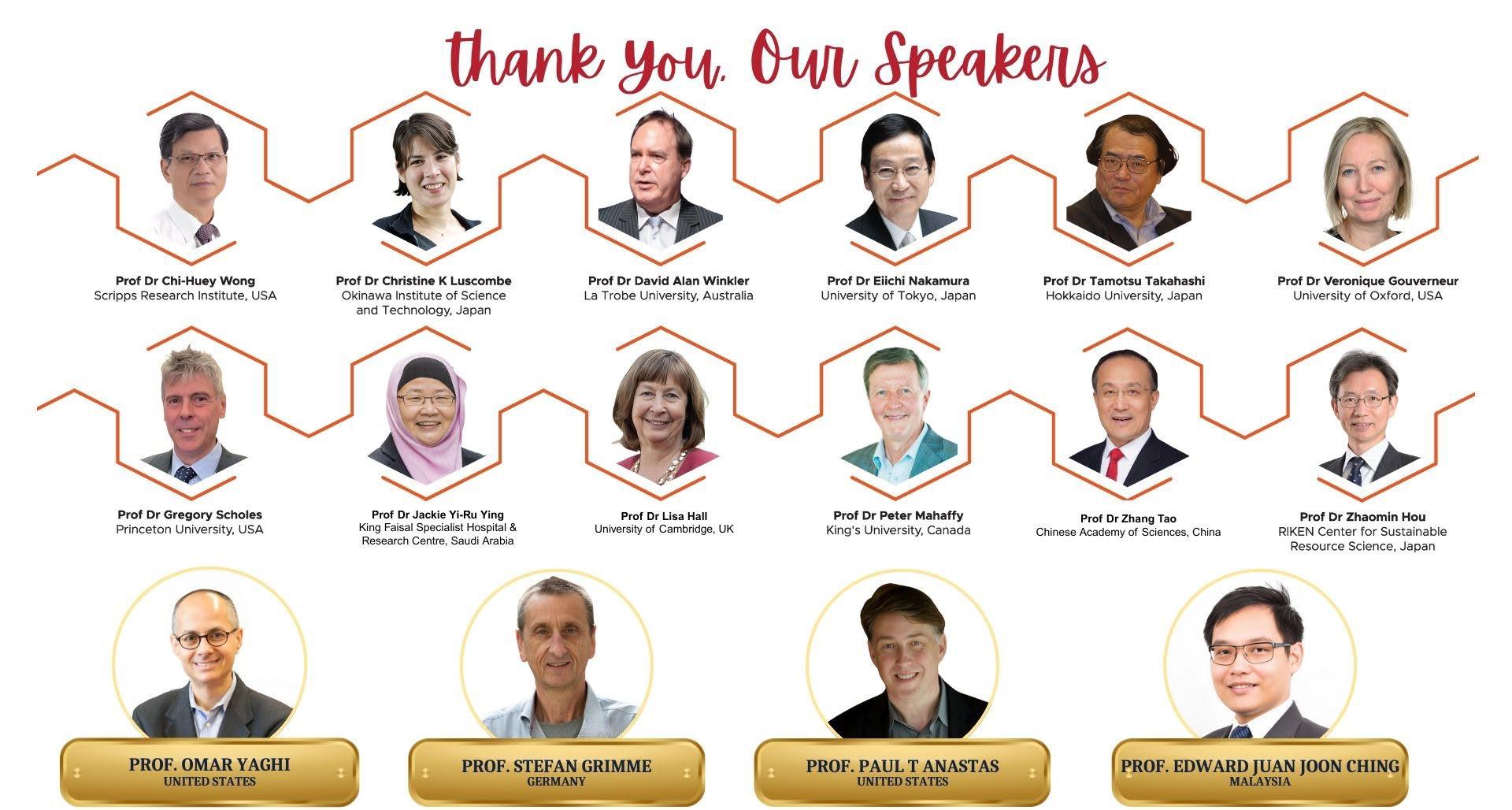
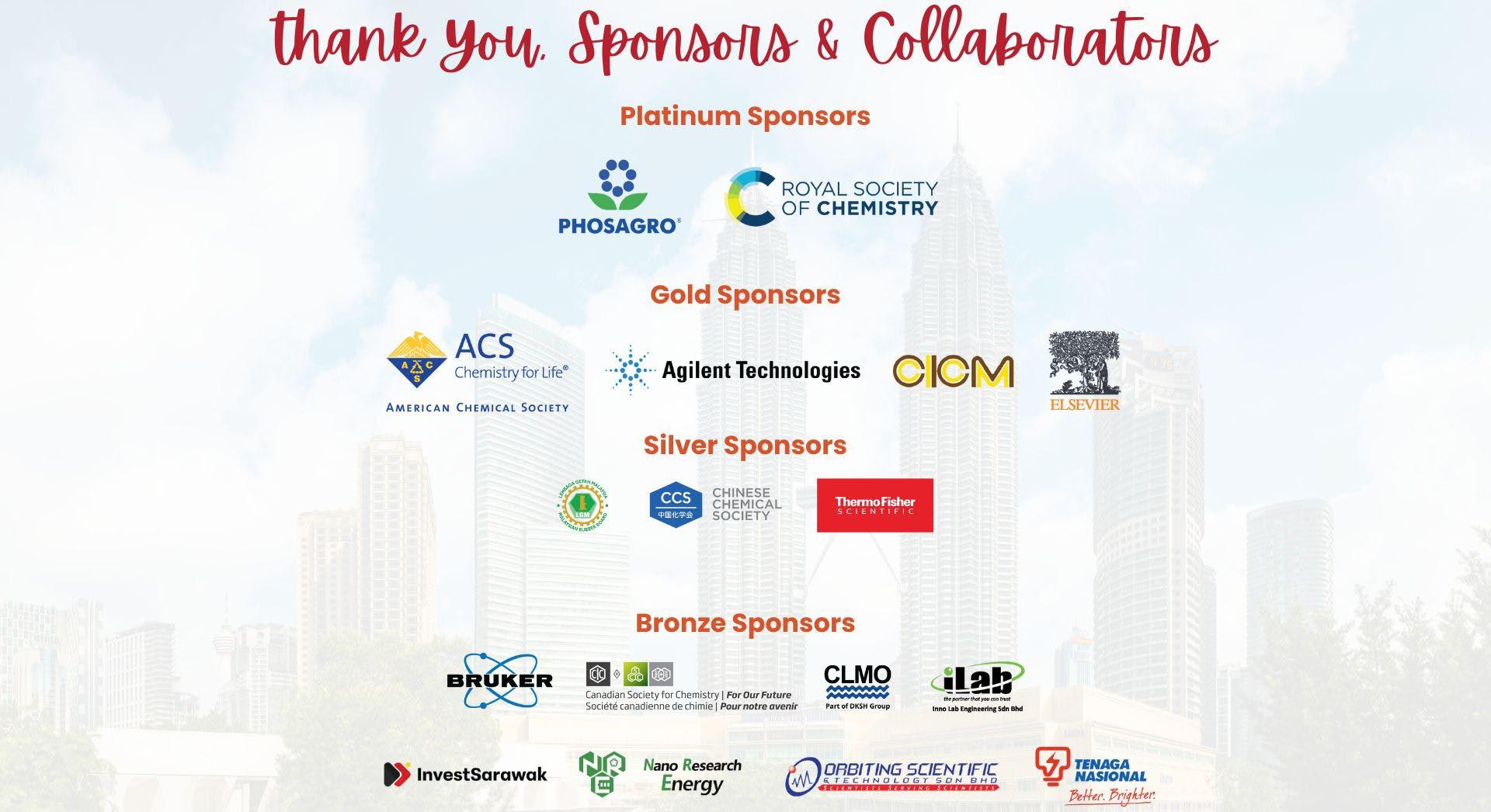


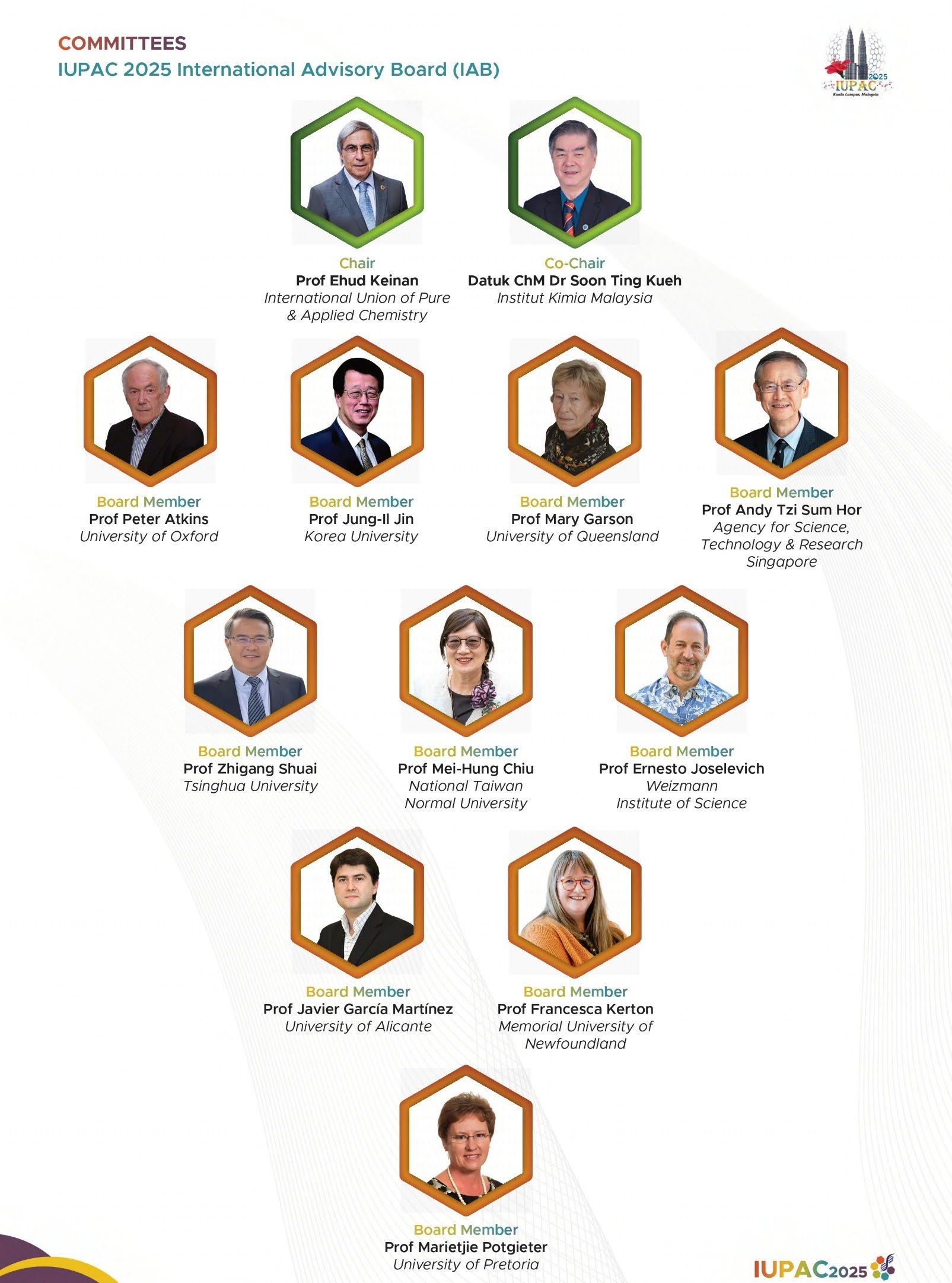



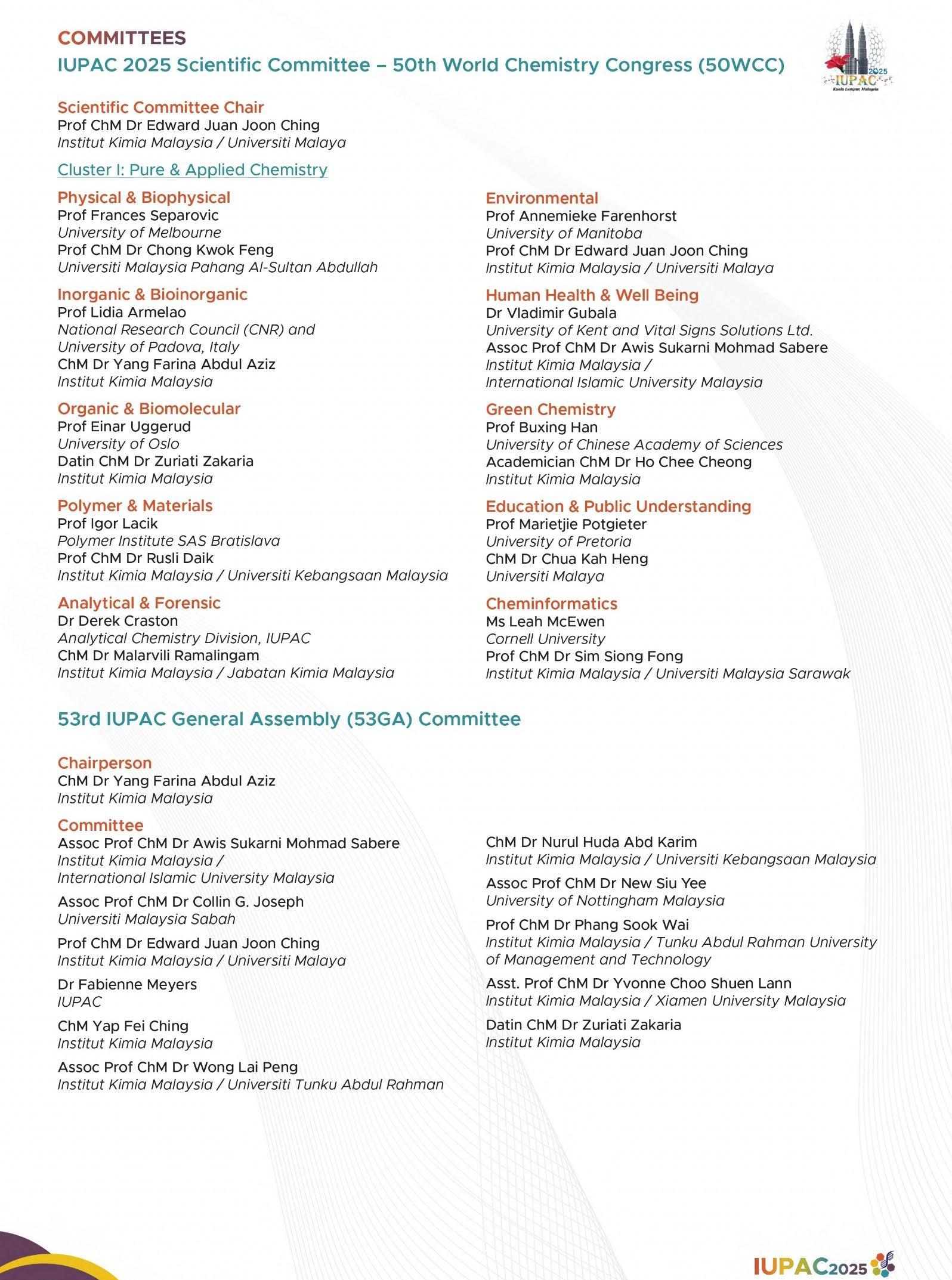

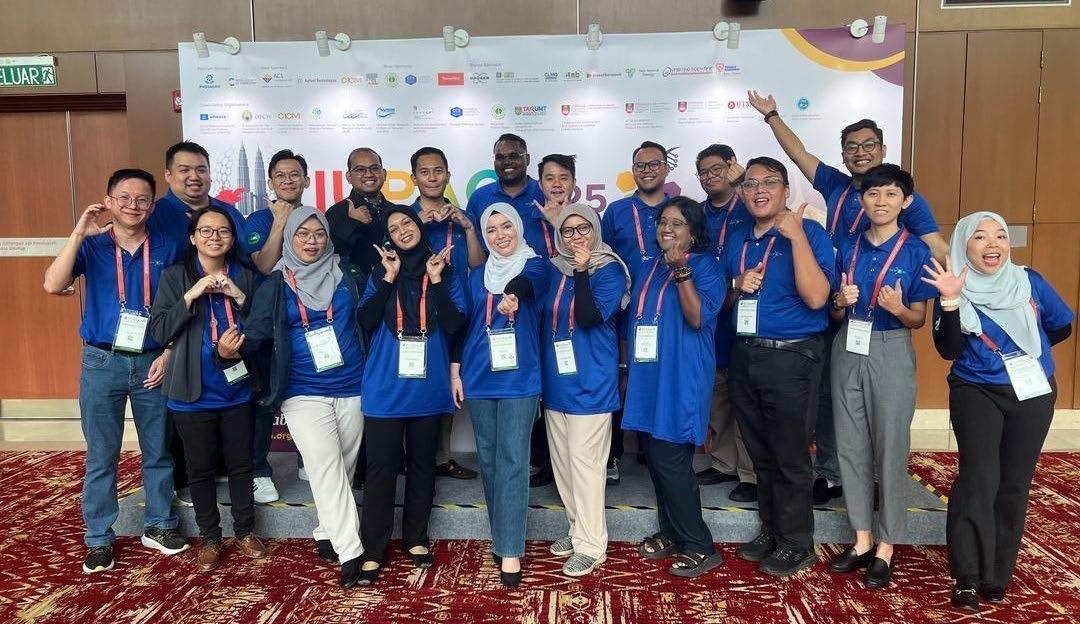
Team
Team Leader: Assoc Prof ChM Dr Fatimah Salim
ChM Chua Yao Jun (Jordan)
ChM Dr Khor Sook Mei
Ts ChM Dr Kumuthini Chandrasekaram
Dr Lee Kian Mun (Morris)
Assoc Prof ChM Dr Lim Teck Hock (Eric)
Prof ChM Dr Loh Kee Shyuan
Dr Low May Lee
ChM Dr Mazlin Mohideen
Assoc Prof ChM Dr Mohamad Nurul Azmi Mohamad Taib
ChM Dr Mohamad Shazeli Che Zain
ChM Dr Mohd Azlan Kassim
Dr Mohd Ridhwan bin Adam
ChM Dr Ng Jeck Fei
ChM Nur Azila Mhd Wahi
Dr Nurul Asikin Mijan
Assoc Prof ChM Dr Nurul Izzaty Hassan
ChM Dr Shahrul Nizam Ahmad
ChM Dr Sharon Fatinathan
Ms Teh Bee Ping
ChM Dr Thiruventhan A/L Karunakaran

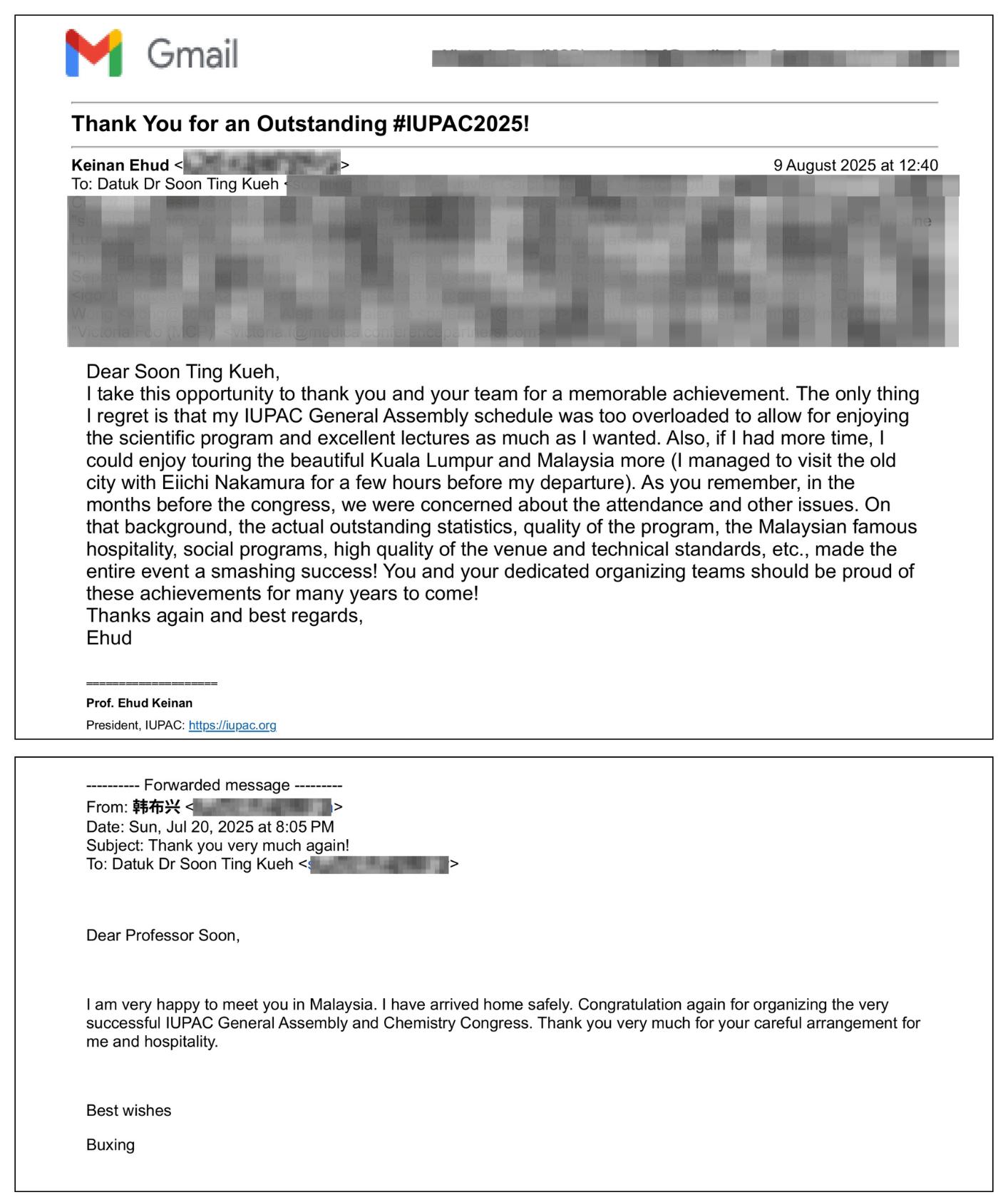

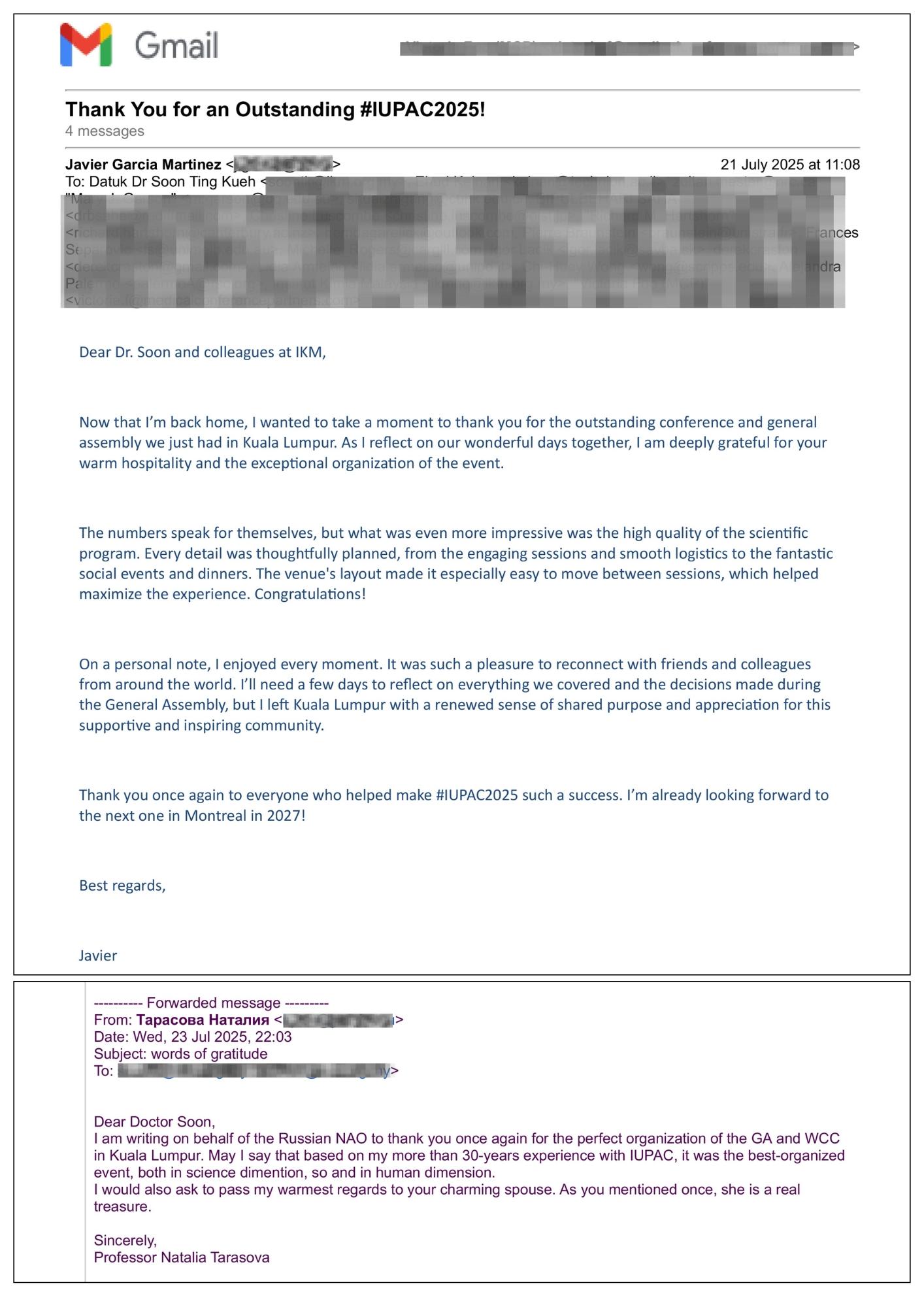

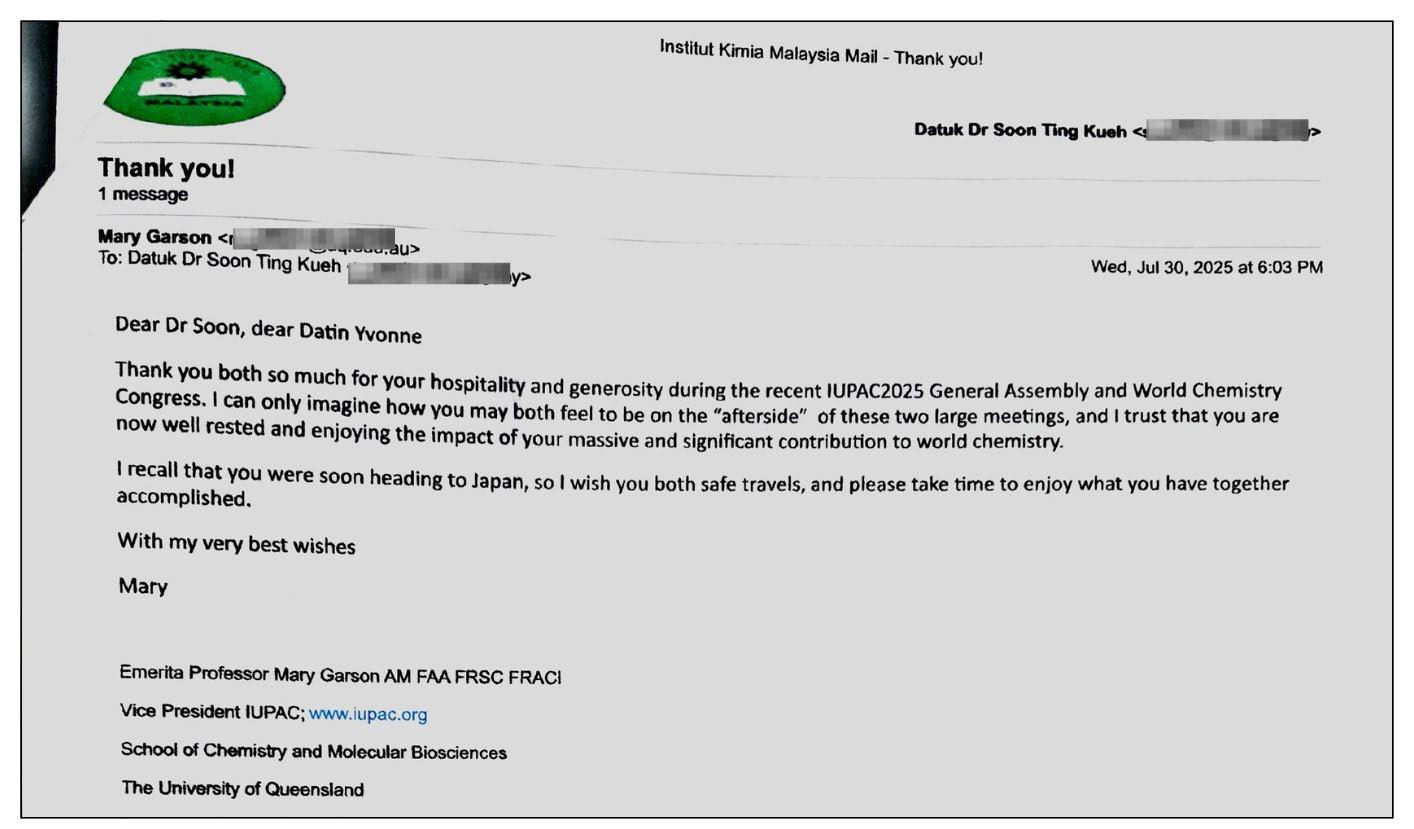

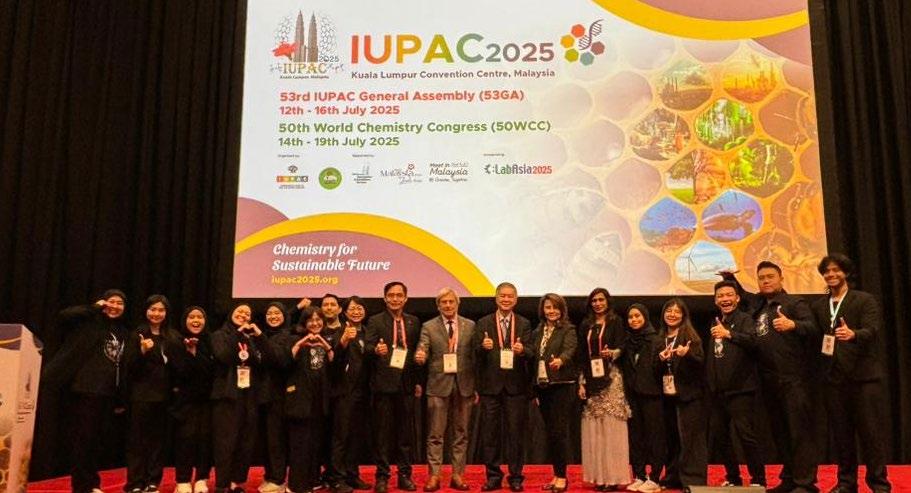
Report prepared by:
Victoria Foo, Project Lead IUPAC 2025
Dee Dee Quah, Co- lead IUPAC 2025
Core Team:
Isaac Quek Wern Han
Jarren Lee Tjun Hong
Angel Tan En Chi
Nurul Safariana Syafiqah Awang Basah
Nur Hazirah Aliman
Muhammad Azam Abdul Hamid
Nik Irfan Arif Nik Ahmad Azlee
Support Team:
Lim Pick Goh | Shimal Jaykant | Nik Azreena Nik Ahmad Azlee
Nur Adreena Sufia Hussin | Lee Zhee Xuan
Serene Chow Mei Theng | Gordon Loi Zongxin | Louis Choong
Catherine Yap Yuet Ma e | Liyana Syafiqah Raman | Nur Ezzah Ayunee Hamdan
Special Thanks to Our Team for their dedication, hard work, and unwavering support contributed significantly to the success of IUPAC 2025

Email: connect@medicalconferencepartners.com Website: https://www.medicalconferencepartners.com/ 18 August 2025